~ 2025 ELECTION GUIDE ~



Together Spokane backers pitch Expo ’74-scale refresh to reshape city’s future
By Emry Dinman and Elena Perry THE SPOKESMAN-REVIEW
Voters in Spokane this November will be faced with many decisions, but perhaps the biggest question will be whether they are willing to pay taxes to fund $440 million in sweeping projects at the city’s schools and parks.
There will be two separate items on the ballot, a parks levy and a school bond, but officials from both agencies have decided to wed the two in plans for how the money will be spent, dubbing the twin ballot measures “Together Spokane.”
The proposal will touch every school and park in the city in ways small and large. All told, advocates claim the funding package would have as radical an effect on Spokane as did Expo ’74 more than 50 years ago.
“The Spokane community back then dreamed big. We were the smallest
city to host Expo ever, and we still benefit from all of that work that happened a long time ago,” said Nikki Otero Lockwood, Spokane Public Schools board president. “So now it’s our turn. What do we want Spokane to look like in the future?” It is hard to summarize the hundreds of uses being proposed for this money.
For schools, it involves two rebuilt elementary schools, partnerships with nonprofits that could boost public access, new turf fields and lighting scattered around the district, a new trades high school and at least one project at each of the district’s 58 schools.
Park leaders promise three new parks in areas without much green space, three parks that will see major renovations, and systemwide investments in every park, including cleaner bathrooms and an enhanced security presence.
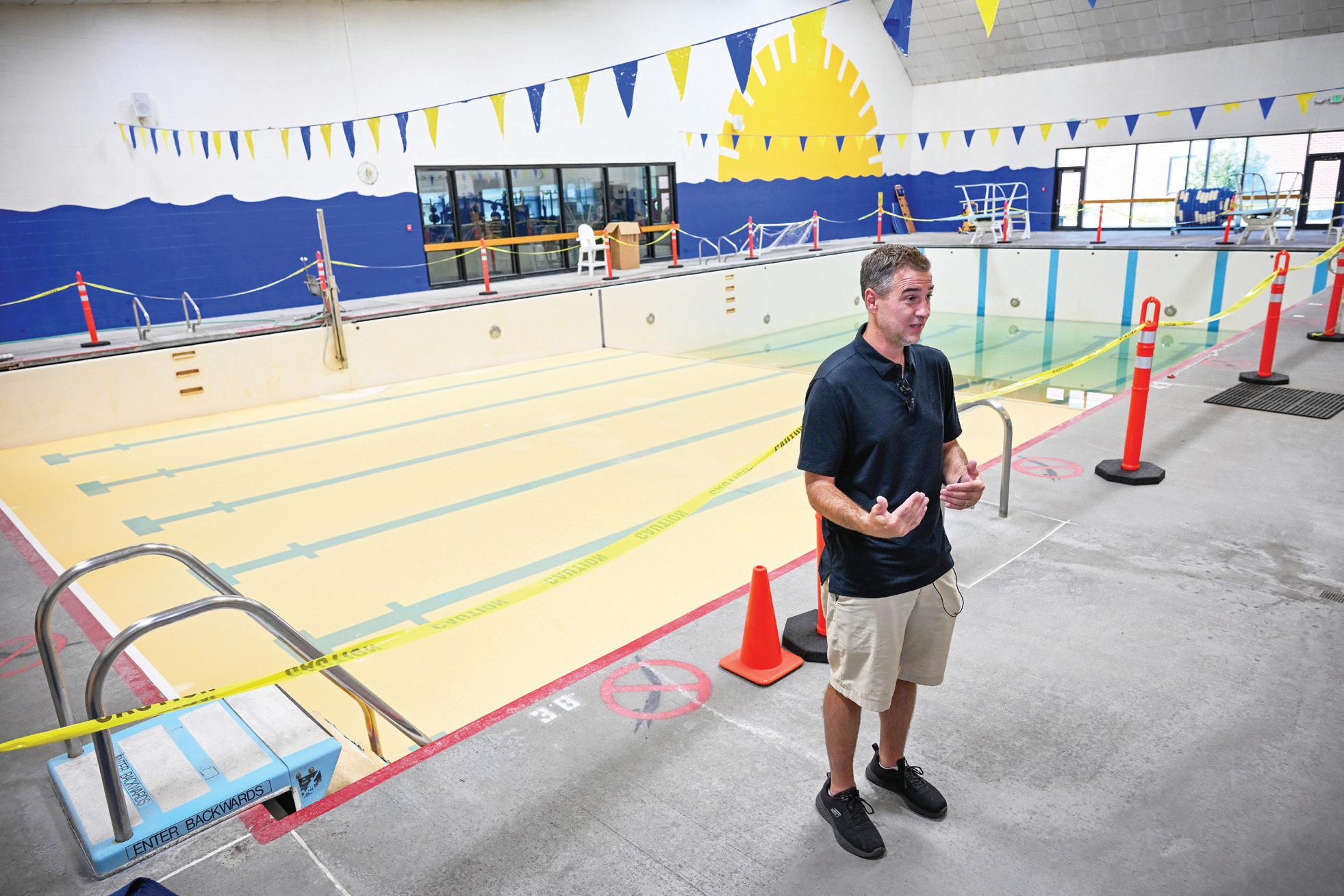
It’s decision time again. Inside this guide, voters will find The Spokesman-Review’s overviews of most of the races and ballot measures on the Nov. 4 Spokane County ballots.
There wasn’t quite room for everything, unfortunately, so our coverage of cemetery district, water district and some other races in Spokane County can be found at our Election Center at spokesman. com/election, where voters can quickly navigate the contest they want more information about. The Election Center
Continued from 1
levy would pay to maintain and operate it. The same is true of a remodeled indoor pool at Spokane Community College that could kick-start swim teams at each high school, which the school bond would pay to rehab and the parks levy would maintain.
Schools Superintendent Adam Swinyard said the package amounts to a massive investment in the lives of Spokane children and their families, whether inside or outside of schools, giving kids easy access to activities that don’t involve a screen. Parks Director Garrett Jones sees the Together Spokane proposal as a way to give every neighborhood park the same kind of attention as downtown’s Riverfront Park.
By linking arms, entities would be able to wring out more juice with less squeeze, officials said, able to accomplish the ambitious 200-plus projects for cheaper than if they went it alone.
It also comes with a price tag that for some is indicative of the ambitious, generational investments being proposed, but for others seems withering.
The squeeze
The parks levy would raise $240 million in property taxes over the next 20 years from city taxpayers. It would raise property taxes by 27 cents per $1,000 of assessed value, so the owner of a $400,000 home in Spokane would pay an additional $108 per year.
The school district is also asking voters living within the district to grant the agency authority to issue $200 million in bonds that would need to be paid off over 20 years.
However, Spokane Public Schools officials have repeatedly said it is misleading to highlight how much taxpayers will pay for these new bonds in a vacuum, instead insisting on only emphasizing how much more taxpayers will pay next year – a fairly nominal increase, as older taxes will be expiring.
Today, a homeowner inside the school district already pays about $1.34 per $1,000 of assessed property value on existing school bond debt from voter-approved bonds in 2009 and 2018 – $536 a year on a $400,000 home. If the new bond is approved by voters, the total bond payment for a homeowner would only go up to $1.36 per $1,000 in 2026, because other debt is being paid off at the same time.
Together Spokane proponents have heavily marketed their campaign around that 2-cent difference, a minor $8 annual tax increase for that $400,000 homeowner . According to district officials, the rate will fluctuate as bonds are paid off, with the average amount being relatively stable when averaged over the next 15 years.
The district recruited Russell Neff to write the “against” statement for the school bond in the city voters’ guide. As the father of a recent Spokane Public Schools graduate and former substitute in the district, he’s been a regular presence at school board meetings since the COVID-19 pandemic, when he spoke out against state mask mandates and advocated against school closures.
In an interview with The Spokesman-Review, Neff said he feels he’s being “taxed into submission,” with over 23% of his property tax bill going toward state school taxes and another 36% to local school taxes.
“Taxation is becoming death
includes all of our 2025 election coverage. Of course, our reporters are not done covering these contests, so stay tuned in print and online. And watch for our coverage on election night as we release results, including maps showing where candidates won the most support.
Ballots will be mailed starting Wednesday. They must be received by Nov. 4 if dropped in an official election dropbox, or it must be received with a postmark of Nov. 4 or before, if mailed. Spokane County election leaders are warning not to depend on the U.S. Postal
by a thousand cuts; it’s just one more,” he said.
“Psychologically, I think that’s why some people may not want to vote for the bond or this levy, is because it gives them some control over that tax burden,” Neff continued.
Former Spokane Mayor David Condon, a supporter of the Together Spokane package who has been deployed repeatedly in recent months by school and parks officials to stump for the proposed investments, expressed sympathy in February when asked about the perspective of financially stretched taxpayers. He argued, in many cases, the investments would lower the costs of families by offering amenities and attracting athletic tournaments that they might otherwise have to travel for.
“I have kids in youth sports, and it’s very expensive, even going to Yakima for a day and a half, spending a night in a hotel,” Condon said. “All of a sudden to be able to bring those regional tournaments here” could mean substantial savings for those families.
Others worry whether local governments can guarantee they’ll protect investments paid for with these tax requests.
Joanna Hyatt, a mother of five who homeschools four of her children, said she’s in a different park every week. She’s seen homeless people sleeping in parks, drug use in the open and vandalism that has closed park amenities. Until the city can make the parks feel safer, she’s not sure it’s worth the expense for facilities.
“It just is very frustrating to me to see so much go out in taxes, and yet it’s never enough, and the results don’t speak to that,” Hyatt said. “We don’t have a city and an educational system and a park system that are improving; even as we give more money, it continues to crumble.”
Though a major increase in parks security is a part of the Together Spokane funding proposal, increasing from four park rangers to as many as 12 with some limited authority to make arrests for misdemeanors, some are skeptical that it will be sufficient. Christopher Savage, a conservative running for Spokane City Council against incumbent Councilman Zack Zappone, plans to vote against both the levy and bond. He worries the legal authorities of park rangers are too limited.
“I don’t know how good it will be to start renovating these parks, make them all new, opening up the bathrooms, when they’re all just going to be destroyed in the future, because we don’t have the enforcement capability,” he argued.
Parks officials are keenly aware of these concerns, but believe increased maintenance staff will help the parks system quickly clean up issues and increased security will make a noticeable difference.
“The rangers will be very instrumental in this process,” said Carl Strong, assistant director for park operations, in April. “We’ll be sending them around to shut the bathrooms down at night, and they have the training and the authority to move people on and out of the bathrooms.”
For some in the community, trust in government is thin. Savage says he’s still hearing anger from voters who feel burned by the decision to locate the ONE Spokane Stadium downtown, flouting an overwhelming but nonbinding advisory vote in 2018 to build it on the site of the old Joe Albi Stadium. Swinyard addressed this
Service to postmark mail in time if mailed after Oct. 31. The Washington Secretary of State’s Office suggests not using the mail to vote in the last week to 10 days before the election. That means late voters should use official drop boxes, which are located at public libraries throughout Spokane County, the Spokane Transit Authority Plaza, CenterPlace Events Center in Spokane Valley, the Spokane County Elections office, the Spokane County Courthouse and the city or town halls of Latah, Millwood, Rockford, Spangle and Waverly.
yearslong controversy in a February interview, reiterating that new information came to light after that advisory vote was already underway that made a downtown location a better financial move due to offers to subsidize construction, operation and maintenance.
“Either road would have led to a fractured trust, because we had one side saying we did this advisory vote and you’ve broken our trust,” Swinyard said. “And there’s a whole other side of the community that says we trust our elected officials to make smart decisions with the best information available.”
Asked whether there was a version of the tax proposal he would support, Neff said yes, but with a much scaled-back scope and price tag. It is the size and scale and complexity of the Together Spokane proposal – which advocates argue demonstrates sweeping investments in the community – that make Neff skeptical. He proposed the district seek smaller tax proposals for the most urgent projects on their list.
“For example, Adams. I won’t disagree with anyone that needs to be replaced,” Neff said of the elementary school. “Ask for the money for that and stop.”
Savage feels similarly about the parks levy. This is echoed in the “against” statement drafted by Dennis Flynn, a health care IT worker and frequent critic of local government considering a run for Spokane City Council.
“Long-term levies like (the parks levy) are impossible to reverse, even when results fall short,” Flynn wrote. Flynn declined to be interviewed for this story.
For Hyatt, her vote hinges largely on student success. Once the school district improves test scores to show that the taxpayers’ investments in public schools are bearing fruit, she’d be more inclined to support future measures.
“If my children were not doing well, if I was not training them up well as a parent and I decided to focus on a home renovation, ignored that my children were not thriving, then I’m neglecting my primary responsibility,” she said.
In a February interview, Swinyard said standardized test scores are a poor indicator of student achievement. It’s hard to get a student to care about a test that does not affect them personally, he said, and that investing in the schools is an investment in a child’s education.
“A safe and healthy environment correlates to work productivity in the workplace, and it also does in a classroom,” Swinyard said. “We know that being active outside of the school day correlates with better academic performance, physical health, emotional health, social health.”
The juice Parks and schools officials said every one of the 58 schools in the district and 104 parks properties in the city would receive a piece of the pie from taxes generated under their respective proposals.
Schools’ slices vary from a complete replacement in a couple of cases to smaller projects like replacing flooring or upgrading intercoms, whatever the schools’ capital projects team deems necessary. It’s all according to the district’s longrange facilities plan, which relies on passing a bond every six years.
“The average age of those 58 buildings that we have is 40 years,” Swinyard said in a September town hall event. “We’re not a school district with a bunch of brand new buildings;
we’re a school district with a group of aging facilities So we have the steady-as-you-go approach.”
Similarly, some parks would see more attention than others, from a complete overhaul of Minnehaha and Harmon parks in northeast Spokane to replacements or repairs promised to every park restroom.
Schools
News of a potential new trades-focused high school spurred emphatic applause from the residents in attendance at a recent town hall event hosted at Rogers High School.
“We have more kids than ever that want to get directly into the trades,” Swinyard told an audience of around a dozen. “What we’re hearing from business and industry is, as the baby boomers are retiring, we have massive openings in the trades. It’s hard to find plumbers, it’s hard to find electricians, it’s hard to find welders, it’s hard to find carpenters.”
Kids would learn under high school teachers in the first two years, then pursue one of Spokane Community College’s existing two-year technical programs taught by educators at the college. In four years, students could graduate with their diploma and a technical certificate “debt-free and ready to enter the workforce,” Swinyard said.
The district plans to move the new school into a state-owned property on the Spokane Community College campus.
Also touching each high school district would be a new lighted turf field, specific locations to be determined if the proposals pass. After the school district’s initiative to get kids off their phones and into an activity has spurred more students to join sports and clubs, the district is running out of space for kids to play, Swinyard said.
“Kids want this,” he said. “They want to be active. They want and desire to be with each other off the screens, but we’ve got to provide the spaces for them to do that.”
In a bid to make their spaces more appealing to midsize conferences and locals looking to host events, the district would revamp the audio and sound systems in all five high school auditoriums. It’s part of the district’s efforts to reconceptualize schools as community centers, Swinyard said.
“It’s a lot of technical expertise to run the lights and sound,” he said. “Well, there’s upgrades that you can provide for a pretty modest cost that allows people to rent them, go to the panel and click music performance or town hall or debate or whatever the case may be, and the lights or the sound autoconfigure.”
Depending on who you ask, the highest priority in the parks levy is either bathrooms or park rangers. Often closed due to vandalism or frozen pipes or a collapsed sewer line, Jones said, parks would replace 40 of their 85 bathrooms over 20 years, while the others would get improvements and more could be added.
Jones said they’d be monitored by parks staff, like one of the eight new park rangers or 14 maintenance staffers that would be hired under the levy. In design, they’d consider “best practices,” to deter would-be vandals, like building restrooms near playgrounds or other busy spots in the parks.
“Between the infrastructure upgrades, the added mainte -
nance, and then also having that public safety patrol mechanism is really transforming what our public restrooms are,” Jones said.
Park rangers would be assigned to specific quadrants of the city to better establish themselves in the neighborhood, familiarizing themselves with local history, giving directions in the park and “discouraging negative activity from even getting started,” said Jennifer Ogden, Spokane Park Board president, at a recent town hall.
“They’re ambassadors for our parks and our city, as much as limited commission police officers,” Ogden said.
Partnered projects
If voters approve both the levy and the bond, there are a handful of projects the entities could fund jointly and work out a deal on how they’d share it. One notable example is a “mothballed” indoor pool owned by Spokane Community College, which would pass it off to schools and parks. Officials would determine how the public could use the pool in due time, but Swinyard said he plans for every second-grader in the district to get swimming lessons, plus the prospect of high school swim teams.
The Museum of Arts and Culture could expand exhibit space under the bond and levy as the city, schools and museum intend to share the cost and use of a storage facility away from the MAC. This way, the museum could convert existing storage space into rooms to show off some of the local artifacts that are in storage, Swinyard said.
A brief history at the ballot box
Recent history gives mixed messages on how voters might feel about the Together Spokane proposals.
Spokane parks hasn’t gone out to voters to raise taxes since 2014, with a $64 million bond to make major improvements to Riverfront Park basically for the first time since voters approved taxes to create the park after Expo ’74. Voters overwhelmingly signed on with over 68% of the vote.
When the school district’s February 2024 bond failed to garner 60% voter support, board members and administrators held lengthy discussions about when to run and how much they should seek in their next bond proposal, relying on decades-old plans to run a bond every six years as “care and feeding” of their extensive property holdings.
Eventually, leadership formed the Together Spokane plan now on ballots as a resuscitation of their last successful bond in 2018, which raised $485 million for projects including the ONE Spokane Stadium and six new middle schools. The school district didn’t accomplish this lofty package alone, either, again linking up with the city seeking a library bond.
The city handed off two plots of land for new middle schools in exchange for public library branches embedded inside schools, accessible by both the general public and schoolkids. That vision is now realized with a branch inside Shaw Middle School, among other partnered locations. Now parks and schools seek to similarly partner, if voters give them the thumbs up.
“Our goal was for all the projects to be collaborative, to work together, for our governments to work together,” Lockwood said. “And then we also want to position the city of Spokane as a city of choice.”
By Mitchell Roland THE SPOKESMAN-REVIEW
Washington voters bucked an attempt last year to let folks opt out of the state’s new program providing long-term care benefits to residents.
This year, they’ll weigh in again on the WA Cares program on the November ballot. This time, they’ll decide if the state should be able to invest payroll taxes raised for the program into the stock market like the state does for state pensions.
Supporters say the move would bulk up the program without having to raise additional taxes since the stock market generally rises faster than other investments.
Opponents note that voters rejected an earlier request and say investing money in stocks could be risky. Some also say they don’t want to boost a program they opposed in the first place.
Established by the Legislature in 2019, the longterm care program, also known as WA Cares, is funded through employee deductions from paychecks and provides a lifetime benefit of $36,500 per Washington resident. The amount residents will receive will rise with inflation.
Last year, 55% of Washington voters rejected an attempt to allow Washington workers to opt out of WA Cares, a move that could have dealt a significant financial blow to the program.
The money can be used for home modifications, home care aid, or other long-term needs that, while not medical care, can disrupt daily activities.
To fund it, the state has collected 58 cents per $100 of every paycheck since 2022. However, current law only allows the Washington State Investment Board to invest the funds collected in lower-return options, such as government bonds and savings certificates. A projection from 2020 suggested the collection rate and investments was insufficient to keep the program solvent for the next 75 years. But a report commissioned by the Washington Office of the State Actuary that was released in 2024 found the “fund ratio is estimated to exceed 100% for the next 75 years under most scenarios,” including with or without the change from voters.
If this potential financial shortfall sounds familiar, there’s a reason: This year’s ballot request is five years after Washington voters rejected a similar proposal.
During the 2020 election, 54.3% of voters opposed a measure that would have allowed longterm care funds to be invested in stocks. The measure only received majority support in three counties, Jefferson, King, and Whatcom, all of which are in Western Washington.
Voters will again be asked to amend the state constitution to allow the money in the fund to be invested in the stock of private companies through Senate Joint Resolution 8201.
Washington lawmakers signed off on the second try earlier this year, with both legislative chambers voting earlier this year to send a measure to amend the state’s constitution to the November ballot. The state Senate voted 42 to 7 in favor of the idea, while the state House voted 86 to 9, votes that sent the proposal to the voters, who will make the ultimate decision.
Ahead of the election, the proposal has drawn
a broad bipartisan coalition of support, including Senate Minority Leader John Braun, R-Centralia, and Gov. Bob Ferguson. Writing in support of the proposal in the state voter’s guide, a collection of supporters, including Ferguson and Braun, call the idea a “commonsense measure” that could grow the fund by an estimated $67 billion over the next 50 years, which they say is “money that can be used to increase benefits for people with disabilities and seniors without costing taxpayers a penny.”
“Higher earnings mean more money for care –good for seniors, disabled Washingtonians, their families, and taxpayers!” supporters wrote in arguments that appear in the state’s voter guide.
The measure is also endorsed by the Washington State Nurses Association, the Washington State Council of Fire Fighters and the National MS Society, among other groups.
Greg Markley, secretary-treasurer of the Washington State Council of Fire Fighters, said during a news conference that the initiative “seems like a no -brainer.”
“Measure 8201 would enable the WA State Investment Board to grow our long-term care fund the same way we grow funds for fire fighters, teachers, and more than dozen other state funds,” Markley said.
Markley also chairs the Washington State Investment Board, though he said he was “not speaking for the board.”
But while the idea is backed by the top Republican in the state Senate and the Democratic Governor, it also has bipartisan opposition that argues the proposal amounts to “financial roulette.”
“Washingtonians are not yet eligible to access program benefits but proponents are again asking you to remove a key Constitutional protection,” four state lawmakers, including state Sens. Mark Schoesler, R-Ritzville; Bob Hasegawa, D-Seattle; and state Rep. Joe Schmick, R-Colfax, wrote in opposition in the voter’s guide.
Voters, the lawmakers noted, “already rejected this proposal to take taxpayer money and invest in private stocks and corporations.”
“Our state founders protected public funds from risky investments by establishing safeguards in our state Constitution prohibiting corporate stock market investments of your tax dollars,” the legislators wrote.
In an interview, Schoesler said the measure would be “putting lipstick on a pig.”
“All this will do is perhaps postpone the inevitable rate increases. Because to be honest with you, a $36,000 policy doesn’t take you very far in long-term care,” Schoesler said. “I just think, why are we trying to dress up this ugly plan that’s not going to work?”
Schoesler added that he voted against creating the program and supported an unsuccessful statewide initiative last year that would have allowed residents to opt out of WA Cares. Schoesler said he continues to support making the program voluntary and allowing residents the option to choose private long-term care programs.
“I see no reason to try and bail this plan out when I think it’s doomed for failure,” Schoesler said.
Mitchell Roland can be reached at mitchellr@ spokesman.com.
District includes much of downtown
By Amanda Sullender THE SPOKESMAN-REVIEW
The race between Spokane city councilman Jonathan Bingle and community organizer Sarah Dixit provides a sharp contrast for voters in northeast Spokane.
Bingle is a staunch conservative running for his second term as a bulwark against Spokane’s progressive council majority. Dixit is a young woman of color and abortion rights organizer running as an unabashed progressive.
According to Bingle, Dixit is a “radical” doubling down on failed public safety and housing policies. According to Dixit, Bingle is a “distant and inaccessible” politician more concerned with ideology than serving his diverse district.
District 1 covers the northeastern third of the city – east of Division and north of Trent – but stretches west of Division to include almost all of downtown. The district is the last bastion of conservative politics in Spokane’s current council. Bingle and fellow District 1 representative Michael Cathcart are the only two conservatives on the seven-member body.
Bingle is running for re-election for the first time after winning his first four-year term in 2021. Last year, he unsuccessfully ran for Spokane’s congressional seat.
“There is not another office that I’m looking at right now. I have every intention of serving my time,” he said. “I’m not interested in the state position. I am very much here, wanting to serve my people, my city.”
Though the incumbent in the race, Bingle said Spokanites should vote for him if they do not like the policies of the current city council and Mayor Lisa Brown.
“If you love the direction that the city is going, then you’re going to like my opponent, because she’s supported by the council five, and she’s supported by the mayor,” Bingle said. “But if you think that the city needs to head in a different direction and address things differently, then I’m your guy.”
Dixit’s central pitch is that as a 29-year-old organizer, she will bring in disenfranchised young people who do not currently engage with local government.
“My big goal if I were to be elected would be the accessibility of local government,” she said. “So many people don’t know or don’t have access to what’s happening at the city. So that means increasing language access, increasing website accessibility, having town halls or doing events centered in community spaces instead of making people come to city council.”
She is also a progressive with ties to city hall’s liberal majority. Councilman Paul Dillon is her former boss at Planned Parenthood, and has been a “mentor” to Dixit and encouraged her to run. Other council members have endorsed and donated to her campaign. Despite this, Dixit promises not to be a “cookie-cutter” reflection of who is in power and has some criticisms for her allies, including how city leaders have addressed protests against stricter federal immigration enforcement.
Being in the minority on the council, Bingle has
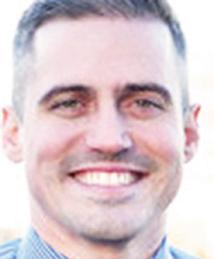

few large accomplishments to tout in his first term. Some ordinances he did help pass include the removal of height restrictions in downtown development, banning people from city parks at night and a pilot program incentivizing urban tree planting.
Should he be re-elected, Bingle hopes to increase the size and funding of the Spokane police force and invest in long-term mental health facilities to address homelessness.
If she wins, Dixit wants increased access to public transit and rent stabilization measures to slow the growth of leasing costs.
Housing and homelessness
Since the city’s replacement to voter-approved restrictions on camping, the city’s 2023 Proposition 1, was passed earlier this year, Bingle has taken to calling the substitute “Prop None.”
“None of what we want. None of what we asked for,” he said, calling the new camping ordinance a “miserable failure.”
Voters overwhelmingly approved the original camping ban by a roughly 50-point margin. The proposition made it illegal to camp within 1,000 feet of schools, parks or playgrounds in the city. Later struck down by the state supreme court, the city council approved a replacement ordinance that bans campers but lacks the enforcement mechanism of its predecessor.
According to Bingle, the city cannot earnestly address homelessness in Spokane until it reinstates the original Prop 1 word for word. Barring that, the city should return the issue back to the voters, who he believes will back the original ban overwhelmingly.
“For me, I’m not interested in compromise until we take it out to the public and ask them,” he said.
Dixit does not support the 2023 camping ban, which she called harmful messaging about those who are homeless and counterproductive to helping people get off the street. She says the city’s focus needs to be on getting as many homeless people into stable housing as possible.
“When we delay housing due to substance use or mental health issues, we’re not addressing the problem. You need to be housed to be able to pursue a job or work on substance abuse disorders,” she said.
Bingle opposes this “housing first” model and believes the council’s focus on housing has been to the detriment of treatment access. Housing First centers on getting people into housing as a form of health care that’s necessary to then treat their addictions or other issues.
“Where Housing First has failed is for the folks who have the most acute needs, those typically on the streets the longest. Because there’s a serious human brokenness issue,” he said.
Some people need treatment before they can be successfully housed, and sometimes that requires involuntary treatment, Bingle said.
“You gotta have the car-
MEET THE CANDIDATES
Spokane City Council District 1 (Northeast Spokane)
Jonathan Bingle
Age: 38
Education: Graduated from Rogers High School in 2005.
Political experience: Ran for Spokane mayor in 2019; lost in the primary. Won his city council seat in 2021.
Work experience: Bingle, who owns Bingle Enterprises, got into the events businesses while an employee at Applebee’s. Finding success, he branched out and started his own company a decade ago. With his wife, Bingle operates Bent Trivia and Bent Events in Spokane. He pivoted during the COVID-19 to work as a contractor.
Family: Married to Christina Bingle and has one son.
Campaign finance: Raised more than $86,200 as of Oct. 7, according to the state Public Disclosure Commission. Contributors include the Washington Association of Realtors, the Rental Association of Washington, Avista Corp. and the Spokane Fire Fighters Union Political Action Committee.
Sarah Dixit
Age: 29
Education: Graduated from Maranatha High School in California in 2014. Graduated Whitworth University in 2018, studying sociology.
Work experience: Works as organizing director for Pro-Choice Washington, worked as public affairs manager of Planned Parenthood of Greater Washington and North Idaho from 2018 to 2023.
Political experience: First run for office.
Family: Married to Adam Swensen. Has no children. Campaign finance: Raised more than $74,200 as of Oct. 7, according to the PDC. Contributors include the Washington Machinists Council, Spokane City Council President Betsy Wilkerson, Naral Pro-Choice Washington, Washington State Democratic Central Committee and Spokane Mayor Lisa Brown.
rot and the stick. Engagement and enforcement. Pathways and penalties. Right now, it’s all pathways,” he said. “It’s all engagement, but there’s no enforcement.”
Dixit believes forcing people into treatment will cause relapse and ultimately not help those experiencing addiction.
Bingle called Dixit a “radical” for her positions on homelessness, especially for her support of safe injection or smoking sites. These are areas where drug users can use illicit substances in a controlled environment with close access to medical care. Though safe injection sites can be found in several countries around the world, they are exceedingly rare in the United States. The first government-authorized supervised injection site began operation in New York City in 2021.
“The data in places that have these programs show there is more success in reducing overdoses so that people aren’t dying on the street,” Dixit said. “It means having health care providers present who can get people into treatment.”
Bingle said such sites would encourage drug use and exacerbate addiction in Spokane. He opposes needle exchanges for the same reason.
Dixit supports stipends or vouchers to help people afford housing and rent stabilization, which limits by how much and how often landlords can increase rent.
“Rent stabilization helps the power dynamic between tenants and landlords. Tenants need to have time to know if they need to move somewhere else because the rent increased with no warning,” she said.
Bingle said these policies have been tried elsewhere and caused decreased housing supply and higher rents over the long term. Dixit said the policy “doesn’t discourage housing” but creates better communication.
Dixit also supports an eviction moratorium during winter months, which she said will lower demand on shelter beds essential to survival of
the unhoused during cold months. Bingle would “not ever” support an eviction moratorium because it prevents “bad tenants” from being removed.
ICE
In June, local activists staged a protest at Spokane’s Immigration and Customs Enforcement facility over the detention of two legal asylum seekers after a routine immigration check-in. Hundreds of protesters surrounded the ICE facility June 11. That evening, Mayor Brown instituted a curfew and sent local police to break up the protesters. More than 30 were arrested that night, and nine individuals were later federally charged for allegedly obstructing federal officers.
Dixit was among the approximately 1,000 protesters at the ICE building and stayed there until after police dispersed the crowd. According to her, Brown’s use of local police and a curfew was “unnecessary.”
“I was disappointed by the response. When I think of deescalation, I don’t picture hundreds of officers in riot gear and SWAT trucks,” she said. “It didn’t get violent until law enforcement started pushing people, throwing them to the ground.”
Dixit wished Brown and council members would attend protests like these so they understand what is going on and have the most appropriate response.
Bingle agrees with Brown’s decision to use police but believes they should have broken up the protest earlier in the day.
“The city responded too slowly. You have every right to protest; you do not have a right to obstruct justice. And that’s what was happening there in that moment,” Bingle said. The city has passed several measures attempting to curb federal agents’ ability to target those in Spokane. Bingle said the city should not be blocking federal law enforcement at all and that passing of these ordinances gives community members false assurances they will be followed. Dixit supports these efforts.
Homelessness strategy defines City Council contest
By Emry Dinman THE SPOKESMAN-REVIEW
Of the three elections for the Spokane City Council this year, the race to represent the southern district is the only one where both candidates are from the same party and have the most significant policy overlap.
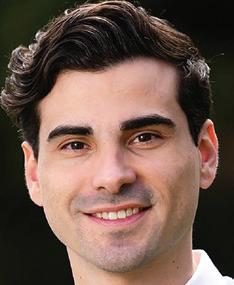

The race has also, at least in part, become a debate between the two candidates about what kind of Democrat the other is. Former attorney Kate Telis, closely aligned with the city’s progressive wing, has questioned SCAFCO executive Alejandro Barrientos’ Democratic bona fides and allegiance to his conservative donors; Barrientos, meanwhile, accuses Telis of being overly partisan and unwilling or unable to represent constituents on the right and in the center.
The two are competing for a seat vacated by former Councilwoman Lili Navarrete in District 2, which includes much of the city south of the Spokane River except for the downtown core. Navarrete resigned in July citing health concerns; CHAS Health Director Shelby Lambdin was appointed later that month to fill the seat until the election. The district is also represented by Councilman Paul Dillon, who was elected in 2023.
Both Barrientos and Telis advocate for increasing resources for nonemergency personnel who can engage with the homeless and intervene in public addiction and mental health cases. They are encouraged by the city’s multifamily housing development reforms –though Barrientos cautions that some, like removing requirements for builders to include parking spaces, will have unintended consequences – but both want policies to make it easier to build single-family housing. Both believe progress
has been slow on addressing infrastructure in Latah Valley, despite two nearly back-to-back moratoriums on new construction in that area, arguing the city needs to produce clear timetables for improving roadways and firefighting facilities. Telis argues another moratorium may be appropriate, arguing Spokane needs to weigh the potential for lawsuits from developers against the city’s liability if a natural disaster strikes the area. Barrientos is more tentative, saying he could be persuaded to support a third moratorium if the city could guarantee significant progress, but he argues development and the fees the city collects may be needed to fund that infrastructure.
Both state downtown Spokane and some other neighborhoods continue to face public safety challenges amid lingering on-street homelessness.
It is in the candidates’ proposals on this last front where many of the starkest disagreements exist.
A centerpiece of Barrientos’ campaign has been to reinstate a 2023 voter-approved initiative that outlawed the homeless from camping within 1,000 feet of city parks, schools and child care centers, a law that effectively criminalized camping in most of the city.
In April, the state Supreme Court struck down the law on technical grounds, ruling it had overstepped the authority of local citizen initiatives, but left the door open for reintroduction by the city council. The council’s conservative minority attempted to do so, but its progressive majority instead adopted a policy promoted by Mayor Lisa Brown to outlaw camping citywide with a strong emphasis on outreach over criminal enforcement.
Barrientos has argued the new law lacks a clear enforcement plan and argued for reinstating the voter-approved law verbatim.
“I think the (replacement) ordinance does have some good policies … but you have to understand that we’re telling people we know better and are going to do this versus what you voted for,” Barrientos
said. “Whether we knew it was going to work or not, we have to adapt to what people want and communicate what works and what doesn’t to help people make something better.”
Barrientos supports a proposal by the Spokane Business Association – founded by his employer Larry Stone, who has contributed to more conservative City Council candidates with an emphasis on shifting the city’s homelessness policies. The plan would shift city funding from affordable housing to emergency shelters and treatment facilities.
Telis does not support reinstating the version adopted by voters two years ago, arguing it “lacked clarity and enforceability” and did too little to connect people with services.
As the Trump administration emphasizes the role of involuntary detention and treatment for responding to chronic homelessness, addiction and mental illness both candidates described this tactic as a “last resort”
but discussed the approach slightly differently. Telis urged caution that the government doesn’t infringe on civil rights, arguing an expansion of involuntary treatment without a commensurate increase in treatment services “risks cycling people through institutions instead of helping them heal”; Barrientos wants to expand other services, but argues involuntary treatment or jail would be appropriate “when someone refuses all support and continues to pose a risk …”
Both candidates maintain that enforcement and outreach are necessary, though Barrientos gives more weight to the impacts of homelessness and drug use on the wider public and is more emphatic about the use of law enforcement than Telis. When asked why he was motivated to run for office, he recalls his young child finding a used piece of foil on the Big Red Wagon and the fear he felt as a parent. Telis argues longterm improvements are
MEET THE CANDIDATES
Spokane City Council,
Zack Zappone
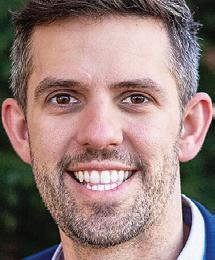
Age: 34
Education: Graduated from North Central High School in 2009. Earned bachelor’s degree in American studies from Georgetown University. Earned teaching certificate from the University of Washington in 2014. Earned master’s degree in public affairs from Princeton University in 2019. Work experience: Social studies teacher at North Central High School, 2021 to present. Worked as a Kennewick Public School middle school teacher, 2013-16. Was a Fulbright English teaching fellow at Columbia University, 2016-17. Worked as substitute teacher in Spokane Public Schools, 2019-21. Political experience: Elected to Spokane City Council in 2021. Serves on the boards of the Spokane Transit Authority, Association of Washington Cities and Visit Spokane. Previously served on the board of the Spokane Regional Transportation board. Family: Partner Tyler Colean. Two children. Campaign finance: Reported raising nearly $67,200 as of Oct. 6, according to the state Public Disclosure Commission. Donors include the Washington Education Association Political Action Committee, the Spokane Firefighters Union PAC, Avista, Spokane City Council President Betsy Wilkerson, Spokane Mayor Lisa Brown, Spokane City Councilwoman Kitty Klitzke, former Spokane City Council members Jon Snyder and Ryan Oelrich, former Spokane County Democratic Party Chairman Tom Keefe and former state Sen. Majority Leader Andy Billig.
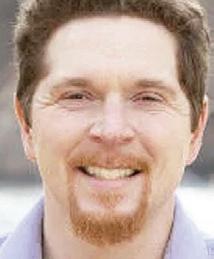
Christopher Savage Age: 34
Education: Graduated from North Central High School in 2009. Completed some coursework at Western Washington University. Work experience: Works as DeVries courier, 2024-present. Worked as warehouse manager at a Project Beauty Share facility, 2021-24. Previously worked as pizza delivery driver, security guard and as Lyft driver. Political experience: Lost bids for Spokane City Council in 2019, 2021, 2023. Serves as Balboa/South Indian Trail Community Assembly representative, 2018-present. Vice chair of Spokane Salary Review Commission, 2018-21; board member for Meals on Wheels, 2020-present; secretary commissioner for Spokane Water Conservancy Commission, 2021-23; commissioner on the Spokane County Water Conservancy Commission, 2019-23.
Family: Single. No children.
Campaign finance: Reported raising nearly $86,000 as of Oct. 6, according to the PDC. Donors include former City Council members Bob Apple and Steve Corker, former NBA player John Stockton and his wife, Nada Stockton, Mark and Pam Walker of Walker’s Furniture, the Washington Multi Family Housing Association, the Rental Housing Association of Washington, major property owner Alvin Wolff Jr., the Spokane Home Builders Association PAC, the Washington Association of Realtors PAC and developer Larry Stone.
Age: 36
Alejandro Barrientos
Education: Earned bachelor’s in business
from Gonzaga University in 2013. Earned associate degree from North Idaho College.
Work experience: Works as the chief operations officer for SCAFCO Steel Stud Manufacturing Company, a 70-year Spokane family-owned business, since 2021, and purchasing director, Stone Group of Companies. Previously worked as the product manager for CWallA, a distributor steel framing in Spokane and chief procurement office for Rocky Mountain Construction.
Political experience: First run for office.
Family: Divorced. Has two children.
Campaign contributions: Raised more than $67,400 as of Oct. 1, according to the state Public Disclosure Commission. Contributors include: the Associated Builders and Contractors Political Action Committee; Greenstone Corp.; Kirishian Imported Rugs Inc.; attorney Marshall Casey; hoteliers Gerald and Patty Dicker; and Anne Cowles, Washington Policy Center board member and wife of Spokesman-Review Publisher Stacey Cowles.
Kate Telis
Age: 42
Education: Graduated from Hellgate High School in Missoula, Montana in 2001. Graduated with bachelor’s from Colby College in Maine in 2005. Graduated with a law degree from George Mason University Law School in 2012. Passed the Virginia Bar Exam in 2012 and the New Mexico Bar Exam in 2014.
Work experience: Worked for Sen. Max Baucus in Washington, D.C., from 2007 to 2009. Served as a judicial law clerk for Judge Jan Brodie of the Fairfax Circuit Court from 2012 to 2013. Worked as an Assistant District Attorney, prosecuting domestic violence felonies in New Mexico from 2014 to 2015. Served as development director for Cuidando Los Niños, a nonprofit supporting homeless families with children under the younger than the age of 5, from 2016 to 2017. Established the Law Office of Kate Telis and consulted with private law firms in New Mexico on cases involving sex trafficking and excessive use of force by law enforcement from 2017 to 2019. Moved to Spokane in 2019 and volunteered with the League of Women Voters, and Hutton Elementary. Founded a support group for parents with children diagnosed with ADHD in 2023 and is the current chapter lead of Spokane’s Moms Demand Action.
Political experience: Top three finalist for a recent vacancy for an appointment to the Spokane School Board in 2024. Volunteer coordinator for Maggie Yate’s campaign for county commissioner in 2022 and Paul Dillon’s campaign for City Council in 2023. Communications director for Molly Marshall’s campaign for county commissioner in 2024. Family: Married to Alex Telis. They have two children, ages 4 and 9.
Campaign finance: Raised more than $93,100 as of Oct. 1, according to the PDC. Contributors include: New Mexico attorney Kelly Sanches; the Spokane Fire Fighters Union; Brian McClatchey, husband of Mayor Lisa Brown and former city council legal adviser; City Council President Betsy Wilkerson; former Democratic congressional candidate Don Barbieri; and the Washington Education Association.
most dependent on “trying to make the offers for service and help as desirable and appealing as possible, and that’s often not going to come from being offered services by a police officer.”
Two shades of blue
As two Democrats vying for election in the city’s bluest district, the pair have accused each other of being the wrong kind of Democrat for the city council.
Barrientos has struggled to attract the endorsements of local Democrats; the Spokane County Democratic Party has endorsed Telis, for instance.
Telis has pointed to Barrientos’ donors, many of whom are supporting Republicans running for office in the city’s other two council districts this year, including Barrientos’ employer,
Zappone, Savage trade barbs over housing, safety, LGBTQ issues nears
By Emry Dinman THE SPOKESMAN-REVIEW
The race to represent Northwest Spokane on the City Council pits a progressive incumbent against a conservative challenger who served alongside each other in high school student government, and it has seen some of the most personal attacks of the local election season.
Councilman and high school teacher Zack Zappone is running for a second term against delivery driver Christopher Savage, having won the August primary with 51.3% of the vote compared to Savage’s 28.8%. Both served together on the student body government at North Central High School, but what camaraderie they once shared appears to have eroded on the campaign trail. The candidates have focused their campaigns on addressing public safety, affordability and homelessness, but have presented different approaches. Savage has accused Zappone, the council’s first openly gay member, of deepening the city’s financial woes with wasteful projects, particularly those in support of the LGBTQ community like the vandalized downtown rainbow intersection mural; Zappone has accused Savage of throwing away their friendship on homophobic dog whistles and supporting a National Guard takeover of Spokane streets.
Zappone is one of two
council members representing Council District 3, which covers the northwestern third of the city. The seat was fiercely competitive when Zappone first
Challenger alleges municipal court incumbent lacks empathy, fairness
By Emry Dinman THE SPOKESMAN-REVIEW
A challenger seeking to unseat a Spokane Municipal Court judge believes the incumbent lacks professionalism and empathy for the people who pass through her court, accusations the incumbent argues are misguided.
Municipal judges handle cases based on city laws, which include misdemeanor criminal cases and traffic infractions, among other duties.
Gloria Ochoa-Bruck has served on the municipal court bench since 2021, after she defeated the incumbent Matthew Antush in an election. She previously served briefly as senior director of inclusion and diversity for the Kalispel Tribal Economic Authority and as a judge for the Kalispel Tribal Court, and before that worked for six years as the director of local government and multicultural affairs for the city of Spokane under then-Mayor David Condon.
Defense attorney Sarah Freedman, who previously briefly worked as a prosecutor under former County Prosecutor Larry Haskell “before I learned better,” points to personal experiences and broader discontent from others in the legal system as motivation for running against OchoaBruck.
She noted a speech Ochoa-Bruck had given at a Washington Leadership Institute presentation, claiming the judge had said she struggled to empathize with a defendant Ochoa-Bruck had represented. Empathy should come naturally to a judge, Freedman argued, and was not something with which Freedman struggled.
Ochoa-Bruck said she did
not recall making any statement along those lines and said it was “hurtful” to be accused of lacking empathy.
Freedman pointed to a personal incident as another example of the courtroom behavior that spurred her to run for the seat.
She was asked to come on to a case in Ochoa-Bruck’s court as co-counsel to assist with striking potential jurors ahead of a trial. The judge removed the jurors from the courtroom for a part of the striking process, which Freedman said she had never seen in her time as an attorney. Ochoa-Bruck said judges can choose to remove the jury, but she consistently removed them during her time on the bench.
Freedman requested the jury be brought back in, saying she had ADHD and would struggle to attach faces to jury numbers. In an interview, Freedman said she felt dismissed by OchoaBruck.
Without prompting, Freedman pulled out her phone during an interview with The Spokesman -Review and flashed her prescription schedule to prove she has been diagnosed with ADHD. She’s used to being questioned about this, she said, because Ochoa-Bruck has told people that Freedman was self-diagnosed and angry about not receiving accommodations. In an initial interview with The Spokesman-Review, Ochoa-Buck said exactly this.
“I have a transcript where it clearly says ‘undiagnosed ADHD,’ ” Ochoa-Bruck said. “As we know, you have to first have a diagnosis, and then you ask for an accommodation. And this was a situation that is being blown out of proportion, where on
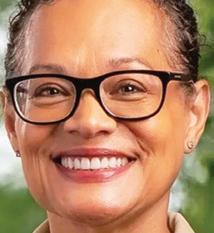

the record, they stated they were undiagnosed.”
The transcript from this hearing does indicate Freedman said this. The transcript, however, is incorrect, due to what appears to be a scrivener’s error.
A recording shows Freedman disclosed her diagnosis and offered to share her providers with Ochoa-Bruck; the judge then turned to Freedman’s co-counsel and asked if he also had a diagnosis of ADHD, preventing him from moving forward with jury striking if Freedman was incapable. The co-counsel said he did not have a diagnosis, though he insisted the accommodation was necessary because Freedman had been brought on to be in charge of jury striking.
Freedman said OchoaBruck should know better, due to a later hearing in which Freedman said she pointed to the reluctance to accommodate her disability as evidence the judge could not fairly preside over Freedman’s clients. She believes Ochoa-Bruck has been knowingly misrepresenting her opponent in an attempt to cast her in a bad light.
Pointing to the scrivener’s error in a follow-up interview, Ochoa-Bruck insisted Freedman had not gone through the proper steps to request an accommodation.
Ochoa-Bruck added accessibility in courtrooms is important to her broadly, noting English is her second language and she serves on the state Supreme Court’s Disability Justice Task Force.
But Freedman argued the refusal to accommodate her disability, potentially im-
Gloria Ochoa-Bruck
Age: 52
Education: Earned associate degree from Columbia Basin Community College in 1995, bachelor’s in business administration from Washington State University in 1997, law degree from the University of Idaho in 2000, master’s in criminal justice and criminology from WSU in 2019 and master’s in business administration from WSU in 2021.
Political experience: Elected to the Spokane Municipal Court in 2021. Served on the Washington State Commission on Hispanic Affairs from 2012 to 2017. Served on the Washington State Joint Legislative Task Force on Policing Standards from 2016 to 2017. Served on the Washington state Office of the Superintendent of Public Instruction Student Discipline Task Force from 2014-2016. Has served on the Washington State Supreme Court Disability Justice Task Force since 2024. Elected Spokane Municipal Court Judge in 2021.
Work history: Director of Local Government and Multicultural Affairs for the city of Spokane, 2013-2019. Senior Director of Inclusion and Diversity for the Kalispel Tribal Economic Authority, January-June 2021. Kalispel Tribal Court Judge, June-November 2021.
Family: Married to Nicholas Bruck and four children.
Campaign finance: Raised more than $33,400 as of Oct. 3, according to the Washington Public Disclosure Commission, including $7,300 in loans from herself. Contributors include: Spokane School Board President Nikki Otero Lockwood, hotelier Gerald Dicker, former Spokane interim Police Chief Justin Lundgren and Spokane Superior Court Judge Tony Hazel.
Sarah Freedman
Age: 35
Education: Earned bachelor’s in criminology from Portland State University in 2013 and law degree from Seattle University in 2016.
Political experience: First run for office.
Work history: Deputy prosecuting attorney for the Klickitat County, 2016-17. Deputy prosecuting attorney for the Spokane County Prosecuting Attorney’s Office, 2017-18. Owner of the Freedman Law Office since 2018.
Family: Single, no children.
Campaign finance: Raised more than $12,600 as of Oct. 3, according to the PDC, including almost $6,400 in loans mostly from herself. Contributors include attorney Julie Twyford, attorney Lindsey Gray, Spokane County Public Defender Matthew Antush and former Democratic legislative candidate Michaela Kelso.
pacting her client’s ability to be adequately represented, is part of a broader pattern of the incumbent refusing to learn or adopt courtroom norms. She is not the first to cast the accusation. Starting in
October 2023, the Spokane public defender’s office began filing hundreds of motions to remove cases initially assigned to Ochoa-Bruck, at first without publicly providing any reason.
Both at the time and in
By Emry Dinman THE SPOKESMAN-REVIEW
A typically sleepy Spokane Municipal Court judge election has become a heated microcosm for the debate that has consumed city politics for years: What should be done about downtown homelessness, and does the system provide enough “accountability” for those who commit low-level crimes?
Judge Mary Logan, who oversees the city’s community court, is facing her first re-election challenger since she was appointed as a municipal court judge in 2009: former Spokane City Attorney Lynden Smithson, who continues to serve in the city’s prosecutor’s office.
Community court has a narrow focus: nonviolent “quality of life” crimes that occur downtown, like graffiti, public urination and trespass. Many crimes the court oversees are directly linked to homelessness, like sitting or lying down on sidewalks in the downtown retail zone.
Logan is not just the face of the court; she spearheaded its creation in 2013, hoping to address the same individuals who cycled in and out of jail with a high likelihood of reoffending.
“It was from those feelings of ‘can we do something better to uphold public safety for the community and serve the individuals that come into the court system?’ ” Logan said.
The court’s officers stress the importance of respect for defendants and recognition for progress; Logan teared up as she described handing people rocks painted with the words “Courage” or “Strength” or “Faith” to describe those who successfully complete the court’s programs.
“(One man) just stopped
dead in his tracks, and he said, no one has ever recognized that in me,” she said.
But Smithson and the downtown business owners who encouraged him to run argue the court is failing at its mission, lacks accountability, and does not subject itself to the kind of transparency necessary to evaluate its progress.
“I think we need new ideas,” Smithson said. “I think we need to have a little bit more accountability, and I think we also owe it to the community to have accountability on the court for the public. … I still have no idea what the recidivism rate is in community court, I don’t know how many people have been lifted out of addiction and into housing. They won’t provide that information.”
Smithson argues the court needs “compassionate accountability” for the people who pass through it.
“I think (community court) is a great model,” Smithson said. “I just think the way it has been applied leaves room for improvement.”
He also does not believe the court is open enough with data, arguing for regular presentations of the court’s caseload, recidivism and other statistics.
Logan, meanwhile, argues the court already meets those goals. There is accountability for the initial charge through community service, but also regular check-ins at the downtown library and an expectation to keep engaging with service providers.
She recalls a woman brought into court for sleeping on the streets, visibly under the influence, and whom Logan ordered into drug treatment. The woman initially refused, had her case kicked up to standard mu-
nicipal court, but eventually returned on another charge and this time successfully treated her addiction.
“Accountability is saying, ‘Yes, I was on the streets of Spokane, I have a drug problem, and I’m going to face it every single week because I either have to talk to Judge Logan about it or I have to talk to the prosecutor and defense about it,’ ” Logan said. “‘And if I’m not in compliance, then the next level might be inpatient treatment.’”
Smithson, however, does not believe the consequences have historically been sufficient to convince someone to comply.
“She says people will do jail time, but when I look at those files it’s someone that did five days of jail time at the end because they had a warrant,” Smithson said. “That’s like spanking your puppy for peeing on the carpet last week … if you can get the puppy and say you’re not supposed to pee on the carpet and they do, maybe not jail, but we’re sending them out to work … maybe that changes their behavior.”
Many of Smithson’s supporters are frustrated by conditions downtown, pointing to data indicating chronic offenders remain on the streets. Last summer, the Spokane Police Department launched a program of emphasis patrols downtown that contacted 73 homeless people with more than 2,000 prior arrests between them.
Logan acknowledges a number of chronic offenders live downtown but doesn’t agree the blame lies with community court. She notes around 30 of the people brought into her court after that emphasis program had their cases dismissed by prosecutors because the cases were not adequately
built, and points to others who are not competent to stand trial but don’t have the same pretrial stabilization resources.
Smithson argues the court does not provide enough data for the public to adequately assess whether it’s succeeding.
Logan and other court officials presented data about the court to the Spokane City Council in June. Smithson said he was unaware of this presentation but argued it was likely spurred by the election; Logan said her court used to provide quarterly updates but did not during the term of former Mayor Nadine Woodward because “that wasn’t welcomed.”
It’s not clear, however, whether Woodward would have had any say in the court’s participation.
A 2019 study by Washington State University showed a marked decline in recidivism for those who participated in community court versus similar cases prior to the court’s existence or that went through another court.
If elected, Smithson said, he would more regularly provide data to the public. He also wants the court to have dedicated peer navigators to follow people through complying with the court’s orders, though he would have to find the funding to do so.
Logan’s endorsements are extensive: over a hundred judges, including Kristin O’Sullivan, presiding judge of Spokane Municipal Court, 11 of the 13 sitting Spokane County Superior Court judges, and state Supreme Court Justices Debra Stephans and Mary Yu. She is also endorsed by Spokane Mayor Lisa Brown, state Sen. Marcus Riccelli and other area politicians.
a recent interview, OchoaBruck argued the motions were personal attacks meant to undermine her. She was a relative outsider to the Spokane legal landscape when she won her election, unseating an incumbent who had not only come up through the public defender’s office, but was the brother of Public Defender Nicholas Antush.
“I’m the first outsider, and I did run against an appointee that came from the public defender’s office,” Ochoa-Bruck said in an interview. “And I came in, and I had practiced in 14 different jurisdictions, and I do things differently. And this was a weaponization of the affidavit process. ... It was a political weaponization of that process.”
The public defender’s office did not respond to multiple requests for comment or clarification for this story.
Kayelee Alexander worked as a clerk assigned to Ochoa-Bruck’s court until she quit in 2023, and told The Spokesman-Review the judge lacked empathy for defendants, regularly made technical mistakes that caused people to stay in jail longer than they should have, and argued she was uninterested in learning from those mistakes.
Ochoa-Bruck acknowledged some errors. For instance, she had more than once made clerical changes to finalized orders already signed by all parties and sent them to the clerk’s office –but not to the attorneys involved in the case.
Ochoa-Bruck said at the time she was unaware the clerk’s office wasn’t passing those corrected orders along and said she would ensure they were in the future.
On another occasion, Ochoa-Bruck accepted a plea agreement but failed to enter it or accurately gener-
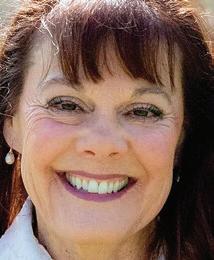
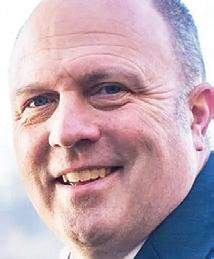
MEET THE CANDIDATES Spokane Municipal Court Judge No. 2
Lynden Smithson
Age: 53
Education: Graduated from Bellarmine Prep School in Tacoma in 1990. Graduated from the University of Washington in 1995 and Gonzaga School of Law in 1998. Political experience: Ran unsuccessfully for Spokane County District Court in 2018.
Work experience: Worked in various legal roles for the city of Spokane since 2002, including for the city prosecutor’s office, city legal and as city attorney under former Mayor Nadine Woodward. Prior experience includes criminal defense and civil litigation positions.
Family: Married to Alisha Smithson and has three children and two grandchildren.
Campaign finance: Raised more than $48,400 as of Oct. 7, according to the state Public Disclosure Commissioner. Contributors include retired NBA star John Stockton; Fritz Wolff of the Wolff Co., attorney Brandon Casey; Associated Builders and Carpenters of Washington Political Action Committee and developer Larry Stone. Mary Logan
Age: 65
Education: Earned political science degree from University of Montana in 1983. Earned law degree from Monterey College of Law in 1988.
Work experience: Practiced medical malpractice and tort claim law, 1988-93. Worked for Atchison, Anderson, Hurley and Barisone representing 13 Californian cities from 1993-96. Practiced civil defense for Waverly and Latah, 1996-97. Worked in city of Spokane’s public defender’s office, 1997-2008. Sworn in as municipal court judge in 2009. Won election to keep the seat later that year and every four years since.
Political experience: Served as municipal court judge from 2008 to present.
Family: Married to William David Sharon Jr. Has adult son and adult stepson.
Campaign finance: Raised more than $35,400, including $7,500 in loans as of Oct. 7, according to the PDC. Contributors include retired Spokane County Superior Court Judge Kalama Clark Ellen; former Democratic legislative candidate and emergency room doctor Pamela Kohlmeier, Superior Court Judge Tony Hazel and Spokane County District Court Judge Patrick Johnson. Logan Smithson See JUDGE 3, 20
Smithson lists endorsements from a handful of local attorneys, two sitting judges, one from Kittitas County and another from Mason County, as well as former Spokane Mayor Na-
dine Woodward, former Spokane police Chief Craig Meidl and various business owners and politically active residents who frequently criticize Spokane’s progressives.
Candidates have competing ideas on library system, growth
By Emily White THE SPOKESMAN-REVIEW
Two women are facing off for a chance to be on the Liberty Lake City Council: Arlene Fisher, who has worked in city government for decades, and Judie Schumacher, a retired Wells Fargo and Fortune 500 financial services employee.
Mike Kennedy, who holds the council seat Fisher and Schumacher are vying for, opted against running for re-election.
Fisher said she joined the race because Kennedy asked her to run in his place.
“I think the reason Mike reached out is that I have 25 years of municipal experience managing cities,” Fisher said.
The two are both political newcomers, although Fisher was involved in Liberty Lake’s incorporation back in 2001 and has been involved in several city governments since then, including working as a city manager for Mountlake Terrace and city administrator in Cheney.
Schumacher is endorsed by current City Councilwoman Linda Ball, former City Council members D.G. Garcia, Tom Sahlberg and Rick Klingler, who is a current candidate for position 4 on the city council. Fisher is endorsed by incumbent Kennedy, former Liberty Lake Mayor Steven Peter-
son and former Councilwoman Judy Owens.
The status of the library is the biggest issue facing the city council, Fisher said. The current library in Liberty Lake is too small for the city, and because of that, the library cannot have the types of programs people want there, Fisher said. The council is striving to have a new library, but two library bonds have failed in the past two decades, Fisher said.
In November, Liberty Lake residents will have the opportunity to vote on whether a new library should be built. The vote is not binding and doesn’t suggest how the library will be paid for. The city estimates the cost will be $13 million to $15.6 million. Officials are considering putting the library on a 4-acre parcel at Town Square Park that hosts the Liberty Lake Farmers Market.
Fisher said she is excited to see what results the advisory vote will bring.
Schumacher is disappointed with the council’s decision to run an advisory vote for the November ballot.
“It’s only going to confuse and frustrate voters. The council should have spent the time to present an actual decision to the city,” Schumacher said.
The advisory vote only leaves room for questions, she said.
MEET THE CANDIDATES
Liberty Lake City Council, Position 6
Arlene Fisher
Age: 63
Education: Earned bachelor’s degree and master’s degree in public administration from Eastern Washington University.
Work experience: Retired. Previously worked as a city manager for Mountlake Terrace and city administrator in Cheney.
Political experience: This is Arlene’s first time running.
Family: Married to Richard Maurer. Has four kids and seven grandchildren. Campaign fundraising: Has raised $10,491.84 since Sept. 30 and has spent $4,369.26, according to the Washington Public Disclosure Commission. She’s contributed $4,205.60 to her campaign.
Judie Schumacher
Age: 56.
Education: Bachelor’s degree in electronics engineering technology at DeVry University.
Work experience: Retired. Was a bankrupsy trustee and worked at Wells Fargo in project management and process improvement.
Political experience: This is Judie’s first time running.
Family: Married to Craig Fobes and has three children. Campaign fundraising: Has raised $0 and spent $0, according to the Washington Public Disclosure Commission.
“What is the right option for the city? What does the community want? What are the funding possibilities?” Schumacher said.
These are all things the council should have discussed before going to voters, Schumacher said. If elected, Fisher said she will be focused on keeping the small-town community feel that has brought so many people to Liberty Lake. She said she is running her campaign on truth, trust and transparency.
Supporters: Growth makes larger community space essential
By Troy Slack FOR
THE SPOKESMAN-REVIEW
Liberty Lake residents will have a chance to offer their city council some advice on the November ballot on the future of its library.
The City Council decided to ask residents if they should build a new library. But the vote is not binding and does not offer a source for paying for a new library.
Supporters of a new library say a new community space is needed to accommodate a larger and still growing population.
“The library as it currently is configured, and the current space there, in which is about 9,000 square feet, is actually built for a population of about 9,000,” said Liberty Lake Mayor Cris Kaminskas. “We are currently at a population of 14,000 and expected to grow to 22,000 over the next 15, 20 years.”
The current library functions as a meeting place for the community, but more space is needed given the expanding population, she said.
“There is much needed community space. We don’t have any hotels here in Liberty Lake that have a room that holds space for large meetings,” Kaminskas said.
City Councilwoman Linda Ball said building a new library would also allow the city police department to expand into the library space.
“People want a new library, because libraries are not just a place to go get a book anymore,” Ball said. “The police department does need to expand to fit our population projected to be around 22,000 as well, so that would allow them to move into the library spaces that’s currently there in the same building.”
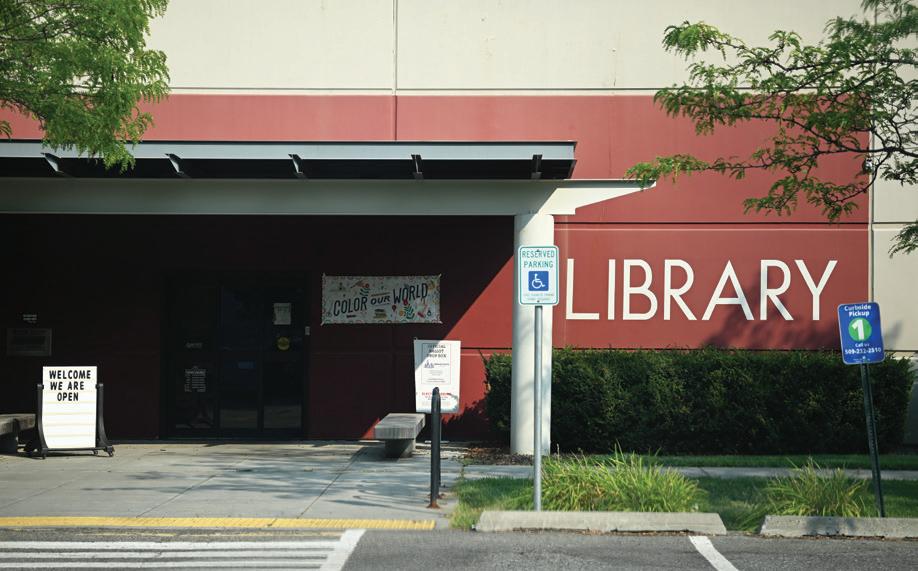
Although the vote would not increase taxes, opponents of the proposal say it would be the first step to doing so.
“Proposition 1 asks us to approve a new city library with a staggering price tag of $12-15 million as part of a larger project with an estimated cost of $28.7 million,” said a statement against the proposal in the Spokane County Elections Guide attributed to Steve Anderson, Nathan Wehrman and Jared Von Tobel. “This is more than we spend on preventing property theft, keeping our kids safe and road maintenance combined. We understand the difference between what’s necessary and what’s merely desirable.”
The opponents also said funding a library isn’t an essential need for the city.
“Focus on core responsibilities, eliminate debt, and save responsibly before pursuing luxury projects,” the three opponents wrote in their statement.
Supporters stress the proposal is only to determine the public’s desire on a new library. Even if they want one, at least some members of the City Council hope building it can be done without raising taxes.
“The council does have authority to raise property tax up to a certain amount,” Kaminskas said. “In my mind, that’s not good practice. If your property taxes are ever affected, you need to go back to the voters.”
Instead, Kaminskas wants to fund as much of the project as possible
through grants and funding from local businesses.
“There are so many grants out there, Bank of America, the Gates Foundation, Amazon, huge companies always have grants for things like this that are available,” Kaminskas said. “But unfortunately, until we know what the project is, we can’t apply for them. So the plan is to have a group, a grassroot group of citizens, trying to get out the correct information about the project.”
Current public reaction to the proposal has been mixed, Kaminskas said.
“It’s a crap shoot right now,” the mayor said.
“If you look at an online community page, which is a private page, which is, you know, not an official way that the city takes input, overwhelmingly, people seem to be saying no. But you know when in other circles, when I talk to specific candidates who are out canvassing right now for the November election, this is a big topic that they talked to people about, and the feedback I’m getting is that people are overwhelmingly in favor of it.”
Ball points out more information will be on the November 2026 ballot, where voters will make a more informed decision.
“It will be on the ballot this November of 2025, but that’s all it is,” Ball said. “It’ll go on a ballot in the 2026 midterms, and it will have more information. It’ll be flushed out. We will have, you know, a number and more information.”
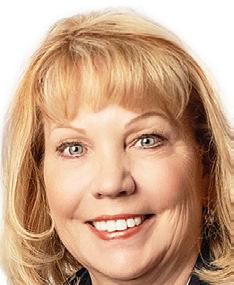
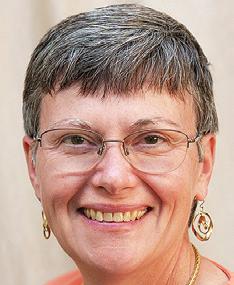
“I have the experience, education and desire to serve,” Fisher said. Fisher had some bumps in the road with the Public Disclosure Commission after she chose to file full reporting, which obligated her to file weekly and monthly financial reports during her campaign. She did not file either until she was contacted by PDC in August. Fisher said she learned how to file everything while on the phone with the commission for
several hours. “I should have filed mini reporting,” Fisher said. “It was an innocent mistake. I learned a lot, and I’m fully compliant now.” Fisher also has a notable employment record after leaving her positions as city manager in Mountainlake Terrace and Union Gap. Fisher denied receiving a settlement from Mountainlake Terrace, but according to the Everett Herald, the city paid her $75,000 as part of a settlement agreement in 2015. Fisher said she resigned from both city manager positions for different reasons.
“There was a new council that was installed, and following that I resigned. That is not uncommon in the city manager world,” Fisher said of her resignation at Mountainlake Terrace. Fisher resigned from Union Gap for medical reasons. She is healthy now and capable of being a part of the Liberty Lake City Council, Fisher said.
If elected, Schumacher’s priority will be listening to residents, she said.
“We need to really listen with a desire to understand someone else’s perspective and make an effort to know someone’s story,” Schum-
Continued from 4
come more likely to elect liberals after the map was redrawn in 2022 – a map Zappone created, sparking accusations of partisan gerrymandering.
A judge ruled in April 2023 that the map was not illegal – but also ruled council members should not have that level of involvement going forward. Voters in 2024 approved reforms to create more distance between the council and the creation of City Council district boundaries.
This is Savage’s fourth attempt at running for a council seat.
Since his election in 2021, Zappone has been a prominent member of the council’s liberal supermajority, a coalition he believes has made significant progress in slowing rent increases, improving public safety and reducing homelessness.
Savage, meanwhile, argues Zappone and the council majority have not done enough to mitigate the unintended downsides of their reforms, if they worked at all.
The same year Zappone was elected, then-Mayor Nadine Woodward proclaimed a “housing emergency” due to a lack of capacity in the housing market; rental vacancy rates lingered under 1%, giving landlords the ability to drive up rents as tenants had few alternatives. Today, vacancy rates hover around 5.5%, which is at the low end of the historical norm in the U.S., according to data collected by the Federal Reserve Bank of St. Louis. Rents are still climbing – about $200 in the last four years for a one-bedroom apartment, according Washington Center for Real Estate Research data.
Zappone believes city leadership deserves credit for reforms encouraging development through upzoning, relaxing requirements for developers to build parking, and creating tax incentives to convert existing street-level parking lots into housing.
Savage believes the city has been overly focused on encouraging multifamily development and too reticent to expand its inventory of single-family homes.
“A lot of people are getting priced out of their homes right now because it’s just way
Continued from 4
Stone, a developer and owner of SCAFCO who has spent more in recent years fighting Spokane’s progressive candidates and policies than perhaps any other donor – spending upwards of $250,000 in 2023 alone.
At a candidate forum hosted by Range Media, Telis questioned whether Stone would sway Barrientos’ council votes. Barrientos, asked if he would leave SCAFCO if elected, said he would not, but planned to give his council salary to charity if elected.
Barrientos has asserted that Stone’s politics are more nuanced than has been portrayed in the media, and in any case, “he would (not) ask for me to do something that is outside of his character.”
Barrientos said he believes when voters meet him, they will know he is a sincere believer in Democratic values, emphasizing his support for immigrants, among other social issues. He suggested his support for
acher said.
And that goes for the council members, too.
“How can we come together and find common ground?” Schumacher said. “I’d like to help the council work towards compromising and consensus building.”
Schumacher says she is approaching this race seeking input and is not coming to the council with an agenda.
“I’m coming with a humble and open mind,” Schumacher said. “I’ve been talking with voters left and right. I started knocking on doors in June and have been out there every day of the week.”
The two candidates agree that growth management is an issue in Liberty Lake. The current population of the city is 13,000, and Fisher says the city can only hold 20,000.
“There are going to be 8,000 more residents in the coming years. We need to thoughtfully plan this out,” Schumacher said.
Because of that growth, the City Council needs to be thinking ahead and spending money wisely . Since most of the city is zoned for housing, the council should focus on keeping that housing affordable, Fisher said.
“Most people here rent,” Fisher said. “Liberty Lake has a good mix of land zoning in the city, so there will continue to be a mix of multifamily units and single-family homes. We’re not in a housing shortage.”
too expensive to live here in Spokane, ” Savage said.
Zappone argues the city has tried to accomplish this through cheap infill development, but Savage argues shared buildings don’t meet the needs of families.
More than any other area of public interest, Savage argues Zappone and the council majority are failing to address the city’s homelessness or public safety concerns.
“Our downtown is, whether it’s perception or reality, a lot of people are not wanting to come downtown anymore,” he said.
He supports a reinstatement of the 2023 law banning homeless encampments within 1,000 feet of schools, parks and licensed day cares, which the state Supreme Court struck down in April. While Zappone supported a doomed procedural vote for the City Council to bring that law back, he quickly pivoted to supporting Mayor Lisa Brown’s alternative proposal, the H.O.M.E. ordinance, which outlawed camping citywide but opponents argue puts too little emphasis on enforcement.
Savage proposes a “downtown hospitality zone.” Though some business groups have called for a law under the same name, Savage’s version is more akin to the Stay Out of Drug Areas law passed last year in Seattle, which would bar people convicted of certain crimes from entering downtown.
Zappone believes the city has made significant progress on homelessness, noting the federally mandated census showed homelessness in the county has decreased by over 10% for each of the last two years.
While Zappone supports the H.O.M.E. ordinance, he agrees enforcement needs to be monitored, pointing to loitering he’s witnessed that he believes violates that law.
“So now that we have that strategy in place for the last two months now, we need to be making progress towards those goals and delivering those results,” Zappone said. At a candidate forum, Zappone pointed to Trump’s use of the national guard to address homelessness and recent comments by former Mayor Nadine Woodward suggesting the same should be done in Spokane. Asked whether he would support such a move, Savage said yes, before saying he would be unable to intervene as a local official.
local business interests shouldn’t position him in opposition to the Democratic Party.
“It’s clear to me that when businesses thrive, the economy thrives and the community thrives,” he said in an interview.
Telis appears unwilling to meet with constituents who aren’t on the political left, Barrientos insisted. He noted her absence from a forum put on by the Spokane Business Association and her pending appearance at a “Leftist Town Hall” organized by the local Communist and Socialist parties. Except Telis will not appear at the Leftist Town Hall, she said in a Friday interview.
“That was posed to me as something far different than what it turned out to be,” Telis said.
Michael Doyle, an organizer with the Spokane chapter of the Communist Party of the USA, disputes that Telis was misled.
“After the League of Women Voters told me they didn’t want to be involved, we had a poster made and I sent it to her, and she said it looked great,” Doyle said. “I’m disappointed. I’ll say that,” he added.
Both share wish for increased public safety
By Emily White THE SPOKESMAN-REVIEW
The candidates to replace longtime Spokane Valley City Councilman Rod Higgins have different takes on how the city should grow and how to keep it safe.
Mike Kelly, chief financial officer of KT Contracting, and Kristopher Pockell, software engineer manager at OpenEye, were the top finishers for Higgins’ seat in the August primary. Higgins, the city’s former mayor who has served on the City Council since 2013, chose not to run for reelection this year, leaving position 1 open for someone new. Higgins endorsed Pockell for the job.
In the primary election, Kelly had 46.5% of the votes, and Pockell had 33.5%. The other two candidates, Lisa Miller and Adam Smith, did not garner enough votes to carry them to November’s election.
Kelly ran for the state Senate seat to represent Spokane Valley last year but lost the election after details of a decades old drug conviction resurfaced, and Pockell ran and lost against Rep. Suzanne Schmidt for the state Legislature last year.
Housing, public safety and other priorities
Kelly and Pockell differ greatly in their stances on developments.
“I’m in favor of homeownership,” Kelly said. “I want people to be vested in the community.”
Kelly said he’s not a fan of apartment complexes, which he referred to as “huge monstrosities,” but said that townhomes or condos could be a good addition to the city, filling the gap for affordable housing.
Pockell believes in a more diverse approach and said he’d like to see more developments like the Kendall Yards Neighborhood in Spokane, where there are single- and multi-family housing units and local businesses where neighbors can grab brunch, cocktails and pizzas.
“Higher-density housing is some-
thing we need to be able to house the people that live here,” Pockell said.
“We need more housing of all types.”
The two candidates also differ in their view of homelessness.
Kelly said he’d like the council to demand accountability and have a firm enforcement of laws against open drug use, public indecency, drug possession, drug distribution and camping on people’s property. If homeless people in the Valley don’t want to access services that will help them, they should go to jail, Kelly said.
Kelly’s plan looks good on paper, Pockell said, but the local jail is already at capacity most days.
“We’re not trying to criminalize homelessness, we’re trying to make crime illegal again,” Kelly said.
A grand jury indicted Kelly on multiple drug and firearm charges including attempted possession of cocaine and conspiring to possess cocaine with the intent to distribute in October 1989, according to court records. The charges stemmed from June 1989, when Kelly and an associate purchased a kilogram of cocaine from an undercover Portland Police Bureau officer for $75,000, court records say. Kelly pleaded guilty to the charges and was sentenced to 10 years in prison.
Last year, when he ran for the Legislature, his website stressed he never used the drugs and only was involved in the “financing of transactions involving controlled substances.”
He also acknowledged it was wrong to be involved in the drug trade and said the case is no longer relevant.
His sentence was reduced to seven years after a judge dropped a firearms charge.
Pockell said he’d prefer to work with the state Legislature to loosen restrictions they place on city funds for homelessness.
“Our dollars could go much further if we could spend money on keeping people in their homes instead of waiting until they’re on the street,” Pockell said.
Both candidates said their biggest priority is public safety, mentioning the recent approval of a 0.1% sales
tax that received 59% of the Valley’s votes in August’s election.
The city estimates the tax will raise at least $2.6 million in 2026. The revenue will fund around 10 more Spokane County Sheriff’s Office deputies.
Pockell said he’s happy residents voted for the increase because of the need for more officers. Kelly opposed the increase, but said he’d rather see a sales tax increase like Proposition 1 than a property tax increase. Kelly helped work on a column against Proposition 1 earlier this year.
Both Pockell and Kelly plan to continue the City Council’s tradition of forgoing the state-allowed 1% annual property tax increase. The city has not raised property taxes for 16 consecutive years.
“The city has done a good job doing a lot with a little,” Pockell said. “Spokane Valley carrying essentially no debt is a very good thing. We’ve done a good job of making sure we have a balanced budget and are spending within our means.”
The council needs to create a budget that reflects city’s needs, rather than its wants, Kelly said.
He said his other priorities for the city would be focusing on budgeting, taxes and affordability.
“We have to make sure we’re spending our money wisely,” Kelly said.
Pockell said his other priorities for the city would be homelessness, the housing crisis and infrastructure.
“The city should take care of our shared infrastructure – roads and bridges,” Pockell said.
Pockell has endorsements from a wide political spectrum, including Spokane Valley Council members Ben Wick, Tim Hattenburg, Pam Haley and Higgins. He is also endorsed by the 4th Legislative District Democrats and the Republicans of Spokane County, an organization of moderate Republicans.
“I know both candidates, and I just feel Kris is more aligned with the way I view things,” Higgins said.
The council faces a number of is-
Candidate cites health problems
By Emily White THE SPOKESMAN-REVIEW
Spokane Valley City Councilman Ben Wick’s opponent in the November election told supporters in September that he’s dropping his challenge for the position.
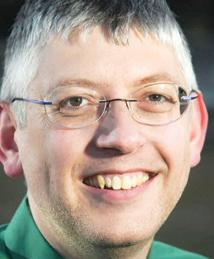
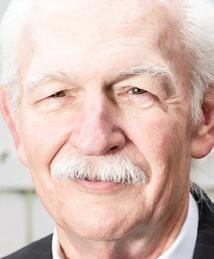
In a message to City Councilman Al Merkel, candidate Daryl Williams cited health challenges that Williams says would make it difficult to give full attention to city issues.
“I do not feel that I could give the people of Spokane Valley the full attention and energy they deserve from their council member,” Williams said in the message to Merkel. “It has been an honor to take part in this process and to hear from so many residents who care deeply about the future of our community.”
Williams did not respond to multiple requests from The Spokesman-Review for information.
Despite Williams’ announcement, it’s too late to remove his name from the ballot, said Spokane County Auditor Vicky Dalton. If Williams receives the most votes, he would win the seat on the council, but he can choose not to take office, Dalton said. If Williams chooses not to take office, Wick, as the incumbent, would remain on the council. If Williams wanted to prevent that from happening, he could take the oath of office and resign, Dalton said. Then the position would be declared vacant,
MEET THE CANDIDATE Spokane Valley City Council, Position 4
Ben Wick Age: 43
Education: Graduated from East Valley High School in 2000. Graduated from Eastern Washington University summa cum laude with a degree in computer science.
Work experience: Works in IT, purchasing, shipping, receiving and production scheduling at Spokane Industries. Also owns the Spokane Valley Current and Liberty Lake Splash.
Political experience: Was elected to the city council in November 2017 and re-elected for a second term in November 2021. Wick also served a four-year term on the council from 2012-15. He was Spokane Valley’s mayor from 2020-21.
Family: Married to Danica Wick. Has four kids
Campaign fundraising: Has raised $3,666 as of Oct. 1, 2025, according to the Washington Public Disclosure Commission. Contributors include former Spokane Valley Mayor Diana Wilhite, Spokane County Commissioner Mary Kuney, Spokane Home Builders Association political action committee and Associated General Contractor Build East PAC.
Daryl Williams
Williams announced in September that he is dropping his bid for Wick’s seat.
and a successor would be picked through the council. That successor would remain on the council until 2027, the next election.
“I hope his health will be OK,” Councilman Tim Hattenburg said. “I’m well aware of what a health problem can do to the council, not that I’m complaining.” Hattenburg recently took over as mayor for several months while Pam Haley took a medical leave of absence from the council.
Merkel, a council member who endorsed Williams, said on Friday he commends Williams for his choice to step back from the race. Williams is a part of the Coalition for Common Sense, a group composed of Merkel, Williams, Brad Hohn and Catherine Nelson. The coalition, organized in July, says it stands for public safety, low taxes and being fiscally responsible.
“It takes true bravery
and patriotism to recognize when health challenges prevent you from representing residents and devoting all your efforts to making Spokane Valley a great place to live again. Daryl’s courage to put the people of Spokane Valley above his own ambitions speaks volumes about his character,” Merkel said.
Wick has lived in the Valley all his life and has been involved in its politics for over two decades. Wick ran for the inaugural City Council when he was a college student and kept trying to get on council until 2012, when he won a seat.
“We just have so much opportunity,” Wick said.
Spokane Valley has a great foundation and tradition of fiscal responsibility and virtually no debt and Wick is dedicated to keeping that going, he said. Wick said his goal is to continue growing
Age: 61
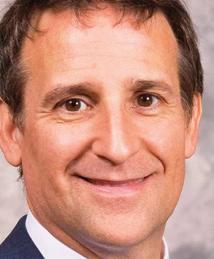

Mike Kelly
Education: Graduated from Parkrose High School in Portland in 1982. Attended Mount Hood Community College and Brigham Young University for a total of two years.
Work experience: Serves as chief financial officer for KT Contracting Company in Salem, Oregon. Owns Millennial Property Management in Keizer, Oregon; Millennial Capital Investors in Spokane Valley; and co-owns vehicle repair shop AMC Holdings in Salem. Owns or co-owns real estate holding companies in Spokane Valley; Vancouver, Washington; Leonardtown, Maryland; and several around Keizer, Oregon. Has worked as a financial adviser and investment counselor, a paralegal, business consultant and a certified tax preparer. Once owned an insurance agency and a trucking company.
Political experience: Currently a Republican precinct committee officer. Appointed to the Spokane Valley Planning Commission in March 2024. Unsuccessfully ran for state Senate representing Washington’s 4th Legislative District in 2024.
Family: Married to Kristi Kelly. Has three step-children and six grandchildren.
Fundraising: Has raised more than $15,500 as of Oct. 1, including a $7,000 loan to himself. Contributors include Karl Thatcher from Greenacres, retired Spokane Valley resident Janet Brown, Ben Lund of Lund’s Carpet Cleaning, former state Sen. Mike Padden and attorney Brandon Casey.
Kris Pockell
Age: 37
Education: Graduated from Central Valley High School in 2006. Earned a bachelor’s degree in software development in 2018, and a master of business administration degree in 2021, both from Western Governors University.
Work experience: Worked as a machinist at USWP Manufacturing, Mackay manufacturing and Romney Motion before returning to higher education. Spent three years as a software engineer at AssetWorks LLC before joining OpenEye in 2019. Now serves as a software engineering manager for OpenEye. Co-owns and operates Elixir Sauce Company, established in 2021.
Political experience: Ran unsuccessfully for a Spokane Valley Fire District commission seat in 2015, and for a state Representative seat in Washington’s Fourth Legislative District in 2024.
Family: Married to Rebekah Pockell.
Fundraising: Has raised nearly $22,500 including a $5,000 loan himself as of Oct. 1, according to the PDC. Contributors include himself, who gave $10,000 to his campaign; Mill Creek resident Paula Grigsby; Washington Realtors Political Action Committee; Neil Muller, vice president of Acrisure Northwest; and Spokane Valley Mayor Pam Haley.




Continued from 7
sues including homelessness, budgeting, property rights issues and public safety, Higgins said. But Higgins said he’s most concerned making sure new council members keep meetings efficient, referencing council member Al Merkel, whom Higgins called a “disruptive force.”
“Whoever is in my seat cannot be a person that seconds one of Merkel’s ideas so it’s open for discussion, because most of that stuff doesn’t need to be discussed,” Higgins said. “I think of the two, Kris is more likely to stand up to Merkel.”
Kelly is endorsed by the official GOP in Spokane, the Spokane County Republican Party. He’s backed by Councilwoman Jessica Yaeger and Laura Padden and Lisa Miller, who ran against him in the primary. Former Washington Sen. Mike Padden also endorsed Kelly.
“Mike has a great demeanor and is very thoughtful in his actions and questions,” Yaeger said. “He’s conservative and he is going to be very careful with finances. He’s going to question things when it comes to budgeting.”
“When I heard Rod was not going to run for re-election, I felt compelled to run,” Kelly said. “I felt that a strong person needed to be in this seat that would look out for the values and priorities of Spokane Valley.” Kelly says he’s the man for the job, noting that he’d be willing to stand up to outside pressure the city faces from neighboring cities.
“A lot of people feel like the problems emanating from Spokane are working their way out to outer areas like Spokane Valley,” Kelly said. Kelly said because he has more business, political and life experience, he would be a good council member. Kelly moved to the Valley six years ago.
Pockell, on the other hand, decided to run after trying and failing to find someone to support in the race for Higgins’ open seat. Everyone he spoke to, including Schmidt, told Pockell that he should run.
“I love Spokane Valley; it’s been my home all my life,” Pockell said. “I had a great childhood in the Valley, and I want to see that continue for future generations. I worry about the future of the Valley. I want it to remain a place that I love to live in.”
Pockell said that being a part of city council will give him the chance to give back to the city he grew up in.
“I understand the mindset of the people here because I’ve lived here my whole life,” Pockell said.
Council improvements
The city council could do better working together, said Pockell.
“There’s a lot of contention on the council today and a lot of back and forth that I wish we could do differently,” Pockell said. “I’m pretty easygoing, and I’d like to see the council do a better job of assuming the best in people and trying to rise above the infighting.”
Kelly said the council should have more residents attending meetings at city hall. His goal, if elected, would be to develop more engagement between council members and community members and to work to create a council that is more transparent for the average citizen.
“Often times perception is more important than reality,” Kelly said.
Right now, Kelly says the perception is that the council is insular.
“I’d like us to communicate with the public better and explain why the council is doing what they’re doing,” he said.
By Emily White THE SPOKESMAN-REVIEW
In her bid for re-election this fall, Spokane Valley City Councilwoman Laura Padden is fending off allegations from Brad Hohn, a political newcomer, about how the city has spent funds meant for public safety.
Meanwhile, she points to Hohn’s ties to Councilman Al Merkel, who has faced repeated accusations of harassment and misbehavior, from other members of the Spokane Valley City Council and some city workers.
Hohn is challenging Padden’s re-election bid on the council this November. In the primary election, Padden won nearly 53%.
Hohn advanced with a second-place showing of nearly 34% .
Hohn claimed Padden had previously voted to defund police and raise taxes for residents in the Valley. When asked to elaborate, Hohn said he was referring to the council voting to pull $350,000 from the public safety fund to cover legal costs associated with Merkel on May 27. The council – apart from Merkel – voted to transfer funding away from vehicle replacements and an unfilled civilian analyst position for the Spokane Valley Police Department to pay for legal costs.
According to Padden, the analyst position had not been filled for months and was not needed. The money would have been reallocated into the city general
fund if the council didn’t chose to use the funds to pay for legal fees, Padden said.
Like Merkel has previously suggested, Hohn says the council’s legal expenses could be funded by the city’s capital reserve fund instead of being pulled from public safety.
“She’ll say one thing and then vote another way,” Hohn said.
Padden said she has never voted to defund city police and said she is opposed to raising taxes for residents. She says Hohn is one of Merkel’s recruits.
“His talking points are Al’s talking points,” Padden said. “He wants the Valley to stay the same and while there’s a lot about the Valley I want to stay the same, I also recognize that it’s growing and we can’t stop growth – we have to deal with it and manage it in a way the preserves the culture of the city.”
Hohn is a part of the Coalition for Common Sense, a group composed of Councilman Al Merkel and City Council candidates Daryl Williams and Catherine Nelson. The coalition, organized in July, says it stands for public safety, low taxes and fiscal responsibility.
Hohn said his bid for office stemmed from concerns over council spending.
“Their spending is not accountable,” he said. “They spend money on road projects and things that are unnecessary.”
Getting affordable housing and keeping taxes down
Age: 72
Laura Padden
Education: Graduated from Holy Names Academy in Spokane. Went to Washington State University for a degree in police science and administration. Has a bachelor’s in computer science from Eastern Washington University.
Work experience: Worked at Jacklin Seed Co. as a data processing manager. Padden has been working at Spokane Community College in IT and web development for decades.
Political experience: Elected to Spokane Valley City Council in 2021, first re-election bid.
Family: Married to former Washington State 4th District
Sen. Mike Padden. Has five children, all sons.
Campaign fundraising: Has raised more than $10,800 as of Oct. 1, according to the state Public Disclosure Commission. Contributors include: Washington Association of Realtors, Spokane Home Builders Association Political Action Committee, Spokane County Communications Director Pat Bell and former Spokane County Republican Party Chairwoman Cindy Zapotocky.
Brad Hohn
Age: 64
Education: Graduated from Lakeland High School in Rathdrum in 1979.
Work experience: Managed salvage yard High Mountain Horsepower before stepping back for campaign. Has worked in the industry for decades, including 33 years at Spalding Auto Parts. Volunteer for ValleyFest every year, as well as a number of local schools and groups.
Political experience: First bid for public office.
Family: Married to Debbie Hohn. Father to three adult sons educated in Central Valley School District.
Campaign fundraising: Agreed to raise no more than $7,000 and is not required to report to the PDC.
are Hohn’s biggest priorities for the Valley. But Hohn said he’d likely only support single-family housing developments.
“When someone is paying $300,000 to $500,000 for their house and there’s an apartment building next to their home, it devalues the home and makes it a lot less desirable,” he said.
Hohn said there’s no reason to increase property taxes for residents, adding roads will be a priority for him but the city needs to scale back on road projects.
“The city has taken on a huge chunk of money on fixing our roads, when some of that should be put towards the developers of big housing projects,”
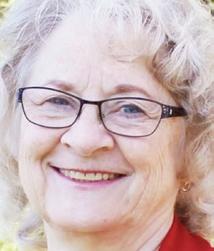
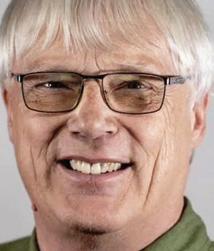
Hohn said.
Like Padden, Hohn said he wants more folks to own their home rather than rent.
Padden, who has lived in Spokane Valley all her life, was elected to the council in 2021. She’s married to former state Sen. Mike Padden. She said she’s running because she wants to see the Valley develop more businesses and homes.
“Despite some of the challenges we’ve had, there’s a lot of momentum positively going forward with the city,” Padden said. Public safety, roads and housing will be Padden’s biggest priorities if she wins election, she said. She said prioritizing public safety and roads will be easier after residents voted to pass a 0.1% sales tax increase.
Raising property taxes is not fair to people on fixed incomes, Padden said.
“I don’t think that’s right to tax them out of their home,” she said.
Right now, she said there aren’t many affordable ways for people to purchase a home, so Padden wants to find ways to get townhomes or condos in the city.
“One thing I want to focus on in my second term is trying to figure out ways we can incentivize developers to be able to build entry-level homes, or workforce housing, so that people can start to build equity in their homes and have stability in their financial situation,” Padden said.
Mayor Haley says health made her realize importance
Opponent Nelson says she will lead with eye to the future
By Emily White THE SPOKESMAN-REVIEW
After months of speculation, Spokane Valley Mayor Pam Haley has addressed concerns about her health ahead of the November election. She faces political newcomer Catherine Nelson, who has worked as a Realtor in the Valley for nearly a decade.
Haley said last month she suffered a heart attack in June and was on medical leave for three months.
Haley spent nine days in intensive care and several more days in the hospital. She has returned to council meetings in person.
Several people have questioned whether she is healthy enough to be involved in government, including Councilman Al Merkel, who alluded to Haley’s absence in a statement.
“It takes true bravery and patriotism to recognize when health challenges prevent you from representing residents and devoting all your efforts to making Spokane Valley a great place to live again,” Merkel wrote in a statement, praising a political ally who announced he was dropping his bid for a different council seat.
Haley has the support of a broad coalition of elected leaders, including Spokane Valley City Council members Tim Hattenburg, Rod Higgins, Laura Padden and Jessica Yaeger and state Reps. Suzanne Schmidt and Rob Chase.
Nelson, who won the endorsement of the Spokane County Republican Party, is a part of the Coa-
Continued from 7
the economy and advocate for the city.
lition for Common Sense, a group composed of Brad Hohn and Merkel that has been deeply critical of the Spokane Valley City Council. Nelson said she’s felt ashamed of the people she’s voted for who are now on the council, except for Merkel, because he continuously questions contracts and projects that cost the city money.
The heart attack put things into focus for Haley and made her realize her work in government is important to her, she said.
“This campaign is still really important to me,” Haley said. “One of the things you find out when you go through a serious illness like that is you need to focus your attention on the things that really matter, and it does really matter to me.
Some people call me crazy, but that’s OK.”
Haley had open heart surgery, and physicians gave her a 10% chance of survival.
“I was told that for every day you’re in the ICU, it’s a month of recovery time,” Haley said.
During her time away, Haley attended council meetings virtually, but rarely participated. Her re-election effort was affected by the medical leave. As of last month, she was in cardiac rehabilitation and unable to do active campaigning.
Nelson commented on Haley’s medical leave on social media platform Nextdoor, stating Haley should tell people why she was on medical leave and update residents on her health.
“I hope she’s well,” Nelson said. “I believe my
“We’re lucky to have Ben,” Hattenburg said. “He has a lot of political experience in the Valley. He’s a person who will listen to everyone.” Public safety and infrastructure are Wick’s biggest priorities for the city. Although he feels the city should continue contracting with the Spokane County Sheriff’s Office to provide the Valley’s police force, Wick said the city could do more to crack
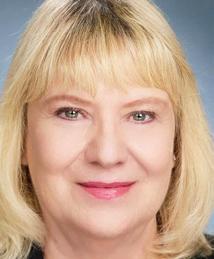
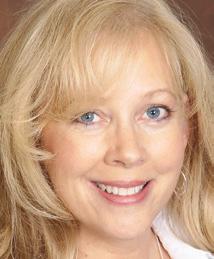
ideas and my ability to look through things and stand up for things is much higher than hers.”
Nelson said she will be a less emotional, more levelheaded and thoughtful council member than Haley.
“A lot of my frustration with the current council has to do with their failure to look forward,” Nelson said. “To look at a project and ask the right questions and provide a way to pull projects back if they’re not successful.”
If re-elected, Haley’s biggest priorities will be public safety, infrastructure and local roads.
“Our roads are another big issue,” Haley said. “It seems boring, but if we don’t maintain them, then no one will think it’s boring anymore.”
Haley would like to see the city continue making progress on railroad crossings by building overpasses and underpasses.
“People don’t realize that those railroad crossings are more than just annoying,” Haley said. “If you’re in an ambulance and you’re trying to get to the hospital and you’re on the other side of the railroad tracks, it’s hard to get there.”
Nelson and Haley agreed there needs to be more affordable housing.
Nelson ran for office because she is concerned Valley residents could be taxed out of their homes.
“Every time I turn around, it feels like the powers that be are sticking
down on crime. Infrastructure projects like the project to build a railroad bridge over Pines Road to help the flow of traffic need to be completed, Wick said. The Valley has $43 million in state and federal funds to cover the project, and the city likely will break ground on the
MEET THE CANDIDATES
Spokane Valley City Council
Position 5
Pamela Haley
Age: 68
Education: Graduated from Central Valley High School in 1975. Graduated from Spokane Falls Community College and attended Eastern Washington University before transferring to Ashford University to complete bachelor’s degree in organizational management and master’s degree in business with an emphasis in human resources. Also earned a master’s degree in education from Capella University.
Work experience: Former manager of Valley Empire Collection. Has run day cares, including Rainbow Connection Daycare, for decades.
Political experience: Appointed to Spokane Valley City Council in 2016. Elected to the council in 2017 and 2021. Has served as mayor since 2022. Has served as a Republican precinct committee officer from 2020 to present.
Family: Married to Jim Haley.
Campaign fundraising: Has raised $1,865 – $966 in donations and $899.50 in loans as of Oct. 1.
Catherine Nelson
Age: 60
Education: Graduated from Ingram High School in Seattle in 1983. Attended South Seattle Community College but never graduated.
Work experience: Nelson has worked as a mortgage broker for about 25 years and as a licensed Realtor for 8 years. In between those jobs, she managed two different multimillion dollar real estate investment trusts.
Political experience: First run for office
Family: Unmarried and has two children and six grandchildren.
Campaign fundraising: Agreed to raise no more than $7,000 for her campaign and is not required to report to the state Public Disclosure Commission.
their hand out for another few dollars,” Nelson said.
“When I talk to my neighbors, a $50 fee, a $20 fee matters to them. It matters to me.”
Even so, unlike most cities, the City Council usually declines to raise property taxes by the 1% boost that state law allows via a vote of the council. Spokane Valley has held taxes steady for 16 years.
Nelson’s biggest priorities if elected will be po-
underpass this month, Jill Smith said.
“Every dollar we spend on maintenance we save up to $8 from having to repave a street,” Wick said.
Wick said he hopes the council will develop more of a vision toward projects like connecting the Appleway and Centennial trails.
licing and improving local roads. Nelson wants to explore ways the city can cut the budget and decrease fees for citizens and increase the police presence in the Valley.
“Our roads aren’t as good as they were,” Nelson said. “I, like many people, have worked in Spokane and traveled back and forth. I recall many times thinking, ‘Thank God our roads aren’t like Spokane’s.’ But now they are.”
The council has made good strides to grow the economy and prioritize infrastructure improvements, Wick said, which has led to more development.
“We want to make investments that attract businesses so we can get an economic engine going,” Wick said.
By Nina Culver FOR THE SPOKESMAN-REVIEW
In his third run to lead Cheney, Mayor Chris Grover is facing his first opponent, political newcomer Elsa Martin.
Martin, a former chemical engineer turned children’s minister, said she’d like to see the city make improvements, particularly in the way it communicates with citizens and in public services.
“I’m not a politician,” she said. “I just would really like our city to be a place people want to live in and are proud to live in.”
Grover, who served in the U.S. Navy for 23 years after growing up in Cheney, said he always knew he was coming back after he retired from the military. He has worked as a financial planner since he left the military.
“I consider Cheney my home,” he said. “It’s where I established roots.”
He decided to run for one more term as mayor to finish several long-term projects, including the purple pipe project slated to be completed next year to bring treated wastewater to local parks and schools for irrigation.
Martin lived in Montana and Texas before moving to Cheney in the seventh grade. She earned her degree in chemical engineering from Montana State University in Bozeman.
She worked for a design build contractor for several
years and later did industrial safety audits before raising her children. She and her husband moved to Cheney, where she attended Cheney Faith Center and went on to become a children’s minister for eight years.
Martin homeschools her four children.
“I’ve been able to volunteer a lot more,” she said.
She first became interested in how the city runs a couple years ago when she attended a soccer game at a local park. Martin said the bathrooms were in bad shape and talked with parents about other issues.
“It started to perk my ears that there might be some things I need to learn,” she said. “I started going to City Council meetings, park board meetings.”
She learned one reason the bathrooms were in poor repair was repeated vandalism, which in turn seemed connected to the lack of lighting at night. Martin said she learned it’s not as simple as fixing the bathrooms.
Martin said she would like to see the city communicate with residents better. There is no social media page, and the city doesn’t have a staff member dedicated to the job.
“I would like to see better communication,” she said. “That’s a point of frustration for many people in our town. I think we could make some significant website improvements.”
Grover said he would love
Age: 57
Cheney mayor
Chris Grover
Education: Graduated from Cheney High School in 1986.
Work experience: Served in the U.S. Navy for 23 years, retiring in 2008 as a lieutenant commander. He has worked as a financial adviser with Edward Jones since 2009.
Political experience: Served on the Cheney planning commission for five years before serving four years on the city council. He is finishing his second term as mayor.
Family: Married to Jamie Grover and has five children and four grandchildren.
Campaign finance: Has raised $1,100 as of Sept. 23, all from himself and his wife.
Elsa Martin
Age: 38
Education: Graduated from Cheney High School in 2005; holds a bachelor’s degree in chemical engineering from Montana State University.
Work experience: Worked for a design build contractor for several years and also did industrial safety audits before quitting to raise her children. She later was a children’s minister at Cheney Faith Center for eight years.
Political experience: First run for office.
Family: Married to Conrad Martin and has four children.
Campaign finance: Has raised nearly $5,600 as of Oct. 1. Four donors gave more than $1,000, including Macey Fredenberg, owner of the Craft Cupboard in Cheney.
to have a staffer dedicated to communications, but the city can’t afford it.
“Our city runs on a pretty minimal staff,” he said. “It all comes down to being good stewards of taxpayer money. I have to balance the books at the end of the day.”
The city also needs to address issues with its water system, she said.
“We have a water issue in Cheney,” she said. “It’s
either not clean, or in the summer, it’s not there.”
Grover said while the city’s water occasionally has sediment in it, it’s safe to drink. The city has eight wells, and the water system is large and old, Grover said. The city makes an effort to repair and replace equipment every year, he said.
“We have a long-term schedule for maintenance of our wells,” he said. “Some-
By Nina Culver FOR THE SPOKESMAN-REVIEW
The August primary turned up surprising results in the Cheney City Council race for Position 4, with only three votes separating the top two candidates.

Software engineer Rebecca Long earned 660 votes, barely edging out the 657 votes received by retired firefighter Tim Steiner. They easily defeated Shawn Ricketson in the August primary to advance to the November election.
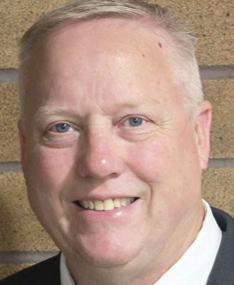
“It really highlights the importance of every single vote,” she said.
“It’s going to be a tight race.”
Long has been working as director of software engineering for ENGIE Impact for the last several years. Steiner retired from the Cheney Fire Department this summer as a battalion chief after 38 years.
Both candidates agree there’s work to be done, particularly infrastructure. That includes the water system, which often has restrictions in the summer.
“Cheney is not on the Spokane Aquifer,” Steiner said. “We have a well system. Water is a huge issue out here. Some of the pumps are aging. It’s expensive to rehab these wells, but it’s something we have to do.”
Long said some areas see brown water and low pressure.
“When I bought my house, it came with a water filtration system,” she said. “I had to put in my own pressure tank to get my sprinklers to work.”
Steiner is looking forward to the completion of the purple pipe project. The system will bring treated wastewater to schools and parks for irrigation use. “That’s going to take a tremendous burden off the water system,” he said.
Steiner said the city’s police station needs improvements.
“Our police officers are currently quite cramped in their current location,” he said.
The city has been working on some improvements, including replacing the driveway at the fire station. It was built in 1972, when fire engines were smaller and lighter, Steiner said.
“It’s been sorely needed for years,” he said of the driveway.
MEET THE CANDIDATES
Cheney City Council position 4
Rebecca Long
Age: 41
Education: Attended Eastern Washington University for a bachelor’s degree in computer science starting in 2002. Also received a master’s degree in computer science from EWU in 2013.
Work experience: Leads two global software engineering teams as a director of software engineering for ENGIE Impact. Long has been in the position for a little over five years.
Political experience: First ran for a position on Cheney City Council in 2023 but lost to an incumbent.
Campaign finance: Raised about $8,800, including $1,800 in loans as of Oct. 1, according to the state Public Disclosure Commission. Contributors include Spokane County Water District 3
Commissioner Mary Wissink and former state legislative candidate Pam Kohlmeier and Spokane City Council candidate Kate Telis.
Tim Steiner
Age: 56
Education: Steiner went to schools in Cheney and went on to attend Central Washington University, Spokane Community College and Eastern Washington University getting an associate degree in fire science and a vocational teaching certificate.
Work experience: Steiner just retired after a total of 38 years of work at the Cheney Fire Department. He was a volunteer for his first 14 years before becoming full time and eventually a battalion chief where he led a team of firefighters.
Political experience: First run for office.
Campaign finance: Raised nearly $3,400, including $1,000 in loans as of Oct. 1, according to the state Public Disclosure Commission. Contributors include retiree Billie Jean Hall.
The city needs to continue making infrastructure improvements, he said. “We’re working on those infrastructure issues, but we’ve got to keep them going,” he said.
Both candidates expressed concern about staffing issues.
City administrator Jark Schuller resigned in August after a vote of no confidence by all six city employee unions in June.
Two interim co-city administrators were appointed.
“That’s not a long-term solution,” Long said. “A city administrator role is a very important role with the city. It feels very complacent, that the city is just going to run itself.”
One of the issues that led to the vote of no confidence was how the rollout of the city’s new payroll system was handled, Steiner said. Many employees received incorrect paychecks.
“There’s been a lot of turmoil with finance,” Steiner said. “They’re trying a number of efficiency changes and there’s been some hiccups. There wasn’t enough work on the front end with the unions to make the transition smooth.”
Cheney is lacking a city planner, Long said, and the planning commission has not met since the previous planner left. The commission, which usually meets once a month, is in
charge of making recommendations to the City Council on issues, like permits and zoning.
The city has been without a permanent police chief since chief Rick Beghtol retired. Interim chief Chris Oakes was appointed in March. Long said she’s not sure what has been happening with the search. “It feels very confusing to me as an outsider,” she said. “... This impacts our residents.”
Steiner said it can be difficult to find qualified people who are willing to live and work in a small town. “Money is a big issue. To be competitive for city administrators and police chiefs, it costs a lot of money.”
One of Long’s goals is to bring visibility to the city’s decisions so people can be informed.
“I want to do right by our community,” she said. “I want to give back and this feels like the way I can do it. I hope to earn folks’ votes, because I’m working hard to serve all of them.”
Steiner said he wants to serve the community he’s lived in nearly all his life. “I don’t have any agendas,” he said. “I have a community I was born and raised in, and want to make sure it’s a strong community, a safe community for families to be in. I’m here to serve the citizens.”
times we don’t have a lot of money to improve a bunch of wells at once.”
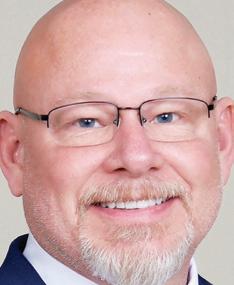
He hopes the purple pipe system, once complete, will ease the demand on the city’s water system.
“Right now we’re using potable water to do that,” he said. “That will decrease our water usage significantly.”
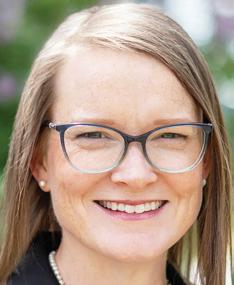
The city is missing key staff members, including a police chief and a city administrator. Former police Chief Richard Beghtol, who had served as interim chief for two years, resigned in February. A new interim chief, Chris Oakes, was sworn in in March. Former city administrator Mark Schuller resigned in August after all of the city’s employee unions gave him a vote of no confidence in May. The city has appointed two staff members as interim co-city administrators.
“Those are both very essential and important positions in our city government,” Martin said. “I think it’s important we have qualified candidates.”
Martin said she is trusting the city to follow the appropriate process to replace the
two, but said she’s heard little more than rumors.
Grover said he has not put out any news releases on the staffing issues. He has talked it over with the City Council in executive session, which is not open to the public.
Grover said he’s reviewing proposals from consulting firms the city can hire to do a national search for a new city administrator. He’s considering a wider search for a police chief.
“As mayor, I do have to do my due diligence,” he said. “I need to be very deliberate about who is filling these very important roles in the city.” The city is without a planner, who quit in February. The planning commission, in charge of holding hearings and making recommendations to the City Council, has not met since then.
“We’re going through budget season right now,” he said. “Right now, we haven’t opened that position up to hire somebody.”
Martin said she believes she’s qualified to lead.
“I value the input of our citizens,” she said. “This is my home. This is going to be my home. My family is fully involved in the community.”
Grover said he hopes voters look to his experience.
“I’m passionate about this city,” he said. “I think I’m the person, with the leadership that I have, to keep leading the city down the positive road that we need to go down.”
By Nina Culver FOR THE SPOKESMAN-REVIEW
Two political newcomers are vying for a seat on the Cheney City Council created when incumbent Paul Schmidt did not file for re-election.
Mia Pesefea said her work at the Eastern Washington University Children’s Center while she was a student and now as the family service coordinator for the center’s early childhood program helped inspire her to run for the position.
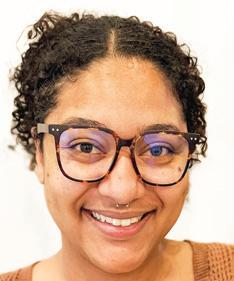
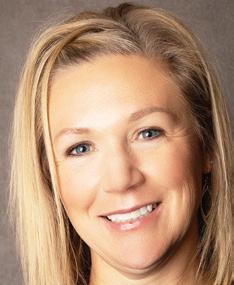
“I really enjoyed being able to directly serve the community,” she said. Similarly, Shelly Hahn said she’s always wanted to help people.
“My kids are launching, and I have a little bit more time to give to the community,” she said.
Pesefea said she’s concerned some people in Cheney need help with basic resources like rental assistance, food and school supplies.
“We have a pretty huge difference in household incomes in the area,” she said.
Help exists through the Cheney Outreach Center, but Pesefea said she’s concerned that not enough people know about it.
She’d also like to see more of an emphasis on economic development.
“Our community needs to look at ways to bring income in,” she said.
The city’s website is hard to navigate and should be updated, she said.
“We can remedy that issue quickly and easily at a relatively low cost.”
But Pesefea said her key concern is a lack of communication.
“I would like to know a little bit more clearly where decisions are being made,” she said.
Hahn said she has concerns about the city’s water systems.
“I think water is an important issue, and it’s an issue I don’t understand very well,” she said.
She’s interested in attracting businesses to provide jobs and services for residents, but said it’s important to maintain Cheney’s small-town feel.
“I think that’s one of the things residents like,” she said. “They don’t want to live in a large city.”
Hahn said she’s aware the city is missing people in key roles, including city administrator and police chief.
Two staff members have interim cocity administrator roles, and there is an interim police chief. She said she’s trusting the process the city is going through to hire replacements.
MEET THE CANDIDATES
Cheney City Council position 1
Mia Pesefea
Age: 28
Education: Graduated from Monroe High School in Monroe, Washington, in 2014. Attended Skagit Community College for two years before transferring to Eastern Washington University and earning a bachelor’s degree in psychology.
Work experience: Began working in Eastern Washington University Children’s Center infant room while in college and is now family service coordinator for its Early Childhood Education and Assistance Program.
Political experience: First run for office.
Family: Married to Patiole Pesefea and has one son.
Campaign finance: Pesefea agreed not to raise more than $7,000 for her campaign and is not required to report contributions. However, she has a GoFundMe campaign with a goal of raising $6,000 and had raised $280 as of Oct. 1.
Shelly Hahn
Age: 48
Education: Graduated from Sentinel High School in Missoula, Montana, in 1995. She received a bachelor’s degree in psychology from the University of Montana and a master’s degree in counseling psychology with an emphasis on marriage and family therapy from the University of Oregon.
Work experience: Worked for Lutheran Community Services Northwest for 21 years and is the director of the Inland Northwest District.
Political experience: First run for office.
Family: Married to Lenny Hahn and has two children.
Campaign finance: Hahn agreed not to raise more than $7,000 for her campaign and is not required to report contributions.
“I don’t have enough reliable information to have concerns about that,” she said.
Pesefea said she’s excited about the prospect of serving on the City Council and said she has no links to any of the city leaders.
“I am a fresh face and mind,” she said. The only loyalty I have is to the Cheney community as a whole.”
Hahn said her professional skills of collaboration and listening would be useful on the city council.
“I don’t see this as a political role,” she said. “I see this as a community service.”
Prop 1 would advise on sale, possession, discharge in city
By Nick Gibson THE SPOKESMAN-REVIEW
Two years after wildfire gutted the city, the Medical Lake City Council is seeking voter insight on the future of fireworks in the small town.
Medical Lake Advisory Proposition 1 asks voters whether the sale, possession and discharge of consumer fireworks should be prohibited in the city – an ongoing debate since well before the Gray fire burned more than 10,000 acres in and around the town in 2023, said City Administrator Sonny Weathers.
“Historically, every time the council says, ‘Well, let’s talk fireworks,’ it gets the biggest crowds in the meetings,” Weathers said. “There’s lots of people with strong opinions who are sharing their thoughts.”
Medical Lake is one of few municipalities in the region that still allows the sale and use of fireworks, with residents able to set them off on private property from 9 a.m. to 11 p.m. on the Fourth of July. Sales are limited to a short window around the holiday.
Weathers said the council would like to have direct data to pull from when planning for the future of fireworks in the town, which the election should provide. The measure is an advisory vote, meaning it will not lead to any binding changes to law. The council will use

the results to inform any potential future action, he said.
Medical Lake Mayor Terri Cooper said that residents have suggested for decades to put the question to them directly, rather than having the passionate pleas from those on either side of the issue play out at council meetings.
Those in favor of the prohibition cite public safety and quality of life concerns, citing the effect fireworks can have on local pets, veterans and the environment. The latter concerns include the obvious worries about another wildfire, as well as pollution and associated cleanup costs, as stated by the committee in favor included in the Spokane County Voters’ Guide.
Those in favor of keeping firework sales and use in Medical Lake argue it is an important tradition, and that existing regulations are enough to ensure public safety. Enforcement, preparations, equipment and cleanup related to fireworks are a negligible fraction of the city’s budget, the committee responsible for the against statement argued in the Voters’ Guide.
“I really think that it’s about time we heard from the citizens,” Coo -
Fireworks explode over Spokane’s Riverfront Park, July 4, 2017.
MEET THE CANDIDATES
candidate
By Nick Gibson THE SPOKESMAN-REVIEW
per said. “Let us know, and then if the council does want to act, there’s a whole process we will work through.”
If the council does decide to move forward with a ban, state law dictates it would not take effect until a year after their decision, Weather said.
“It’s a very peculiar set of circumstances, and it’s a charged conversation for people on both sides,” Weathers said.
Weathers said the council decided to run the measure during the general election because it usually draws a large turnout, and to minimize the cost to the city. If Medical Lake held a special election, it would have cost upwards of $20,000, Weathers said.
Putting the firework question to the voters during the general election, when several local governments have issues on the ballot, means the costs of the election are more widely dispersed. The cost to Medical Lake is now only around a tenth of the estimated $20,000 cost if it were the only issue on the ballot.
“We just are looking forward to seeing what people have to say when they cast their vote,” Weathers added.
A race for Medical Lake City Council features two political newcomers, a U.S. Army veteran turned tradesman and a real estate professional who operates a children’s boutique.
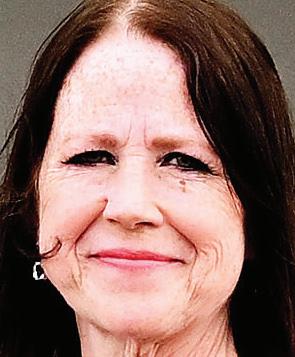

Heath Wilbur, 48, and Kathleen Morse, 62, are vying for an open seat on the town’s governing board after incumbent Don Kennedy opted not to run for re-election.
Wilbur spent five years in the Army as a mechanic, command staff orderly and maintenance manager before retiring in 2015 to spend more time with his family. He said his two special needs sons were transitioning into middle school, and he stepped aside to assist his wife, Suzanne Wilbur, with what can be “a lot of work for just one parent.”
The family landed in Medical Lake, where both of his sons attended school and graduated with their high school diplomas. Now, Wilbur is hoping to give back to the community his family has called home for years as an elected official.
“It’s our job to make sure that the town’s running smoothly so people have those opportunities to de-
Position No. 1
Kathleen Morse
Age: 62
Education: Graduated Inglemoor High School in Kenmore, Washington. Attended some community college for a prospective nursing degree, did not complete.
Political experience: First run for office.
Work experience: Owner of the European Child, a boutique offering imported children’s clothing and products in Medical Lake. Has been a real estate professional for decades. Worked in title insurance and escrow, does real estate photography and is a licensed Realtor in Washington and Idaho. Formerly an employee of Nordstrom and her husband’s company, TourFactory.
Family: Married to Stacy Morse, has one son.
Campaign contributions: Had no reported donations as of Oct. 3, according to the Public Disclosure Commission. Heath Wilbur
Age: 48
Education: Home-schooled from sixth grade to age 16, when he earned his GED from Big Bend Community College in Moses Lake, Washington. Currently attending Eastern Washington University for a bachelor’s degree in urban planning and development.
Political experience: First run for office.
Work experience: Currently a full-time student. Served five years in the U.S. Army, going from a maintenance position to command staff orderly and overseeing the maintenance program for power generation systems. Has experience in a variety of trades, picks up odd jobs while attending EWU.
Family: Married to Suzanne Wilbur, has two sons. Campaign contributions: Has no reported donations as of Oct. 3, according to the Public Disclosure Commission.
velop culture, or community,” Wilbur said. “If the city isn’t running well, if it looks like a ghost town, or the city leaders have a feeling of us against them, the people will know. That’s something I hope to help avoid.”
Morse is the owner of the European Child, a boutique children’s shop that opened in Medical Lake last fall. She’s worked in
real estate for years, including in title insurance and escrow, as a certified agent in Washington and Idaho, and as a photographer, with her work split between Seattle and Coeur d’Alene. Morse opened the European Child in the heart of the town’s business district at the tail end of 2024. The








specialty boutique offers a cultivated selection of imported children’s clothing and equipment, and is the second iteration of a business Morse managed in the Puget Sound years ago. She said the success of the town’s business community is what has motivated her to run for office.
“The bottom line is that I have a home here, I have a business here, and I love Medical Lake,” Morse said. “I want a healthy downtown business district, I don’t want vacant buildings.”
Morse is frank about sharing she’s a new arrival in Medical Lake and maintains she is in compliance with state law regarding eligibility for public office.
In an August 2024 interview with The Spokesman-Review before her shop opened, Morse said she lived on a farm in Nine Mile Falls. The Medical Lake home she listed in order to run for office was purchased by Morse in June 2024, according to property records.
State law dictates that a candidate must have permanent residency and be a registered voter in the jurisdiction in which they are running for office. It further establishes that a candidate needs to have lived in the jurisdiction for at least a year prior. Morse said she reviewed the statutes and checked in at Medical Lake City Hall prior to filing to ensure she was in compliance.
Morse called Medical Lake her “adopted town,” and said that she lives in the house full-time. The fixer-upper was part of a few investments she made in town after receiving a large inheritance. She also owns the building featuring her shop and an empty lot in the town’s borders she plans to use as a staging area for construction projects nearby. Medical Lake, decimated by wildfire in 2023, is abound with opportunities as it rebuilds, she said.
“I’m all in, I plan on dying here,” Morse said. “… I have plans to buy buildings and do this and do that, so I’m all in. I’m never leaving.”
The two candidates agree that economic development in Medical Lake should prioritize momand-pop shops, and have each backed a vacant property ordinance implemented by the current council more than a year ago.
Morse said the ordinance is doing wonders for Medical Lake’s business district, but that there’s more work to be done to transform the area while preserving the “small-town USA feel.”
The ordinance requires property owners to register their vacant buildings, post information on how to buy or lease the property and inspections from code enforcement officers to identify needed work in order to occupy it, so that information can later be passed on to prospective tenants or owners. The ordinance also carries associated fines that can increase the longer a building is vacant and an owner is out of compliance.
While acknowledging she’s not up to speed on current efforts in City Hall, Morse said she believes more could be done to drive visitors to Medical Lake year-round so new businesses can thrive. She does not have concrete suggestions for what that driving force could be, but suggested exploring ways to take advantage of the recreational opportunities in the region like the local lakes.
“I don’t know what it would look like,” Morse said. “Being an outsider, I’m bringing outside ideas, that people may lose their mind or whatever.”
In addition to encouraging more visitors yearround, Morse would like to see an expansion of the local events that attract folks for a few weekends each year, like concerts by the
lake and the farmers market. She would also like to lend her expertise in real estate to weigh in on landuse decisions as more housing goes up on the West Plains.
“Being a Realtor, you think I’m all for development,” Morse said. “I’m actually not. I don’t like subdivisions. Personally, I like old, quaint communities.”
As a tradesman and fulltime student at Eastern Washington University studying urban planning and development, Wilbur believes his background will be an asset in City Hall. The town needs thoughtful planning as it grows, whether it’s around expanding the local sewer system, road maintenance, housing or public transportation, he said.
If elected, Wilbur said one of his guiding philosophies will be “working for the people, not corporations.” He’s against having chains open up in the small town, and would rather see local businesses take advantage of available space. He’s in favor of the ordinance, and said he would support bolstering it to include annual increases in property taxes for absentee owners.
“I want to see positive growth in the city, not stagnation,” Wilbur said. “So locally owned businesses, not larger franchises, corporations coming in.”
Wilbur added that he would also advocate for more opportunities for teens and young adults in Medical Lake, whether it’s an internship program in collaboration with the local school district and business community, or the city standing up those opportunities as well. Wilbur pointed to the recent gift of Waterfront Park from the state to the city, following multiple decades of the city leasing the property, saying that the city could organize a program in which local youth oversee snack sales and recreation rentals to visitors.
“I’d really like to introduce programs like that, and maybe see if we can get any type of grants where we can pay these young people,” Wilbur said. “So they can develop these personal relationships, empathy, and gain some new job experience where they otherwise might not be able to.”
Wilbur’s interest in opportunities for local youth extends to parks and recreation, he said. He would like to explore the idea of creating a rec center in the small town, which could generate revenue for the city and help foster a sense of community.
Morse’s campaign is centered almost entirely around economic development and advocating for the business district, but she said she looks forward to the opportunity to learn more about the city’s challenges, programs and current efforts. If elected, she’d hope to preserve Medical Lake’s character while promoting growth.
“It’s a new world to me, but, ultimately, I just want the very best for this town in all aspects,” Morse said. “I’d like it to look good. I’d like it to be safe. I’d like all the things that people want, you know what I mean? And to keep it smalltown-USA.”
Wilbur said he wants to focus on all the technical aspects and planning that go into ensuring a small town thrives, spanning public safety, transit, solid waste and wastewater systems, housing and economic development. He said his studies have prepared him well to be part of the planning behind the many facets of local government, and he hopes his bid for office encourages other local residents to get involved with shaping the community they live in.
“I thought to myself, if I want to see these changes, I should probably step up and be here for the people,” Wilbur said.
Nick Gibson can be reached at (509) 459-5039 or by email at nickg@spokesman. com.
By Nick Gibson THE SPOKESMAN-REVIEW
Two well-known Medical Lake leaders are hoping to serve another four years as Medical Lake mayor – a familiar role for each of them.
In her first re-election bid, Mayor Terri Cooper is facing a challenge from one of her predecessors, John Higgins.
First elected in 2005, Higgins served three terms before opting not to run for re-election in 2017. He’s a lifelong resident who graduated from Medical Lake High School in 1966. Now retired, he spent 25 years as a forensic therapist for Eastern State Hospital before returning to his alma mater to serve as a paraeducator, as well as a hall-of-fame softball coach of nearly three decades.
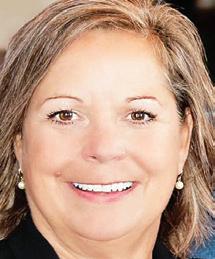
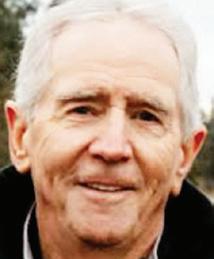
Cooper is also a graduate of Medical Lake High School, and has also spent most of her professional and political career serving the West Plains. After working in banking, she began working as a court administrator in Medical Lake. She retired from her position as a Cheney Municipal Court commissioner after the Gray fire in 2023 after joining the court in 2004.
While the two each have strong ties to the region, Higgins said they contrast greatly in their vision for Medical Lake’s future.
“Her and I don’t see eye to eye on too much,” Higgins said.
Higgins said his desire to run again was spurred predominantly by his concerns for the city’s financial standing. Higgins said the city has received an influx of wildfire recovery funds to assist in the town’s recovery, and Cooper is making investments and spending at a rate that’s unsustainable.
“I’ve had a lot of people call me concerned about where the money has gone, who’s getting it and who’s making decisions on who’s going to get the money,” Higgins said. “There’s a lot of discontent out there from some of the landowners that lost houses and stuff.”
But Cooper stressed that Medical Lake received “zero” direct funding for recovery from the Gray fire. It was, however, reimbursed by the state and federal governments and its insurance company for expenses it incurred, including for emergency tree removal, replacement of damaged water mains and repairs and other work at Waterfront Park, which was hit by the fire.
Separately, Medical Lake received $6.2 million over the last few years in grant funding for improvements to the city’s sewer system, streets, sidewalks and the foliage and lamp posts along those sidewalks. Such projects give Higgins concern, as the city may not be able to manage any recurring costs, he said.
He said the recent decision by the state Legislature to gift the roughly 60 acres of Waterfront Park to the city is another decision that could prove unsustainable.
“When everything comes due, it’s going to be a financial burden on the city,” Higgins said.
Cooper said concerns about the city’s budget are unwarranted, pointing to last year’s budgeting cycle in which the city finished with a $500,000 surplus. The road projects, sewer work and downtown lighting and tree additions are part of her efforts to preserve the town’s charm while trying to carve a path forward, she said.
The city has eyed the park gift for multiple decades, Cooper said. Instead of batting around the idea of a purchase, or another 50-year lease, she secured it as a gift and would like to see it become a key part of her vi-
Age: 63
Terri
Education: Earned bachelor’s degree in interdisciplinary studies with an emphasis in public administration at Eastern Washington University in 2009 and master’s degree in business administration from Western Governors University. Political experience: Elected Medical Lake Mayor in 2021. Co-founder of ReImagine Medical Lake, organization focused on revitalizing Medical Lake.
Work experience: Worked for 19 years as the court administrator and commissioner for Cheney Municipal Court. Worked for six years as the court administrator of Medical Lake Municipal Court.
Family: Married to Ken Cooper and has three children.
Campaign finance: Has raised $12,100 as of Oct. 2, according to the Public Disclosure Commission. Contributors include Reggie Heebink, events coordinator for the Shriners Event Center, and Kaye Peterson, assistant camp director of the Silver Lake Bible Camp.
John Higgins
Age: 78
Education: Graduated from Medical Lake High School in 1966. Studied psychology at Eastern Washington University, dropped out a few quarters ahead of degree completion.
Political experience: Elected Medical Lake mayor in 2005, 2009, 2013. Was appointed to the Medical Lake School Board but did not seek election in 2023 when term ended.
Work experience: Retired. U.S. Army veteran, with two tours in Vietnam. Forensic therapist at Eastern State Hospital for 25 years. Formerly paraeducator and softball coach at Medical Lake High School. Has coached prep and travel sports teams for 28 years.
Family: Married to Carrie Higgins and has four children.
Campaign finance: Has not raised campaign contributions.
sion for Medical Lake to re-emerge as a recreation destination. The lake was a prominent healing place for local Indigenous tribes, a reputation that persisted even as the area became popular among the anglers and outdoorsmen of decades prior. The gift of the land by the state doesn’t increase the cost to the city for maintaining the land, which it was doing previously under a lease, she said.
“There’s been some really great improvements for the public good, and I feel like we’re about halfway, kind of laying some of those foundations,” Cooper said. “Every year I have a focus, and this year has been park and rec programs and economic development.”
Recruiting and retaining top talent to fill the city’s 22 staff positions is a prior focus area in which she’s already seen success, Cooper said. She’s improved wages and benefits for city staff to ensure top talent is attracted to live and work in Medical Lake, and to ensure they stay.
Looking to attract talent from outside city limits concerns Higgins, as he does not believe they’ll stick around. While Higgins was in office, he said he explored and used partnerships with the region’s other prominent entities, including the state and county government, the local school district and Fairchild Air Force Base. He said he’d look to combine resources again if re-elected.
Cooper would like to see more small businesses founded and thriving in Medical Lake, which is why she advocated for a vacant property ordinance in the city’s commercial area that’s been in effect for over a year. It’s done wonders in promoting economic development, she said, with around five new or expanded businesses since its implementation.
“It really did work,” Cooper said. “There’s still one or two businesses that are just coming into compliance with that, but buildings have sold and businesses are opening.”
The vacant property ordinance requires property owners to register their vacant buildings, post information on how to buy or lease the property and inspections from code enforcement officers to identify needed work in order to occupy it, so that information can later be passed on to prospective tenants or owners. The ordinance carries associated fines that can increase the longer a building is vacant and an owner is out of compliance.
Higgins said encouraging better use of the buildings and storefronts
By James Hanlon FOR THE SPOKESMAN-REVIEW
A tiny K-7 school district northeast of Spokane is asking for a modest replacement levy on the Nov. 4 ballot after voters approved a $6.2 million bond this spring to build a new school. The educational programs and operation levy supports a range of programs not fully funded by the state. About 80 students attend Orchard Prairie School. Although the proposed amount
is the same as the current levy, the rate will be slightly lower because of increased property values in the district, Superintendent and Principal Joseph Beckford said. The two-year levy would collect $225,000 per year. The estimated rate would be $1.18 per $1,000 of assessed value in 2026 and $1.15 in 2027. The current rate is $1.22. Combined with the bond, property owners would pay a total rate of about $3.23 next year, which is less than in neighboring districts.
“I applaud the support to help
in the town’s core is a fine idea, and he too would like to see more momand-pop shops in town. He has real doubts on whether those shops would be able to succeed, though, given the city’s proximity to more expansive shopping offerings in Cheney and Airway Heights, or online vendors.
“Say it’s vacated, somebody put something in, are people going to support it?” Higgins said.
If elected, Higgins said he would reinstate a 24-hour, dedicated Spokane County Sheriff’s Office deputy in Medical Lake. In 2023, the City Council voted to revise its contract with the county for law enforcement services, narrowing the deputy’s hours to between 7 a.m. and 7 p.m.
“Crime doesn’t really happen in the daytime in Medical Lake,” Higgins said.
The agreement does not prevent other deputies from responding to calls after 7 p.m. Cooper told the Cheney Free Press at the time of the decision that after-hours response times would remain mostly the same, and that most calls for service came between those designated hours.
In an interview with The Spokesman-Review, Cooper touted the cost savings that came from the revision. The city went from paying $1.2 million annually to $600,000, which was halved again by a state appropriation she requested to cover the cost of responding to calls to Eastern State Hospital.
“We’re trying to make that a permanent thing, so we’ll go back to the Legislature again,” Cooper said. “It’s made a big difference.”
Cooper said her love for Medical Lake and desire to see it thrive motivated her to run the first time, but she did not fully appreciate her aptitude for the role until she was thrust into the turmoil of the Gray fire and the recovery since. She looks forward to the opportunity to serve for another four years.
“I felt that I knew where the broken places were, and wanted to take that on as a challenge and see what I can do,” Cooper said.
As a third-generation resident of Medical Lake, Higgins said he’s never had qualms about sacrificing his time and energy for the betterment of the community. He said he hopes to bring the transparency and approachability that was a staple of his prior three terms.
“I’m just more of a face-to-face person,” Higgins said. “I’ve always been a people person all my life, between work and coaching.”
pass the bond knowing what the increase would be,” Beckford said. The levy helps fund special education, some staff positions, classroom supplies, and facilities maintenance and utilities. It also underwrites students when they attend high school out of the district. Beckford said it is difficult for taxpayers to be taxed twice: first by the state, then again locally. But the local levy is necessary to cover everything the state requires, like benchmark testing. “So, it’s really a critical part of our funding,” Beckford said.
While the bond required 60% of the vote to pass, the levy only requires a 50% majority. The bond passed with 65% of the vote in April after failing with 53% last year.
By Elena Perry THE SPOKESMAN-REVIEW
It was shaping up to be a busy election season for the Spokane Public Schools board.
Four of the five seats were up for re-election this year, two held by board members who won their elections six years ago, the other two were appointed to fill vacancies and now must run for their seat.
Though four seats were up for grabs, only one challenger emerged. Jessica Anundson, a district parent, waited until the afternoon of the last day of filing week to announce her run for office against appointed board member Hilary Kozel. The two are running for two years on the board.
Anundson, who has a first-grader in the district, said being a current district parent gives her an important perspective to bring to the board. Other parents motivated her to seek school board, she said.
“They feel like they don’t have a clear connection to the school board or how to get the resources they need for their students,” Anundson said. “I decided to run because, first of all, my kid, second of all, I want to make sure everyone has equitable resources.”
Kozel’s two children are recent graduates of Spokane Public Schools. The board appointed her in 2023 after then-board member Riley Smith vacated to accept another job.
Source:
After two years on the board marked by achievements like the district’s ban on cellphones in class, extracurricular activities expansion and prioritization
of equity, Kozel said she is “ready to go” if re-elected. “It takes about two years minimum to really understand and learn the full role of being a school board
member, so I am ready to go,” she said. “I’ve been working towards this moment, and I’m running because I love this job, I love this position and I really
Where Woodworth, Kolodrub differ is on topic of trans athletes
By Elena Perry
THE SPOKESMAN-REVIEW
The race to claim an open seat on Mead School Board boils down to a conservative district father and a more moderate long-time district volunteer.
After sitting board member Chad Burchard decided a decade on the board was enough for him and declined to run for another four years, Tim Woodworth and Martin Kolodrub tossed their hats in the ring to vie for a spot on the board.
Woodworth, who has worked in aerospace for 24 years advancing from a machinist to now a manager, said he was compelled to run in the interest of the education of his kids, who all attended Mead schools, one currently enrolled. He said working in manufacturing gives him a fresh perspective on education with an eye for what tech employers are looking for in the emerging young workforce.
“Being aware of what companies, like manufacturing businesses, are looking for and interviewing for, I think would be helpful,” he said in a recent interview. “I think I bring something different to the school board than they currently have just coming from manufacturing. I am very interested in the career technical education that Mead provides and being a voice for that.”
Kolodrub is an advocate for more career and technical education, or CTE, programs in Mead. He’s long been involved with the school district that both his kids graduated from, first in his previous role working with truant students in Spokane County Juvenile Court. That job brought his 15-year participation of leading a handful of district citizen advisory committees surrounding levies and bonds and school safety, all priorities in his campaign.
“I’ve lived here most of my life and realized that the one neutralizer we have is education, meaning that if you can find a school, fit into the school, be loved by the school, then you’ll be able
to be successful,” he said in a recent interview. “It’s basically the nucleus of the community, is education.”
Both candidates listed priorities including transparency, fiscal responsibility, school safety and boosting nontraditional education pathways for students.
Still involved with the district’s safety and security committee, Kolodrub positions school safety among his highest priorities for office. If elected, he said he would advocate for the hiring of a designated safety director and an additional school resource officer to be funded through a levy. His committee on safety recently recommended the district purchase a new digital camera and radio system for school administrators. He advocated for further investments like a system that can track when a student boards their school bus, for example.
“School safety just doesn’t mean law enforcement; it means mental health, having the correct systems to notify people, control of the doors,” Kolodrub said. “Like I said, you need to have the right people, the right policy and the right equipment.”
School safety is also a concern of Woodworth’s. He said if elected, he would look more into what systems are in place and how they could be improved, particularly addressing the potential for a school shooting.
Mead contracts with the Spokane County Sheriff’s Office, which supplies two school resource deputies for campus security. “I’m an advocate of adding more, working more with the sheriff’s department,” Woodworth said. “As a parent, what we hear in the world is happening –that needs to be a main focus.”
Option programs
Each of Woodworth’s kids received some kind of nontraditional education at
Mead; one of his daughters received special education, another pursued her associate degree while in high school, and his son enrolled in the district’s online option program.
A witness to both the success of his own kids in nontraditional settings and his own penchant for CTE through his work, Woodworth said he favors expanding option programs so students can earn credit how they see fit. While campaigning, he’s heard from families interested in alternative schooling, but find a waitlist for the district’s current offerings.
“I love the idea of students being able to drive their high school or education as they get older, and it just provides so many opportunities if the classroom isn’t the best fit for them,” he said.
Kolodrub, who also is employed in construction, said more pathways to graduation would be a “huge push” for him on the school board, also employed in construction. He referenced option programs Mead has since closed, like project-based STEM Riverpoint Academy and Mead Alternative High School, both shuttered in 2019 in a wave of district budget cuts. He proposed some sort of resuscitation of Riverpoint Academy with a modern technological focus. “It doesn’t have to be like that; it just has to be a nontraditional path for maybe your kids that learn with their hands, kids that want to pour concrete, those kinds of things,” Kolodrub said.
Transgender sports
Perhaps the starkest line
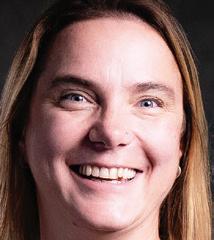
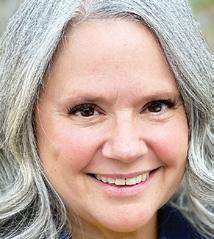
worked hard to develop relationships and build experience and build results.”
Both Kozel and Anundson are progressive candidates and are closely aligned on a number of issues.
While Kozel said her two years’ experience gives her a leg up, Anundson said, because she’s the mom of a current student, she has a better eye on the day-today needs of students and families, such as addressing bullying. She said many parents don’t know who to go to when their child is bullied and advocated for a districtwide policy update to both educate parents and ensure each school follows the same practice.
“We definitely need to have a process that’s the same, so it would be talking to the superintendent and board and creating a committee to figure out what that policy looks like,” she said.
Kozel’s campaign priorities mostly surround ongoing initiatives of the Spokane Public Schools board, like continuing to get kids off their phones and fostering belonging in schools through clubs, something she said is more critical to student success than many may realize.
“That sounds so pie-inthe sky, but it’s so important for kids to have that sense of belonging,” Kozel said. “ Those belonging relationships are so critical so if we don’t provide those spaces in real life, in person, then
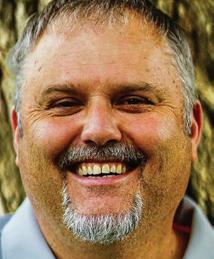
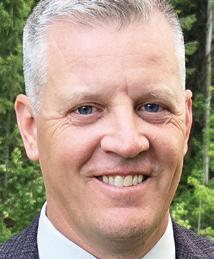
to be drawn between Woodworth and Kolodrub is their stance on social issues, like how involved the board should be in the ongoing debate about transgender athletes’ sports participation.
The Mead School Board has been the most outspoken in the region in its alignment with the federal government in seeking to limit girls’ sports to those assigned female at birth. State law allows trans kids to play on teams that match their gender identity. While the board follows state law in this area, they’ve sent letters to the federal government, joined a lawsuit against the state and passed resolutions expressing their stance that trans girls should not play on girls sports teams.
Woodworth agrees with the current board’s actions, though it’s not a “primary” issue for him, he said, preferring to focus on academics and opportunity over “cultural issues.”
“Having two daughters and wanting them to have every opportunity to be successful, I’m definitely a fan of that, and I would have a hard time with biological boys being in girls sports,” he said.
Kolodrub said if elected, he would follow state law that prevents exclusion of trans kids in sports rather than attempt to follow the federal government’s directives thus putting state funding at risk.
“We’re here to follow the rules of Washington state. I’ll be blue in the face saying that, because that’s the reality,” Kolodrub said. “Now, people have their own views. I have my own views on stuff. This is what the law currently says, and our job is to follow the rules.”
A leader in committees surrounding previous tax asks in the district, Kolodrub said he is “100% yes” on asking voters for property tax collections through
they’ll find it online.” Both candidates said they supported the “Together Spokane” initiative involving the district’s $200 million bond and the city parks department’s $240 million levy, which would partner for a number of projects if both tax measures pass.
“I’m in huge support,” Kozel said. “This is, I think, just a once in a lifetime opportunity.”
Anundson said she’s supportive, eyeing the needs of aging schools like Adams Elementary, but said she’s not on board with the whole proposal. She declined to elaborate on what she wouldn’t be in favor of.
“I’m completely supporting this bond because we can’t wait,” she said. “There are parts that I do not like about it, there’s parts that I’ve heard from multiple people that they don’t like about it, but they’re still going to vote for it, because those schools need to be fixed.” Each candidate expressed uncertainty about how schools’ federal funding may be affected under the Trump Administration. A number of grants were frozen or proposed to be cut but have since been restored, including those that pay for English language acquisition, afterschool programs and migrant support, for example. Around 12% of Spokane Public Schools’ revenue stems from the federal government. Asked about how the board should react to potential cuts, Kozel said she’d hope the state would “step up” to fill the gap.
“If we lost federal dol-
See SPS, 13
MEET THE CANDIDATES
Mead School Board District 1
Martin Kolodrub
Age: 49
Residence: Mead
Education: Graduated from Rogers High School in 1995. Graduated from Eastern Washington University with a bachelor’s degree in criminal justice in 2000.
Work Experience: Works as a facility manager at Spokane Regional Health District since 2022. Worked in Spokane County Juvenile Court from 2000-2022 as a work crew officer to manager responsible for the at-risk youth program. Worked in heavy equipment repair for Robert B. Goebel General Contractors from 1995-2000.
Political Experience: First run for office.
Family: Married to Kimberly Kolodrub with two kids who graduated from Mead schools.
Campaign Finance: Raised more than $2,000 as of Oct. 1, according to the Washington Public Disclosure Commission. Contributors include: Mead School Board member Chad Burchard and former Mead School Board member Carmen Green
Tim Woodworth
Age: 52
Residence: Mead
Education: Graduated from South Side High School in Fort Wayne, Indiana, in 1991.
Work Experience: Has worked at Collins Aerospace since 2001, advancing from a manufacturer to now management.
Political Experience: First run for office.
Campaign Finance: Reported to the Public Disclosure Commission raising nearly $7,200 as of Oct. 1. Donors include Mead School Board President Michael Cannon and Dallas Low of Golden Rule Brake.
levies and bonds, though he cautioned if elected he would be frugal with what the board asks for and transparent about what it’s spent on.
“I’m going to inspect what I expect,” he said.
Similarly, Woodworth said he’s in favor of property tax asks as long as he knows and agrees with where the money is going.
“I’m OK with it, as long as it actually goes to increasing opportunities for the teachers of the schools; so little of the budget goes towards those things,” he said.
Departing school board member of 10 years
Burchard said in a recent interview he endorsed Kolodrub as his successor; the two know each other from Kolodrub’s work adjacent to the school district on bond, levy and safety committees.
“He has good ears on what’s going on in the school district,” Burchard said. “I think he’ll represent all of the students and patrons in the school district, and I think he’ll be a neutral voice that looks at both
sides of the issues.” He advised whoever receives the baton to avoid partisanship as the Mead School Board members have grown increasingly outspoken in their conservatism in recent years.
Woodworth has the endorsement of board Vice President BrieAnne Gray and President Michael Cannon, who said Woodworth is a “good thinker” and a leader in his career, two aspects that make an effective school board member, Cannon said.
“In a reasonable and level-headed way, he’s aligned with the actions that the board has been taking this year in terms of parents’ rights and protecting women’s sports, although he hasn’t been a loud advocate in these areas,” Cannon said. No other board members responded to requests for comment. Woodworth has the endorsement of the Spokane County Republican Party. Elena Perry can be reached at (509) 459-5270 or by email at elenap@ spokesman.com.
By Mathew Callaghan THE SPOKESMAN-REVIEW
The Deer Park School District’s bus barn wasn’t built to store any buses, let alone to maintain a fleet of three dozen.
Residents of Deer Park School District will soon vote on a $14.6 million capital levy collected over four years to improve safety, acquire land and address aging facilities in the district, including the transportation center.
If passed, the levy would cost taxpayers an estimated $1.45 per $1,000 of assessed property value, replacing the previous bond that sat at $1.03. This would translate to an increase of about $168 per year for a home valued at $400,000.
Over half of the projected $14.6 million raised from the levy would go toward the transportation center in Deer Park, next to Mix Park.
Kerri Leliefeld, the Deer Park’s transportation director, started first as a bus driver in 1996. She said since she started, the district has added about 10 buses, taking the fleet to 36, to keep up with the growing population in Deer Park – a trend that doesn’t seem to be slowing down. In 2025, Deer Park had a population of 5,226 compared to 4,405 in 2020. That represents an 18.6% population increase.
Leliefeld works along with 40 other employees, including 26 bus drivers, an assistant and a couple of mechanics at a facility that used to be an old lumber mill. The building is nearly 100 years old. The 2.2-acre property was bought by the district for a dollar in the 1970s.
Today, the facility includes a six-bay garage for mechanics, a covered carport for four SUVs, a backhoe, an office for Leliefeld and her assistant, a break room, two restrooms, 36 buses, storage space and an area for employees to park their personal vehicles.
The limited space in the gravel parking lot of the center, 4729 W. Spring Creek Road, is only exacerbated with snowfall.
“The thing is,” Leliefeld said, “we can’t fit in here.”
The nearly century-old facility is accessed by a pothole-ridden road that weaves over a creek. Expansion can not occur on the property because the transportation center is surrounded by railroad tracks and wetlands.
During particularly snowy and rainy days, the roof of the transportation center often starts to drip. Mix that drip with a drain that barely works, and Leliefeld said sometimes there’s a couple of inches of water sloshing around in about a 10-by-10 foot area where mechanics should be working.
Not only does the roof of the transportation center leak, it also is so low that mechanics can’t raise a bus up if they need to work on it.
“They have figured out how to do the work,” Lelifeld said. “If they have to pull an engine and different things, they have figured it out, it’s just probably not the safest.”
In different sections inside the transportation center, insulation can be seen falling from the walls. Fumes and other outgases invade Leliefeld’s office and the break room when mechanics are working on buses.
A 15- to 20-foot extension was added onto the mechanic section of the transportation center years ago because buses did not fit inside the bay.
All safety meetings have to happen in the mechanic section of the bus garage, because the office and break room are too small. Any buses inside have to be moved out of the garage.
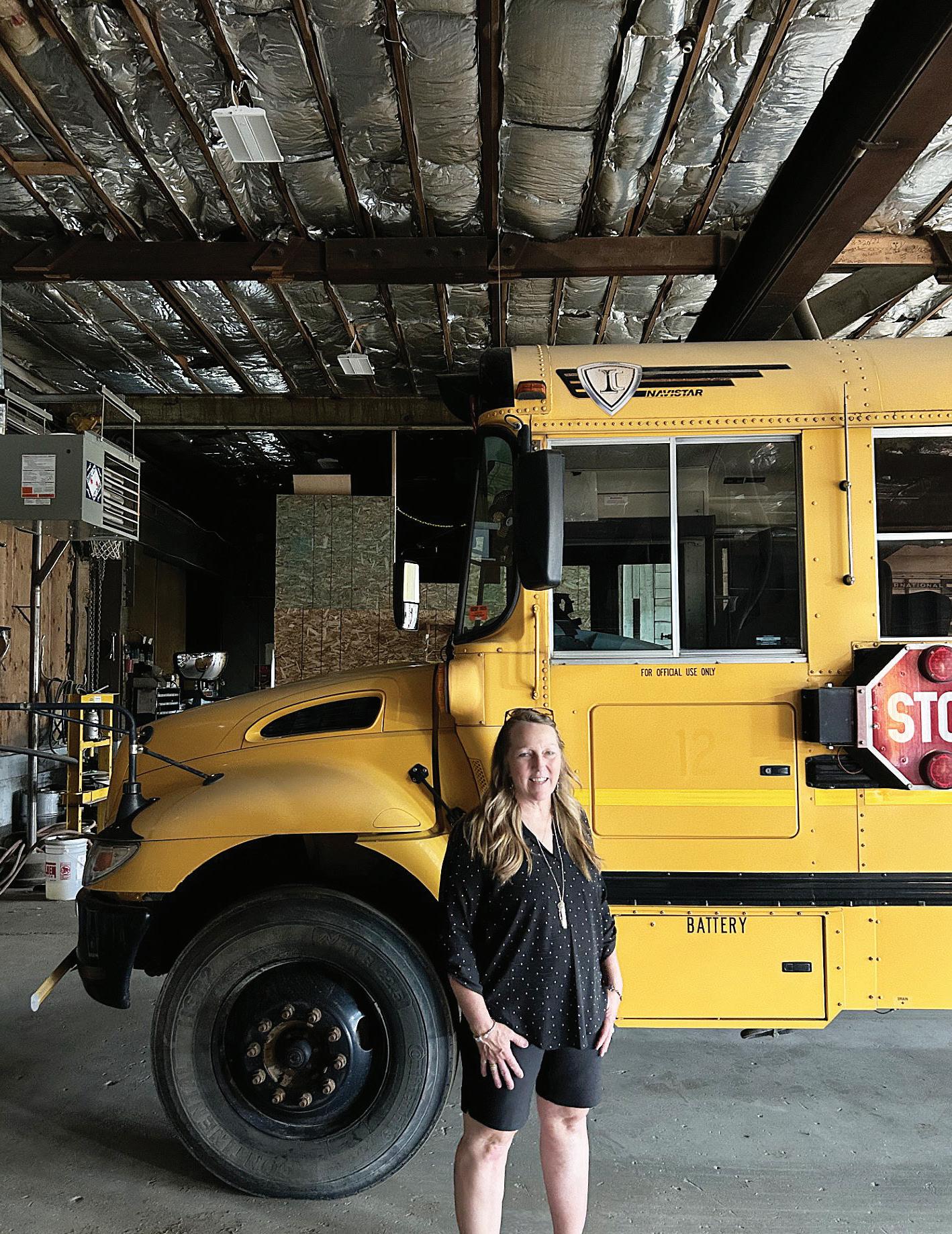
During winter, Leliefeld said the heater makes a lot of noise, so she often finds herself talking loudly just to be heard. One of the main storage rooms, right next to Leliefeld’s office, is affectionately known as “the freezer” because of how cold it gets in the winter.
The confined break room outside the storage room has wires cascading everywhere to charge the tablets that contain the bus drivers’ routes. Lelifeld said they don’t have enough outlets to keep their technology charged, not to mention the poor Wi-Fi.
Angie McBride is a paraeducator for Deer Park HomeLink, a public alternative school mostly for homeschooled children. She’s also on the Levy Oversight Committee and plans to start dispersing “bite-size” pieces of information about the levy on social media. She called a recent trip to the bus barn eye-opening.
She referred to the 36 buses going in and out of the 2.2-acre transportation center twice a day as similar to a game of Tetris.
“It’s just impossible,” McBride said. “So the district has this opportunity to purchase some city land at a greatly reduced market price, which would be for future needs of the district.”
As part of the levy, approximately $5 million would buy and develop a 42acre site close to Deer Park Elementary School. This location would hold the new transportation center. In the future, this 42-acre chunk of land would ideally serve as a new elementary school. But the development of a new school is not included in this year’s levy.
A property appraisal for that section of land valued that 42-acre portion of property at just over $750,000, said Steve Howard, the facilities and maintenance director for Deer Park School District. After negotiations with the city and the City Council, a discounted rate of $385,000 was agreed upon. After surveys, lawyer fees and other miscellaneous expenses, Howard estimates the total cost to acquire that chunk of land would cost around $450,000. The additional $4.5 million allocated for this project comes in the form of new infrastructure.
“The part that is expensive is that we would be the first entity to develop that east D Street property, and so we would be responsible, like any private contractor, we would be responsible for developing the road and the utility infrastructure associated with the road,” Howard said.
According to the latecomers clause, future development completed within the next 10 years along that road would have to reim-
Continued from 12
lars, those would have to come somehow from other sources,” she said. “So whether that means community partnerships, deeper community partnerships upon which we already rely heavily and are so appreciative, we would fight to get that funding however we could.”
Anundson suggested seeking sponsorships or partnerships for existing school expenditures. She said the district’s option programs should be prioritized if cuts come, like the district’s On Track Academy that offers project-based learning in a nontraditional setting.
“I want to be an advocate for them to make sure that those kids don’t fall through the cracks,” Anundson said.
While boards governing the second- and third-highest enrolled school districts in the county, Central Valley and Mead, have been outspoken in their denouncement of the state law that allows transgender girls to play on girls sports teams, Spokane Public Schools hasn’t taken an official stance on the issue.
burse the school district an allotted amount. Howard said this portion of land is some of the only space left in Deer Park suitable for them to build school structures on. Most land in Deer Park is either about to be sold, currently being developed or not able to sustain large, commercial buildings.
In addition to purchasing new land and building a transportation center, $1.8 million of the levy would be devoted to upgrades at Arcadia Elementary. Howard said he first started talking to the district about replacing Arcadia’s roof about 15 years ago. The roof is the original from 1997 and Howard said they work on repairing the roof about six or seven times per winter.
The proliferation of leaks can cause hazardous mold and mildew to grow in between walls. When leaks drip down the wall and potentially into insulation, Howard said they take the “scorched Earth” approach.
“That tends to be a very involved and very expensive process when we have a roof leak that causes that kind of damage,” Howard said. “We try to be very aggressive in our response to that, so that we’re not asking kids or any adults to spend time in a space that’s been affected.”
Other upgrades to Arcadia would include replacing the old heating system with a design that wouldn’t allow wind-driven rain and snow to filter into the building and drip on the gym floor. Replacing worn flooring in stretches of hallways and in classrooms with a more moisture resistant vinyl composition tile and carpet is also a priority. New fencing would also be installed.
“I do believe that if we don’t do it now,” Leliefeld said, “It’s going to be a long time waiting.”
Last year, a majority of district voters supported Deer Park’s proposed $55 million tax which would have paid for the transportation center and to build a new elementary school, but it did not meet the 60% support threshold needed to pass. Howard is hopeful that this levy, which only requires a simple 50 majority to pass will be successful.
“Deer Park hasn’t had a lot of strategic planning as a community over the years,” Howard said, “And so we find ourselves at a point where this is kind of, I think, our last and best hope for land that would be appropriate for us to use for accommodating school growth and school needs, and it would be a shame to miss that opportunity.”
Mathew Callaghan is a graduate of The SpokesmanReview’s Teen Journalism Institute. He can be reached at (509) 459-5437.
Asked whether they’d advocate for a resolution akin to Mead or Central Valley’s, each candidate said no. Kozel said the state law is clear and such a resolution wouldn’t be worth the time.
“We just have a lot of other really important things to talk about,” she said. “Again, it’s nice to have those really clear set policies so that we can declare that students get to identify however they choose.”
Anundson said she wouldn’t support any action that may communicate exclusion of trans kids.
MEET THE CANDIDATES
Spokane Public Schools Board
Jessica Anundson
Age: 41
Residence: Moran Prairie
Education: Graduated from Bellingham High School in 2002. Graduated from Evergreen State College in 2006 with a bachelor’s focused on public policy and community development. Graduated from the University of Redlands in 2014 with a master’s in business administration in sustainable systems.
Work Experience: Has worked on the systems team at the Healthcare Training Fund since 2025. Worked at Geospatial Innovations from 2015 to 2025 in positions from marketing to business development to customer engagement. Worked as a technical coach at Northwest Mutual in 2014.
Political Experience: First run for office. Was vice chair of the Spokane County Democrats in 2012 and treasurer in 2018. Served as a precinct committee officer from 2016 to 2020. Coached campaigners for Washington Conservation Voters in 2008. Has worked on several democratic political campaigns in the region.
Family: Married to Blair Anundson and has one son who attends a school in the district.
Campaign Finance: Reported raising over $7,000 as of Oct. 1, including a $500 donation from City Council President Betsy Wilkerson.
Hilary Kozel
Age: 54
Residence: South Hill
Education: Graduated from Moscow High School in 1988. Graduated from the University of Idaho with a bachelor’s in communication and a minor in Spanish in 1993.
Work Experience: Currently a stay-at-home parent. President of the parent teacher group at Sacajawea Middle School from 2019 to 2021. Sat on the citizen’s advisory committee of Spokane Public Schools. Served in the Wilson Elementary parent teacher group from 2011 to 2018. Worked in banking from 1993 to 2005, first in Boise then Lewiston where she trained tellers, worked in real estate servicing and portfolio acquisition.
Political Experience: First run for office. Appointed to the Spokane Public Schools board in 2023.
Family: Married to Zack Kozel and has two kids who graduated from the district.
Campaign Finance: Reported raising over $10,200 as of Oct. 1, including a $1,200 donation from the state teachers union’s political action committee, $250 each from Spokane Public Schools Board President Nikki Otero Lockwood and board member Mike Wiser.
“We need to make sure we’re feeling safe and everyone’s feeling safe,” I can’t, in good conscience, write a meaningless resolution and watch any student not being included.”
Both candidates are endorsed by the Spokane County Democrats.
Anundson’s endorsements include City Council President Betsy Wilkerson, State Rep. Natasha Hill and the Spokane Regional Labor Council. Kozel’s endorsements include Mayor Lisa Brown, School Board President Nikki Otero Lockwood, and the Political Action Committee from the state teachers’ union Washington Education Association and Spokane Education Association.


Unanimously appointed in 2023, Hilary is running to continue advocating for every child, every day and in every way. She is endorsed by the Spokane Education Association, Spokane Schools Board Chair Nikki Otero Lockwood and many more. Get to know Hilary at
By Elena Perry
THE SPOKESMAN-REVIEW
There will be a new face on the Central Valley School Board.
In a race without an incumbent, one candidate harkened to a previous era of school leadership that he said prioritized kids over political statements, while the other wants to continue efforts of the current board majority, outspoken against state policy and leaning conservative.
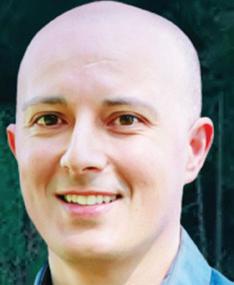
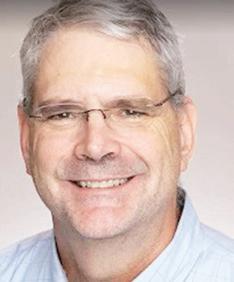
Tere Landa, 77, opted not to seek re-election to spend more time with her aging friends and family and travel with her partner.
Dr. Allen Skidmore, a physician and father of four Central Valley graduates, found he had more time on his hands since his kids flew the nest and is eyeing public office as a way to give back to the staff in Central Valley who helped his kids. He previously served on parent advisory committees at the school district on topics including hiring a football coach and sex education.
He said he’d work to “promote cooperation and less contention” between board members and the community, working to establish better communication.
“The three newest board members seem to be more interested in national politics than they are in our local students,” Skidmore said. “They’re more interested in making a statement of being, whatever you want
Age: 38
Brandon Arthur
Education: Graduated from North Central High School in 2005. Graduated from Washington State University in 2007 with a bachelor’s in biochemistry and a doctorate in pharmacy in 2011.
Work Experience: Works as a systems level employee in information technology and analytics in the pharmacy department of a local hospital system since 2018. Worked as a pharmacist in a critical care unit in Tacoma from 2012-18. Completed his residency at a pharmacy in Indiana in 2011. Opened real estate businesses Streeter LLC and the Property Pelican in 2016.
Political Experience: First run for office.
Family: Married, but declined to disclose the name of his wife. Has one child in Central Valley Schools.
Campaign Finance: Has reported fundraising $6,685 as of Oct. 4, including $2,000 in loans. Donors include $100 from Spokane Valley City Councilwoman Jessica Yaeger.
Allen Skidmore
Age: 56
Education: Graduated from East Valley High School in 1986. Graduated from Brigham Young University in 1995 with a bachelor’s in secondary education with a mathematics emphasis. Graduated from the University of Washington School of Medicine in 1999 with an medical degree. Completed residency at David Grant Medical Center Air Force Base in Fairfield, California, from 1999-2002 and received family medicine board certification.
Work Experience: Has worked at Providence Family Medicine as a family physician since 2012. Physician at Spokane Valley Family Medicine from 2006-12. Family physician at Shaw Air Force Base in Sumter, South Carolina from 2002-06.
Political Experience: First run for office. Precinct Committee Officer for the Spokane County Republican Party from 2012-14.
Family: Married to Shannan Skidmore and has four kids who graduated from Central Valley schools.
Campaign Finance: Promised not to raise more than $7,000 for campaign and does not have to report donors.
to call it, whether it’s proTrump or pro-conservative, or ‘We don’t like what Olympia is doing.’ “
A current district father and pharmacist, Brandon Arthur is mostly compelled to run because of his young daughter in the school district, he said. His priorities include defending parents’ rights to know what their kid is learning and opt children out of disagreeable content, as well as continuing advocacy against transgender girls competing in girls sports.
Arthur praised the direction the newest board members Stephanie Jerdon, Anniece Barker and
Pam Orebaugh are leading the board in areas like fiscal conservatism, budget scrutiny and advocacy to “protect girls sports.”
“I think since they’ve been in, things have improved. Based on my research, it looks like they’re improving,” Arthur said. “So I want to keep that trajectory going and not get back to where we were.”
Here’s how the candidates would approach leading the district if elected in November.
District finances
School board members weigh in on the drafting and approval of district budgets,
setting parameters for administrators to follow and outlining priorities in their spending. Board members also approve ballot items that authorize tax collection.
Arthur listed fiscal responsibility as one of his campaign priorities. If elected, he said he would keep a close eye on district spending.
“There are a lot of things in there that you as a board member do have the opportunity to look at and scrutinize and make sure that the funds are being appropriately allocated and we’re not doing frivolous spending,” he said.
Asked about his support of property tax collections in the form of levies, Arthur said he would need to do more research on what these levies pay for before he would support them.
Generally, educational programs and operations levies go before voters every three years. One passed in February 2024 collects property taxes at a rate of around $2.40 per $1,000 in assessed property value. Taxes collected under this levy make up around 13.5% of the district’s budget, funding staff, curriculum, special education and all extracurriculars, to name a few.
Skidmore was emphatic that levies are critical in funding schools. Maintaining staff levels and supporting activities are key to building a well-rounded education that he said residents come to expect from Central Valley schools.
“I want to keep the schools funded, to keep passing the levies,” Skidmore said. “We need to maintain a good relationship with the community, so that when the time comes that we ask for the voters to pass the levy, that they will be willing to do it.”
Academics and test scores
The importance of state
test scores in evaluating a student’s learning is often debated. Arthur said results were of “utmost importance.”
Asked how he’d propose improving test scores, Arthur said he’d defer to the experts: teachers.
“If this is how we’re going to measure the success of what we’re teaching and what we’re educating our kids on, we certainly need to make sure that the test scores reflect our best work,” Arthur said. He advocated for teaching focused on boosting test scores and topics like personal finance, rather than “controversial” subject matter, like “aggressive” sex education or information on queer identities.
“The current climate now is just a lot of things that are untraditional, that are coming from Olympia and being passed along and being incorporated into the students’ teaching curriculum,” Arthur said. “Those are things that I want to make sure that we’re keeping a pretty critical eye on, to make sure that it’s not anything that I wouldn’t want my daughter to hear or learn in the classroom.”
Skidmore questioned how much test scores reflect a student’s comprehension of learning materials or a measure of post-graduation readiness, something he thinks schools should focus more on.
“It’d be nice to have higher test scores, but I’m not sure that that’s really what we need,” he said. “What we need is to prepare our kids for the next step, whether the next step is joining the military or the next step is becoming a plumber.”
In an effort to get kids
By Elena Perry
THE SPOKESMAN-REVIEW
The challenger in a race for Central Valley School Board seeks to end division in the community over what he characterizes as politically motivated actions by the board.


Incumbent Pam Orebaugh, a nurse educator and former nurse, is vying for a second term on the board to continue her role as a “bridge between the district and the community,” she said, pushing back against disagreeable state directives, keeping a scrupulous eye on district spending and taking a public stance to “protect girls sports” and parents’ rights.
“We’re not elected to represent the state. We’re not elected to represent the district, even. We are elected by our community to be that bridge between the community and the district,” Orebaugh said. “We go back and forth over the bridge, bringing concerns and teaching our public and bringing it back to them.”
Challenger Mark Bitz runs with “no political agenda,” he said, and is prioritizing boosting trades education in Central Valley schools, a passion of his garnered through years as a founding teacher at Spokane Valley Tech and an engineer at Hewlett-Packard. He said the education landscape is changing, and he would like to see schools offer more career and technical education that would prepare kids for the workforce and teach them academic skills in a way that appeals to them. He touts connections in local industry that could help him bring more worksite-based
MEET THE CANDIDATES
Central Valley School Board
District 5
Mark Bitz
Age: 67
Residence: Liberty Lake
Education: Graduated from Big Sandy (Montana)
High School in 1976. Earned a bachelor’s in mechanical engineering from Montana State University in 1981. Earned a master’s in teaching from Whitworth University in 2011. Earned a career and technical education certification from Eastern Washington University in 2014.
Work experience: Retired public school teacher.
Worked from 2010 to 2023, including 10 years as a manufacturing, engineering and physics teacher at Spokane Valley Tech. Worked at Hewlett-Packard from 1981 to 2009 in several roles, including a patented inventor, quality auditor, business system design, project management, team director and research in development. Managed his family’s wheat farm during summers through high school and college. Volunteered in his kids’ schools from 1990-2001. Volunteers as a Central Valley High School mentor since 2024. Sits on the Spokane Nordic Ski Association board.
Political experience: First run for office.
Family: Married to Jane Bitz. Has two children who graduated from Central Valley schools.
Campaign finance: Reported raising $26,521 as of Wednesday, including a $450 donation from current Central Valley board member Tere Landa, $250 from former board member Tom Dingus and $1,750 from the Washington State Democratic Central Committee.
Pam Orebaugh
Age: 55
Residence: Liberty Lake
Education: Graduated from Big Sky (Montana) High School in 1988. Earned a bachelor’s in nursing from the University of Hawaii in 1992. Earned a master’s in nursing with an education emphasis from Aspen University in 2020. Political experience: Elected for seat on the Central Valley School Board in 2021.
Work experience: Works as a nurse educator since 2017, but declined to say at which institution. Previously worked as the lead faculty nurse educator for obstetric nursing at the Washington State University College of Nursing.
Worked as a flight nurse for more than 10 years, and other roles as a registered nurse in units including neonatal intensive care unit, pediatric intensive care unit, emergency room and labor and delivery. Volunteer experience includes three years as a lead medical volunteer at a local church. Sits on the board for Clinical Placements Northwest.
Family: Married to Chad Orebaugh. Has five children who have attended Central Valley Schools, the youngest still enrolled in the district. Has three grandkids.
Campaign finance: Reported raising $7,567 as of Wednesday, including $160 from Jeff Brooks, who lost a race for a seat on the Central Valley School Board in 2023.
learning to Central Valley.
“Giving kids focus and then giving them the tools and the framework to run with, it’s magic,” Bitz said. “I uniquely bring that to
the board, and I’m not bragging; it’s because of my life experience.” Bitz and Orebaugh advanced from the only school board primary in
the county. The two eked ahead of Rob Linebarger, chair of the Spokane County Republican Party, who endorsed Orebaugh after his loss.
Here’s how the candidates differ on topics facing the Central Valley School Board.
Depending on who you ask, transgender athletes’ participation in sports is either irrelevant or among the most important topics facing the school board.
Bitz said people rarely ask him about his position when he is door-belling, while Orebaugh said it is one of the most frequent queries.
The Central Valley School Board has made its position clear, sending letters to the federal government imploring an investigation and expressing its confusion in conflicting directives from the state and federal government. The board also approved joining a potential lawsuit against the state authority on the matter.
Bitz questioned whether these actions were worth the time, as the feds were already investigating the state. He said he would follow the state law that allows trans kids to play on whichever team with which they identify. If that law changes and he is in office, he said he would work with the board to be in compliance.
“These actions that the board took changed nothing in policy and wasted valuable board time that could be spent on problems and improvements within the board’s control,” Bitz said. “They deepen the division in our community, and worst of all, they alienate CVSD students. Our district is no place to fight political battles.”
Asked what he would rather spend time discussing, Bitz said trades education and school safety.
“We’re not trying to im-
prove our schools, and they need some work,” Bitz said. “Education has really changed – the need for it to be relevant to what the workplace and citizenship needs are today.”
Orebaugh is steadfast that a firm stance on transgender athlete participation is well worth the board’s time. It fits her role as a school board member, reflecting the community’s values as their elected representative, and defending the “true spirit” of Title IX.
“There’s a lot of female athletes who have come to talk to us or parents or that I know of girls, and they’re just discouraged, like, ‘Why do I even compete anymore? The best I can do is second place,’ ” Orebaugh said.
Orebaugh said her stance is not meant to discriminate against transgender students. She is in favor of opening a third co-ed category in school sports, open to all sexes and gender identities while limiting the girls category to those born female.
“I truly believe we have to protect biological girls sports, just for biological girls,” Orebaugh said. “What that looks like to give everybody a place to play, I think we really need to have some good, constructive, not hateful conversations about.”
There are an estimated five to 10 transgender student athletes in the state, according to the Washington Interscholastic Activities Association, among a quarter-million student athletes.
Both Orebaugh and Bitz said a productive conversation is in order, pointing to division the topic has brewed among their community. Orebaugh said she has been name-called in public comments at meetings, and Bitz pointed to public comments from students speaking in support of their transgender friends, who feel “alienat-
ed” by the board’s actions. Academics, test scores Both candidates said state test scores do not necessarily reflect achievement, saying other ways are available to measure student success and boost academics.
While Orebaugh has sat on the board, the district has made a few changes surrounding teaching, including establishing “professional learning communities” wherein all teachers of each grade level and subject convene at least weekly to compare teaching strategies and student work.
She is also satisfied with a recent move to standardize curricula across the district so that each grade level and subject area teaches the same content along the same timeline. It keeps learning consistent, she said, with mixed feedback from teachers.
“It was quite a firestorm, especially from the teachers who have been with us for a long time, like, ‘It’s my autonomy, and I’m an educator,’ ” Orebaugh said. “We’re like, ‘Great, but you’re not a curriculum developer, so you’re not going to develop your own curriculum.’ “
To improve student success, Bitz advocated for a more diverse selection of course offerings that reflect students’ career goals so they can see how learning materials would apply in their career of choice. The district should “offer a buffet of opportunities” for students, he said.
“They can explore and choose pathways relevant to their futures,” Bitz said. “Now, CVSD is already a long ways down that road because we’ve got a variety of learning opportunities, but I think we can improve those by expanding career-specific and trades education. And again, this is firsthand experience in leadership and execution
By Mitchell Roland THE SPOKESMAN-REVIEW
Like so many things in life, the Cheney School District is experiencing the proverbial growing pains that come with expansion.
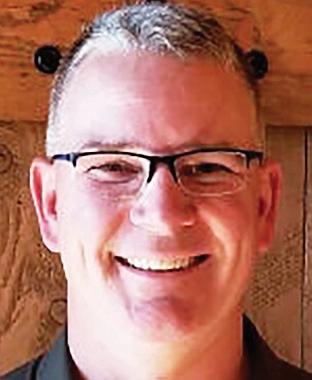
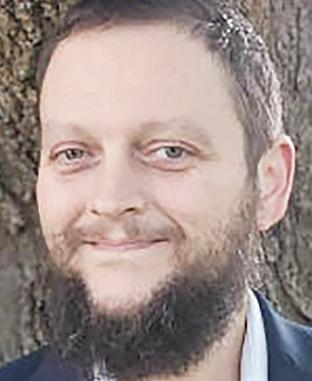
Last year, voters signed off on a school bond that will allow the district to welcome a new school campus and make improvements throughout the district.
Months earlier, the Cheney School Board reached an agreement on a three-year contract days before the start of the school year that avoided a potential strike.
But with a service area of 380 square miles, the largest in Spokane County by size, and with the fourth highest student population in the county, current school board member Mark Scott said it’s been a challenge to maintain a unified identity during its growth.
Meanwhile, despite the new contract, the man running to replace him on the board said some teachers in the district still need a second source of income beyond their district salary.
The race to represent District 1 on the Cheney School Board pits incumbent Scott against challenger Kyle Belock in a race that will help shape the district’s growth going forward.
Four years after he secured a seat on the board by defeating an incumbent by nearly 10 percentage points, Scott serves as president of the board and represents Area 10 for the Washington State School Directors Association, a region that
MEET THE CANDIDATES
Cheney School Board District 1
Mark Scott
Age: 48
Education: Graduated from Springdale High School.
Earned applied sciences in law enforcement degree from Spokane Community College, bachelor’s degree in education from Whitworth University and master’s degree in public administration from Central Michigan University.
Work experience: Part-time and full-time teacher in Washington and Idaho for five years. Has served in the Washington Air National Guard since 2011.
Political experience: Elected to Cheney School Board in 2021.
Family: Married, but declined to name spouse. Has three children in Cheney School District.
Campaign finance: Raised $4,660, spent $2,685 as of Oct. 3, according to the state Public Disclosure Commission.
Kyle Belock
Age: 39
Education: Graduated from North Thurston High School. Earned bachelor’s in geology from Eastern Washington University. Currently a third-year law student at Gonzaga University.
Work experience: Army veteran. Deputy Court Clerk at the Spokane County Courthouse. Works as a wellsite geologist.
Political experience: First run for office.
Family: Married to Jacquelyn Belock. Five children and one due soon.
Campaign finance: No donations or expenditures reported as of Oct. 3.
includes districts south of Cheney and Spokane.
Scott said he’s running for re-election for the school board because he wants to “continue to help lead the Cheney School District in the right direction and help students be as successful as possible for their future and the demands of being a successful citizen.”
To accomplish this, Scott said the district should “hold students to high standards” and ensure the district has a partnership with parents. Scott said it’s important to protect the rights of parents to access their student records and be involved in their child’s education.
“I think it’s really important to partner with parents and make sure that par-
ent involvement and their rights are protected,” Scott said.
The Cheney District, Scott said, has “room to grow” in taking a more proactive approach to parent involvement.
Scott said the district’s primary educational focus should be on the “basics of education” to ensure that students have the “foundational skills” of reading, writing and math.
“And that they’re building their social skills so that they can be as successful as possible in whatever endeavor they choose,” Scott said. “Higher education, community service, military and, obviously, the trades are in high demand.”
Scott said he would like to see the district expand
By Mitchell Roland THE SPOKESMAN-REVIEW
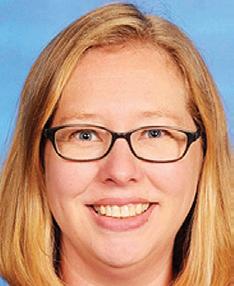
When voters in the Cheney School District submitted their ballots a year ago, they signed off on a bond proposal that will shape their district for decades to come. The $72 million plan calls for a new elementary school in Airway Heights, which will help reduce overcrowding at Sunset Elementary and fund other infrastructure upgrades throughout the district.
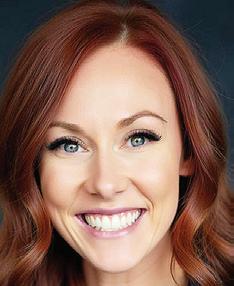
Now, as they return to the polls a year later, residents will decide who they want to represent them on the school board. For one seat, District 2, voters will decide between two moms with children in the district who say they want to expand students’ access to the courses that best fit them. First appointed to the school board in June 2023, incumbent Elizabeth Winer was later elected to serve in November of that year. She faces Jessica Davis, the co-owner of Wolffy’s Breakfast Burgers and Brew.
After a little more than two years on the board, Winer said she’s “learned a lot about what a school board does and what school boards can do to advocate for students at the state level.”
Now, as she gears up for her re-election bid, Winer said she’s focused on “increasing a sense of be-
MEET THE CANDIDATES Cheney School Board District 2
Elizabeth Winer
Age: 41
Education: Graduated Garber High School in Michigan in 2002. Graduated from Central Michigan University with a bachelor’s in secondary education in 2007. Graduated from University of Findlay with a master’s in education in 2013.
Work experience: 14 years of teaching full time.
Currently a high school science teacher at Insight School of Washington, an online school based in Tacoma, since 2018.
Previously taught four years at a career and technical high school and two years at a traditional high school in Ohio.
Political experience: Appointed to board in June 2023.
Family: Married to Mike Winer. They have two children in Cheney School District.
Campaign finance: Raised $1,180.00, spent $1,005 as of Oct. 1, according to the state Public Disclosure Commission.
Jessica Davis
Age: 37
Education: One year at Eastern Washington University. Siuslaw High School in Florence, Oregon.
Work experience: Co-owner of Wolffy’s in Airway Heights. Volunteer firefighter with Airway Heights Fire Department.
Political experience: First run for office.
Family: Married to Dustin Davis. They have five children in the district.
Campaign finance: No donations or expenditures reported.
longing for our students,” particularly between the communities of Cheney, Airway Heights and the West Plains.
“And I feel like there’s not the unity that there could be,” Winer said. “And research has shown that when students have that sense of belonging, they are much more likely to engage, and therefore achieve more in their personal academic pursuits.”
To accomplish this, Winer said she wants to expand Career and Technical Education courses in the district, something she said she’s seen the benefits of firsthand in her teaching
career. “I know that students don’t all learn the same way and each student has different needs, and we need to try to meet those needs as best as we can to serve each student the way they deserve,” Winer said. Over the past two years, Winer has served as the board’s legislative representative, which she said has given her insight into the Legislature and how districts are funded. During the recent session, Winer said she worked with other board members to increase funding for
Cheney, the West Plains and Airway Heights as “we move forward and continue to grow.”
“We’ve had to meet challenges like bus loops, and drive times and start times for schools, that’s something that we’re continuing to look at, trying to make it amendable and the correct schedule for school start and stop times, and school buses,” Scott said. “It’s challenging. But I think that if we’re committed to having a unified sense of ourselves as a community, the Cheney School District is ready for it.”
a school board member is to “hire and take care of” a large group of employees, and rely on their expertise to help guide the district, which includes a focus on mental health. While he was “hesitant to talk about adding additional resources” without doing a deeper dive on the district’s finances, Belock said “it is important to increase the percentage, without raw numbers, to increase the percentage of whatever we’re doing towards mental health care for our students.”
its offerings in career and technical education, which he said allows students to explore potential career paths, and suggested potential courses in computer science, welding, building, and plumbing and electrical.
“There’s lots of different avenues that are encompassed under that umbrella,” Scott said. “I think it’s important to give our students the opportunity to have exposure in those areas.”
The district is likely to see continued growth, particularly after voters approved a $72 million bond in the 2024 election, money that will be used to build a elementary school and fund upgrades in the district.
“I’m proud of our board for getting the bond passed and we’ll build a new school and purchase some more land for our district,” Scott said. “And really working hard to unify our three distinct communities, because the Cheney School District is such a large geographic area. I’m really proud of those achievements.”
The expansion of the district, Scott said, will make it challenging to build a sense of community between
A first-time candidate and a father of five with one more on the way, Belock said in an interview that his candidacy was an “intentional decision” and that he “gave it a lot of thought.”
“I think we’ve got to work on communication,” Belock said. “And support for unions. That’s really, that’s what I’m about.”
The decision, he said, ultimately came down to a perceived lack of interaction with the school board and a desire to repair the “growing disconnect” in the district, something he said his family has experienced firsthand and something he’s heard from other families as he’s campaigned.
“The reason I’m running for school board, primarily, is I feel like I need to support or restore some kind of communication between the school board and parents.”
To do so, Belock proposed holding listening sessions so families could provide feedback.
“I would like to find some way to restore that communication so that folks can feel like they can report things, not necessarily in public, but I want to restore that ability to reach out to people individually,” Belock said.
Belock said the role of
“I think we all need to trust mental health experts, medical health experts and other professionals,” Belock said. “And largely speaking, they agree that mental health care is important, and it’s important for students’ growth and well-being. And I’d like to think that as parents, we can agree on that. So just generally being supportive of all of our students.”
A self-described “full, proud union supporter,” Belock said he was also frustrated by protracted negotiations between the teacher’s union and the district, which threatened to delay the start of the 202425 school year. While union members voted to authorize a strike, an agreement was reached just before the first day of school, averting the potential for picket lines outside school facilities.
Belock said he became frustrated after his son told him this summer that some teachers in the district have picked up second jobs or do gig work to make ends meet, something he said was “weird to hear.”
“I don’t feel like our hourly employees, as well as our teachers, are getting the support that they need,” Belock said. “And I’m aware that there are a fair amount of problems with turnover rates as well, and losing employees to the larger region.”




By Mathew Callaghan THE SPOKESMAN-REVIEW
An incumbent who’s been on the school board for the past 25 years and a first-time candidate are the choices voters have for a seat on the Riverside School Board.
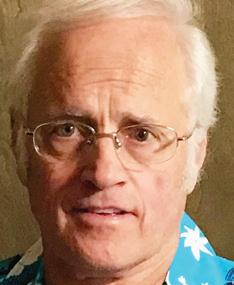
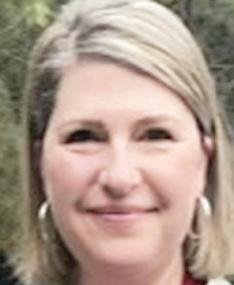
Gary Vanderholm, 72, started serving on the board in 2000 because he felt like it was important to give back to his community, just like someone close once did for him: His dad served on the same board for about 10 years while he went to school.
Sarah Ramsden, 48, is a speech language pathologist at Mt. Spokane High School. Three of her four kids have either already graduated from or are about to graduate from Riverside High School. She said she’s running to provide a fresh voice and unique perspective to the board.
Both candidates’ biggest priority revolves around ensuring that school spaces are safe and healthy places for students to learn. A five-year, $18 million capital levy on the ballot for November would charge residents of the district $1.45 per $1,000 of assessed property value. If passed, the proposition would upgrade safety and technology. Most of the money, just over $16 million, would be devoted to replacing outdated HVAC systems.
MEET THE CANDIDATES
Riverside School Board
Gary Vanderholm
Age: 72
Education: Graduated from Riverside High School in 1971. Spent half a year at Spokane Falls Community College. Spent another year at Rick’s College in Rexburg, Idaho. Never graduated with a degree.
Work experience: Retired from owning his own farm and seed supply business. Owned Deer Park Feed and Seed, along with Newport Feed and Seed before he was forced to retire because of health issues about 15 years ago. Spent time working for other seed companies in the area.
Political experience: Has been on the Riverside School Board for the last 25 years.
Family: Married to Thelma Vanderholm. The pair have eight children, 36 grandchildren and one great grandchild.
Campaign Finance: None.
Age: 48
By Nina Culver FOR THE SPOKESMAN-REVIEW
There’s a confusing twist in a race for a West Plains fire commissioner.
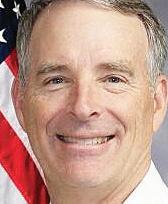
Sarah Ramsden
Education: Went to high school in Sitka, Alaska.
Received her bachelor’s degree from Whitworth University. She did one year of post-baccalaureate at Eastern Washington University to turn the degree into an emphasis on communication disorders. Received her master’s degree in communication disorders from Eastern Washington in 2013.
Work experience: Worked as a bank teller for a time, but most of her jobs have been in education. Was a speech language pathologist in the Riverside School District for about seven years. Currently is a speech language pathologist for Mt. Spokane High School.
Political experience: First run for office.
Family: Married to Cody Ramsden. They have four children, three of whom graduated or are about to graduate from Riverside. Campaign Finance: None.
Vanderholm said the HVAC issue has been a problem across all the schools in the district since he joined the school board. The HVAC system has been troublesome recently, as temperatures reached 85 degrees in some classrooms. The Wednesday, Thursday and Friday
following Labor Day were half days because of the high temperatures inside
By Mathew Callaghan THE SPOKESMAN-REVIEW
Residents of the Riverside School District will soon vote on a five-year, $18 million capital levy that centers around safety, security, technology and HVAC improvements.
Ken Russell, district superintendent, said the new capital levy on the ballot for Nov. 4 is designed to address only the most basic and urgent needs for Riverside schools.
Last year, voters rejected a 25-year, $73 million bond that would’ve funded major construction projects. That bond, which required a 60% supermajority to pass, included modernizations, upgrades and additions at every school in the district. The new capital levy, which requires a simple majority of 50% plus one to pass, would make the tax rate $1.45 per $1,000 of assessed property value compared to the proposed 2024 bond that would’ve been $2.05 per $1,000.
“We’re trying to do a great job of providing a high-quality education for our students, but we’re also trying to be really thoughtful and responsive to our voters, our taxpayers and our neighbors,” Russell said.
Russell said going from a 25-year, $73 million bond to a five-year, $18 million
capital levy is like going from a home loan to a car loan. After deliberations with members of the community, Russell and others in the district believe that this year’s levy is a refined version of the old bond that focuses on the must-haves, rather than the nice-tohaves.
The big items are the heating and cooling systems across all the schools. A little over $16 million of the $18 million capital levy is dedicated to upgrades and replacing the aging HVAC systems. Russell said much of the HVAC equipment in the district is at least 30 years old, which makes finding parts and locating technicians to fix different aspects of the HVAC system a headache.
“This is a long-term issue that we’ve had,” Russell said, “And our maintenance team has really worked hard and done a great job of keeping it going and maintaining it, but we’re just to a point where we’re at the end of life in our systems.”
Tyler Rohrman is going into his fourth year as a teacher at Riverside High School. He teaches world history to sophomores, advises the leadership class and instructs a study skills class. In recent weeks, Rohrman has witnessed the effects the poor HVAC system has had on him and his students.
Rohrman said the Wednesday, Thursday and Friday following Labor Day were all half days because of the blistering heat inside of classrooms.
Temperatures regularly reached upwards of 85 degrees across numerous classes. Rather unsurprisingly, Rohrman said that kind of heat makes teaching a difficult task.
Because of the half days his classes took, Rohrman’s been forced to tweak and condense lessons.
“It’s a distraction from learning,” Rohrman said. “As a teacher, I kind of think about Maslow’s hierarchy of needs. You think about having your basic needs met. And if your core body temperature is elevated all day and you’re trying to learn and you’re uncomfortable, I think it just makes it hard to be able to lock in or sit at the desk and absorb information and learn when your brain and your body is just kind of cooking.”
If the levy doesn’t pass, Rohrman said he definitely will be paying for an air conditioner for his classroom out of his own pocket. The stuffy and hot atmosphere that Rohrman’s students had to endure the week of Labor Day made students much quieter than they normally are, with vacant expressions
One of the candidates for a Spokane County Fire District 3 fire commissioner seat has since been appointed to fill a different vacant seat on the board but is continuing his run for the seat for which he filed.

Tim Flock and Mike Meyer were two of three candidates who filed in May for the seat currently held by Sharon Colby, who has served on the board for 34 years. Colby did not file for re-election. But later that same month, Commissioner Bob Harris stepped down from his seat.
Flock, Meyer and their other opponent, Kent Reitmeier, were all considered for Harris’ seat after the remaining commissioners asked the trio if they would be interested.
“The three of us interviewed, plus three other community members,” Flock said. “It was kind of unexpected. The three of us were sitting in the meeting when it was announced it was Bob’s last meeting.”
Flock was appointed to fill the remaining two years of Harris’s term, but said if he wins the election for Colby’s seat, he will resign from Harris’ seat, and the commission will appoint someone else to serve the remainder of that term. Flock said the circumstances have been a little confusing for some residents.
“It’s been hard to explain that to people,” he said. In the August primary, Flock won 56% of the vote. Meyer also advanced to the November election by coming in second with 33%.
Flock, who served for 28 years in the Air Force and Air National Guard before retiring, has also been a volunteer firefighter for decades. He volunteered with District 3 for the last 12 years, most recently as a battalion chief. Flock said he resigned from that position two weeks after he was appointed to the board of commissioners.
“It was kind of a conflict of interest being on the command staff and on the board,” he said.
Meyer, who also retired from the Air National Guard after a lengthy career and has been a volunteer firefighter with District 3 since 2010, said he’s running for Colby’s seat because he wants to make a difference.
“It’s one thing to sit on the sidelines and say things,” he said. “It’s another thing to enter the fray and try to do things.”
Now 71, Meyer said being a volunteer is getting more difficult and serving on the board will allow him to still contribute.
“My noggin is working just fine,” he said. “I just can’t carry a 200-pound person out of a burning house anymore.”
Meyer said he hopes to create strong relationships with firefighters and the public.
“Relationships are important to me,” he said. “It’s firefighters who get the job done, not equipment.”
District 3 is experiencing a lot of growth, and Meyer said the district needs to concentrate on staffing and training, particularly for medical calls. He would like to see the district hire more advanced emergency medical technicians and paramedics.
MEET THE CANDIDATES
County Fire District 3 Position 1
Mike Meyer
Age: 71
Education: Graduated high school in 1972 in Waupaca, Wisconsin. Earned an associate degree in applied electronics from the Air Force. Served in the Air Force Air National Guard from 1972 to 2010, retiring as a chief master sergeant.
Work experience: Served 37 years in the Air Force Air National Guard, retiring as a chief master sergeant and second in command of a combat communications squadron in Spokane. Has served as a volunteer firefighter for District 3 since 2010.
Political experience: First run for office.
Family: Married to Dev Meyer. Has two adult children. Campaign finance: Has promised the state Public Disclosure Commission that he will not raise more than $7,000 and is not required to report contributions.
Tim Flock
Age: 62
Education: Graduated from Mt. Eden High School in Hayward, California, in 1982.
Work experience: Has been a volunteer firefighter for 32 years, most recently spending 12 years with Fire District 3, reaching the rank of battalion chief. Served 28 years in the Air Force and Air National Guard from 1982 to 2010 as a KC-135 boom operator, ultimately becoming the chief boom operator. Previously owned a small weekly newspaper in Tekoa, Washington, the Standard Register, as well as a newspaper called the Country Neighbor.
Political experience: Appointed to a vacant seat on the Fire District 3 board of commissioners in May. Served as Tekoa Park and Recreation Commission chairman, 1989-95.
Family: Married to Miriam Flock. Has five children.
Campaign finance: Has promised the state Public Disclosure Commission that he will not raise more than $7,000 and is not required to report contributions.
“More than 70% of our calls are medical,” he said. “We need to put our emphasis where the need is. That’s only going to get worse as the West Plains gets more and more populated.”
Flock said staffing is an issue in District 3, just like it is in many districts. District 3 is a combination district, using 36 paid career firefighters and dozens of volunteers.
“We have been seeing a decline in volunteerism nationwide,” Flock said. “Of course, the call volume has been spiking.” In response, the district has been changing how it recruits volunteers, he said.
Firefighters usually have training in EMS, structure fires and wildland fires. But in the past couple of years, the district no longer has required volunteers to have training in all three areas. People can now volunteer even if they only have training in one or two of those areas, and they only respond to the calls for which they have training.
“We take volunteers now in any one of those positions,” he said. “We’ve come a long way, in that respect.” Flock said he also wants the district to add more paramedics. There are three paid firefighters who are also paramedics and four or five volunteer paramedics. That is not enough to cover all 11 stations in the district, which sprawls out more than 570 square miles.
“Ninety percent of the time we have a paramedic on duty at the station in Medical Lake,” Flock said.
“It’s significantly higher than it used to be.”
The district is working toward a four-corner model, which would involve staffing in the four cor-
ners of the district, Flock said. Currently there are crews staffing the stations in Medical Lake and Four Lakes, while Station 31 in Cheney is typically staffed by a battalion chief.
“Eventually, we hope to have Station 36 in Spangle staffed,” Flock said. “We’re working toward getting more staffing. The biggest challenge I see is staying in touch with the taxpayers and what they want.”
While more staffing is the goal, the district has yet to identify funding for more firefighters, Flock said.
“There’s not a clear path forward to manage this,” he said. “It’ll be a conversation we have to have with the community.”
Flock, who received 883 more votes than Meyer in the primary, said he hopes voters will elect him so he can have a full six-year term to fully settle into his new role.
“Two years isn’t long to get my feet underneath me, even with my time as a battalion chief,” he said. “It’s a different perspective.”
Flock said that while he knows most of the firefighters in the district, he has been working to introduce himself to community members, as well as maintaining his relationships with district staff. He has been visiting stations regularly.
“My goal is to go in and see them twice a month and make sure I’m available to them,” he said.
Meyer said he believes he has the leadership and financial skills necessary to serve on the board.
“I have a heart for my neighbors,” he said. “As a commissioner, that love I have for my neighbors I will take to the next level all across the district.”
By Nina Culver FOR THE SPOKESMAN-REVIEW
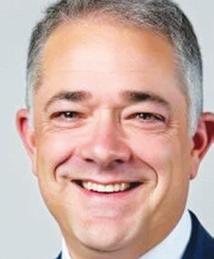
Recently retired firefighter Dan Garner has launched a challenge to Spokane County Fire District 4 commissioner incumbent Roger Krieger, pulling in just over 100 votes more than the incumbent in the August primary. As the November election approaches, the two are each campaigning on the strength of their experience.
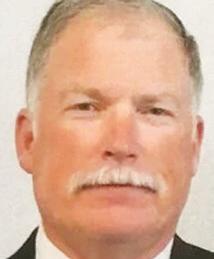
Krieger, the current chairman of the board of fire commissioners, has been a volunteer firefighter for more than four decades, first in Petersburg, Alaska, and then in District 4. Garner recently retired from Spokane County Fire District 9 after nearly 30 years, having been a firefighter, paramedic and station captain.
Krieger was first appointed to his fire commissioner seat in 2011, then elected.
“I’ve always just wanted to be involved in the district and service,” he said.
Krieger, 69, said he’s too old to be a volunteer firefighter now, and continuing his time on the board was a way to still serve the community he’s lived in for decades.
Though Garner retired in 2023, he still volunteers as a water truck driver. He also teaches wildland firefighting at Spokane Community College and sometimes serves on wildfire incident management teams on large fires in the area.
“I just feel my many years of frontline experience brings an important perspective to the board,” he said. “I’m not really a politician. I’m a firefighter. But I want to continue to serve.”
One of the issues on which the candidates differ is staffing. Fire District 4 sprawls across 330 square miles, including the communities of Chattaroy, Deer Park, Elk and Colbert. The district responds from 10 different stations.
In years past, the district relied heavily on volunteer and part-time firefighters, having about 140 volunteers at its peak, Krieger said. In recent years, however, the number of volunteers has dropped sharply and while the district still has some, it relies heavily on 40 full-time firefighters. Each station is typically staffed with two firefighters.
Garner said his concern with the staffing level is that, by law, three firefighters must be on the scene before anyone can enter a burning building, whether that’s to fight the fire or rescue someone trapped inside. Krieger argues multiple engines are always sent to working fires, so that shouldn’t be an issue.
“There’s always enough staffing when everyone gets there,” he said.
Garner argues that, because the stations are spread out from each other, it takes time to get two crews to the incident.
“You’re talking time,” he said. “It depends on where the second engine is coming from when minutes matter.”
The district spends $5.6 million of its $14.7 million annual budget on staffing, Krieger said. While he would like to see more staffing as well, it’s just not feasible for the district to find an additional $2.8 million to add 20
By James Hanlon FOR THE SPOKESMAN-REVIEW
The race for a Reardan-Edwall school board seat is a friendly contest between two district parents who agree either of them would be a good fit.
Rose Krause, 45, was appointed to fill a vacancy on the board in June. Her opponent, Mark Lassman, 41, also interviewed with the board for the position.
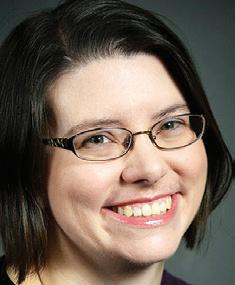
MEET THE CANDIDATES
Spokane County Fire District 4 Commission Position 1
Roger Krieger
Age: 69
Residence: Deer Park
Education: Graduated from Deer Park High School. Earned bachelor’s in education from Eastern Washington University.
Work experience: Worked for 32 years as community service director of the city of Deer Park. Prior to that worked for the government of Petersburg, Alaska, for 10 years. Served as volunteer firefighter for 18 years in Petersburg, Alaska, and Spokane County Fire District 4.
Political experience: Incumbent fire commissioner for Spokane County District 4 and current board chairman.
Family: Married to Lesli Krieger. Has two children and five grandchildren.
Campaign finance: Has promised the state Public Disclosure Commission that he will not raise more than $7,000 and is not required to report contributions.
Age: 57
Residence: Colbert
Dan Garner
Education: Graduated from Auburn High School. Has an associate degree in fire science technology and an associate in advanced life support from Spokane Community College.
Work experience: Retired in February 2023 after over 30 years working as career firefighter, paramedic and station captain. Works for the Washington Department of Natural Resources part time in the summer on an incident management team. Has been teaching wildland firefighting part time at Spokane Community College for six years.
Political experience: First run for office.
Family: Married to Angela Garner. Has two daughters.
Campaign finance: Has promised the state Public Disclosure Commission that he will not raise more than $7,000 and is not required to report contributions.
more firefighters, he said. “If everybody had unlimited resources, that would be absolutely fantastic,” he said. “But that’s not real anywhere.”
Krieger said he’s unwilling to make the steep cuts required to add that much staff or raise taxes high enough to pay for more firefighters. “It’s not in my conservative budget process to go out and ask for more taxes,” he said. “It gets to be a hard thing to sell taxpayers.”
Eighty percent of the district’s calls are for medical services, and usually only two firefighters are needed for those, Krieger said.
Garner said many fire districts typically spend 80% to 85% of their budgets on staffing, and District 4 is far below that. He said he would rather the district spend money on firefighters than new buildings. “It’s not shiny new fire trucks and new stations that save lives,” he said. “It’s people on the trucks who save lives.”
Garner said he also believes District 4 is not meeting some equipment needs for firefighters.
“Currently, Fire District 4 doesn’t have any hearing protection on the fire trucks,” he said. He points to his own hearing loss as to why firefighters should be protected from wailing sirens while they respond to calls.
There’s also an issue with the heavy turnout gear the crews wear when fighting a fire. During a fire, the gear becomes contaminated with toxins that have been shown to cause certain types of cancer. The stations have special machines to decontaminate the turnouts, but the process takes between 90 minutes and two hours, and most firefighters have to wait until the end of their shift to clean their gear, Garner said, which
means they could wear the contaminated gear more than once in a shift.
“Most of the guys don’t have a second set of turnouts,” he said.
He’d like to see the district provide a second set of turnouts to firefighters so they have clean gear for every fire. Turnouts are expensive, and the National Fire Protection Association recommends turnout gear be replaced at least every 10 years, though it can wear out faster if heavily used.
Krieger said the district has been taking steps to be proactive in recent years. It now has a staff member dedicated to working on wildfire prevention in the largely rural district.
“We’re spending a lot of resources and getting grant funding to work on fuel reduction,” he said.
Two years ago, the district bought its own ambulance and applied for a transport license to take patients to local hospitals, because it became difficult to get ambulances to respond to calls quickly.
“We had runs where we were waiting 30, 45 minutes for an ambulance crew,” Krieger said.
Not only did that impact patient care, it tied up firefighters who had to wait for ambulances to arrive. The district was successful in getting a transport license and now has several ambulances. “We did that to take care of the northernmost residents,” Krieger said.
Krieger said he hopes his experience as a board member persuades voters to return him to his seat so he can continue to serve. Garner, who has been endorsed by the District 4 firefighters union, said he brings decades of experience as a frontline officer to the table. He said he’s proud to be endorsed by the firefighters in the district. “I’ve literally been in their boots,” he said.
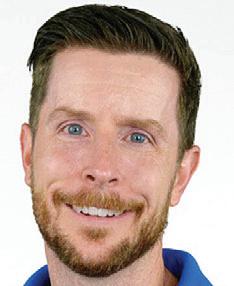
Both said they applied last minute when it looked like no one else would put their hat in. Lassman said the board encouraged him to formally run for the position in the November election after it selected Krause to fill the remainder of the term.
“Either of us was a solid choice,” Lassman said.
“Whether they picked me or her, I think Reardan won.”
“Either one of us would be great for the board,” Krause said unprompted in a separate interview. They each have a child in the same class.
The race will determine who will serve the remaining two years for school board director 5. Incumbents Simon Butterfield and Jennifer Cox are running unopposed for full four-year terms for directors 1 and 3.
Reardan-Edwall School District covers a rural area across western Spokane County and eastern Lincoln County. It serves about 740 students.
Krause is an art librarian at Eastern Washington University. She has expertise in regional history and was a special collections curator for the Northwest Museum of Arts and Culture. She serves on the Reardan Memorial Library Board – an appointed position – and has been involved with the public library on and off for the last 15 years.
Despite her job in higher education, however, Krause said she does not have training in public education, so she has had a lot to learn about funding and policy over the last few months.
MEET THE CANDIDATES
Reardan-Edwall School Board
Director 5
Rose Krause
Age: 45
Education: Earned graduate degrees in library science from the University of Washington and history from Eastern Washington University.
Work experience: Librarian and professor at Eastern Washington University. Previous curator for the Northwest Museum of Arts & Culture. Political experience: Appointed to school board in June. Serves on the Reardan Memorial Library board.
Family: Has one child attending Reardan-Edwall School District.
Age: 41
Mark Lassman
Education: Earned associate of arts degree from Spokane Fall Community College
Work experience: 15 years in crop insurance. Licensed in property and casualty insurance. Volunteers for children’s nonprofits and dresses up as Jack Sparrow at Sacred Heart Children’s Hospital.
Family: Has two children in ReardanEdwall School District
Krause and Lassman said they chose to run not because of a particular issue, but out of a desire to serve.
Nevertheless, Krause sees funding and keeping up with growth as ongoing challenges facing the district.
“Like most public schools, there is not enough funding from the state,” Krause said. “So, how do you keep things going?”
Reardan has grown quite a bit in recent years, and the facilities have not kept up, Krause said. The middle/high school needs renovating, and many classes are meeting in portables.
See REARDAN, 18
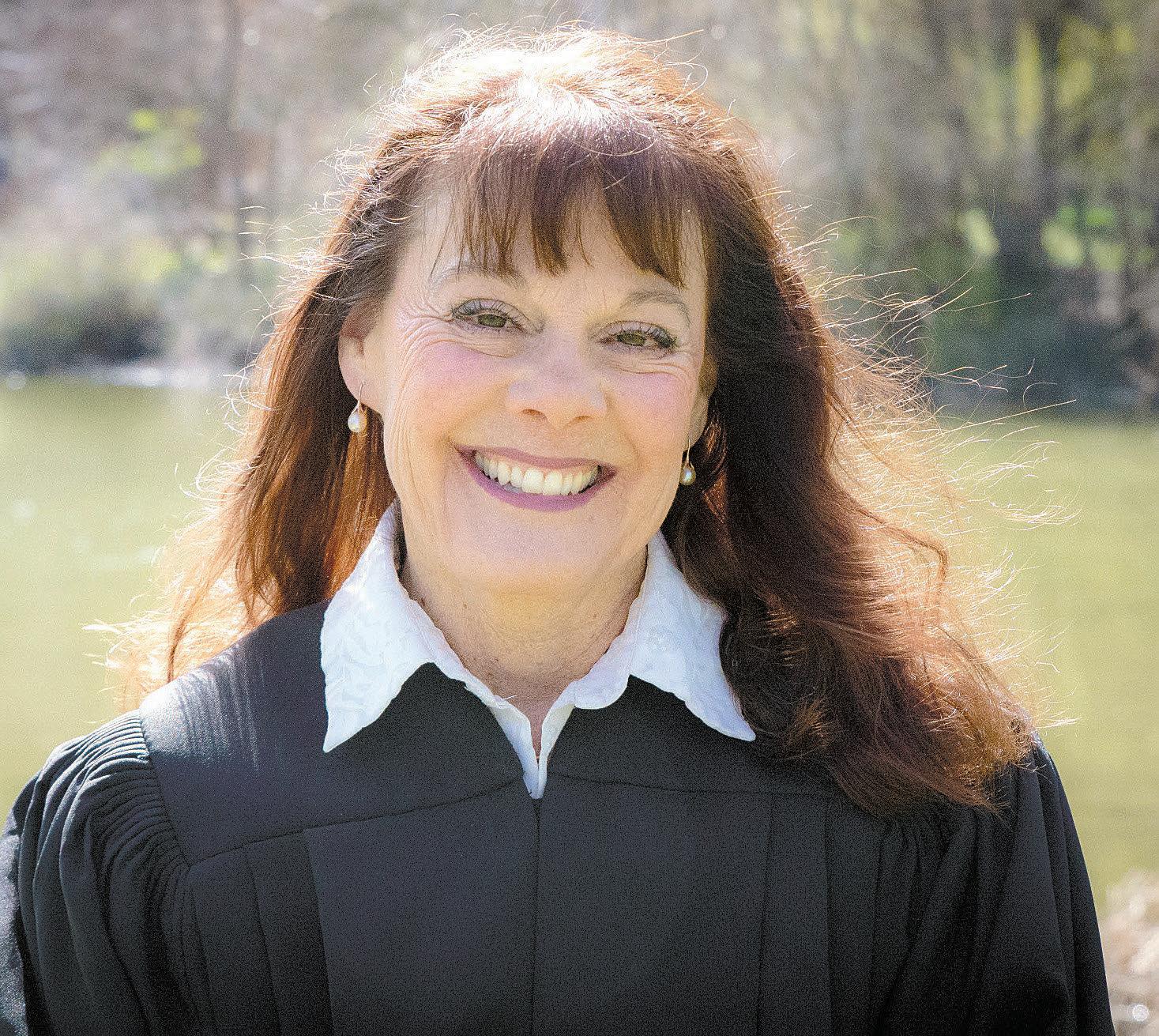

By Nina Culver FOR THE SPOKESMAN-REVIEW
There are two names on the ballot for fire commissioner in Spokane County Fire District 9, but one candidate said he had second thoughts about the position after it was too late to remove his name from the ballot.
Miguel Valencia said he has not been campaigning. “I decided I have too much on my plate at the
Continued from 15
materials, supplies and operating costs, funds commonly known as MSOC, as well as funding for special education.
“And while we didn’t get everything that we had hoped, we did see some improvement there,” Winer said.
Another common theme of the recent legislative session was parental rights, and discussions around which materials parents are entitled to receive and the time frame for how quickly districts must provide them. Winer said that “communication is key” to ensure a strong bond between parents and the district, and that the district should use a variety of channels to reach families.
“I think just being open and transparent about what we’re doing here in the district, and being able to be contacted and hear concerns, and listen to our families, and learn from them, and through trial and error, we will find the best way to communicate,” Winer said.
A teacher herself, Winer said her work allows her to experience the demands of meeting standards and help to improve student growth. Her work has given her the opportunity to provide feedback on state testing and attend conferences on how artificial intelligence will impact education in the future.
“I also know what our students are experiencing, and know the challenges of being a student right now,” Winer said. “I really want to make sure that Cheney is doing what it needs to do to ensure that students are feeling safe, feeling welcome and having a place where they connect and develop. Not only academically, but socially, emotionally and becoming productive citizens post-high school.”
Winer’s candidacy has been endorsed by the Cheney Education Association and the Public School Employees of Cheney, which represents teachers and classified staff in the district, respectively.
“I’m very proud of those endorsements because it means so much to have the support of the people who are working in our schools with our students,” Winer said.
A first-time candidate, Davis co-owns Wolffy’s Breakfast Burgers and Brew in Airway Heights with her husband, Dustin. Davis has also served as a volunteer firefighter for the City of Airway Heights for approximately a year and a half.
If elected, Davis said she’s focused on supporting parents and students in the district, “and being a good steward to our community.”
“And bringing the values that people bring to me to a higher level at the school board,” Davis said. “And being able to voice the community’s concerns.”
Davis said she began considering whether to
toss her hat in the ring after she was contacted by school resource officers in the district about the idea of running for the seat.
With five kids in the district, Davis said the decision ultimately came down to a feeling she would be “doing a disservice to them if I didn’t put myself in the race.”
If elected, Davis said she wants to expand offerings for high-achieving students in the district, something she struggled to find for her son. Coming from the Mead School District, which Davis said “has a lot of programs for advancement,” she struggled to find a place that fit his abilities, particularly in math.
“I got a lot of weird answers, that the school district doesn’t advance kids that far, and my question was ‘why?’ ” Davis said. “Why are we not taking these kids who are capable and ready and giving them the resources to be able to excel and push their education a little bit further?”
Davis’ goal, she said, is “elevating these students and giving them the opportunities to grow” in their coursework. To do so, Davis said the district could float students in the elementary school to different classrooms for portions of the day, something she said has worked in other school districts her children attended.
A larger challenge comes in at the middle school level, where students might be ready for a high-school-level course, but there might not be a teacher on campus who teaches it. The district accommodated Davis by transporting her son to the high school for a class, and then returning him to the middle school for the remainder of the day.
“It wasn’t necessarily moving him free into that world of high school before he was ready, but giving him access to a teacher in person, which I think makes a world of difference versus doing an online program,” Davis said.
Talking to other parents in the district, Davis said she has also frequently heard concerns over transparency from the district and “being able to feel heard.” Davis said she wants the district to take a more proactive approach when discussing changes to the school curriculum and new rules around disclosure requirements as they come from the state Capitol.
“I’ve seen in policies and curriculum, when those things are coming through, the parents are finding out about them once they’re already in place. It doesn’t get to be a conversation, or for parents to show up to a school board meeting to discuss before those things are already in place and enacted,” Davis said. Davis is endorsed by the Spokane County GOP.
Mitchell Roland can be reached at mitchellr@ spokesman.com.
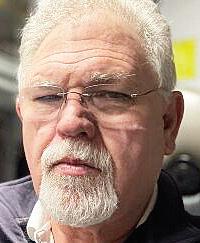
moment and believe my opponent has done a decent job as fire commissioner and will continue to do so,” he said via text.
Incumbent fire commissioner Jim Bennett, who has held his seat since 2014, did not respond to multiple requests for an interview.
According to his biography on the District 9 website, Bennett has worked as a paramedic with AMR since 1992. According to his profile in the Spokane County Official Voters’ Guide, he was previously a volunteer with Deer Park Ambulance and Steven’s County Fire District 1. He served as a fire commissioner with Stevens County Fire District 1 from 1999 to 2005.
Bennett submitted a statement to the Voter’s
Pamphlet which reads: “Our community is the center of urban and rural interface for wildfire risk and our district performs an outstanding job protecting this community. I bring a fundamental understanding and a great sense of fiduciary responsibility to make this mission one every day.
“I would appreciate your vote and the confidence you bestow in continuing for the next six years.”
Continued from 14
work-ready, he suggested partnering with local employers to give students more hands-on experience and warm them up to soft skills like coming to work on time.
Neither candidate supports transgender girls playing on girls sports teams, citing fairness for cisgender female athletes.
Arthur has been a repeated presence at board meetings when the topic is discussed, sharing safety concerns should his daughter play a school sport one day.
Where the candidates differ is their stances on the board’s actions on the topic. Central Valley has held several meetings, writing a complaint to the feds expressing its confusion in conflicting directives from the state and federal government. The board also approved joining a potential lawsuit against the state Office of the Superintendent of Public Instruction surrounding its policies on transgender athletes.
Arthur said he was supportive of each of the board’s actions thus far.
“It just took them maybe a little longer than I would have liked,” he said.
Skidmore said he supported the letter the board sent expressing their double-bind, but joining the lawsuit took it a step too far.
“It’s going to sort itself out somehow in the national politics thing, and I think we don’t really need to spend our money joining a lawsuit against OSPI,” he said.
For her replacement, Landa endorsed Skidmore, who was her daughter’s doctor. She said he is the more moderate of the two candidates.
“I consider myself a centrist, a moderate, and that’s what I’m hoping for with the new board member,” Landa said.
Stephanie Jerdon, current board president, endorsed Arthur after meeting with him and recognizing him from his remarks at meetings.
“I appreciate that he has been following the work of our board for some time, supports the efforts we have made, and has already demonstrated that he is willing to share concerns, ask questions, and get involved,” she wrote in an email.
Pam Orebaugh also endorsed Arthur. Board members Cindy McMullen and Barker did not respond to requests for comment in time for publication.
Arthur has the endorsement of the Spokane County Republican Party, while the Republicans of Spokane County endorsed Skidmore.
Continued from 16
plastered across many of their faces, some even reporting feeling lightheaded.
Stephanie Elie-Martin, a professor and evening business program director at Whitworth, is part of the facility advisory committee. That group toured different sites across the district and considered what projects were most necessary. Elie-Martin also has a senior at Riverside High School.
“It was really, really hot in there,” Elie-Martin said, explaining what her son told her. “I know teachers had fans. I know some had buckets of ice, doing everything they can. But I think it kind of hurts the kids’ hearts. Like, ‘Why can’t we have air conditioning?’”
Elie-Martin said one of the running jokes among her son and his friends revolves around layering up to go to class during the winter. Some classrooms are “T-shirt weather,” while other classrooms are so cold that students need to bring a heavy coat.
“They shouldn’t have to wear three layers of clothing in one classroom and then take off all three layers down to one layer in another classroom in the same building,” Russell said. “It’s not the way it should go. No, they should be learning. They should be able to learn at a high level, and part of that is having a safe and healthy learning environment.”
Elie-Martin stressed that she doesn’t like to pay taxes any more than the next person, but said it’s short-sighted to not want to support the school district. She toured various facilities within the district and learned from a couple of employees who work in maintenance just how complicated repairing certain elements of the outdated HVAC system can be.
The HVAC system has been a districtwide problem, Russell said, since before he first came to the district 10 years ago. If the levy passed, Russell said they would install a modernized HVAC system that should last for another 30 years.
While the vast majority of the money generated from the levy would be dedicated to revamping the HVAC system, about
$1.25 million would go toward updating security and safety, such as cameras, automated doors and emergency communication systems, along with upgrades to the district’s technology infrastructure.
Through town halls, focus groups like the facility advisory committee, Russell is hopeful that this new, community-developed capital levy will be much more attractive to voters.
John Paul, who wrote the opposing view on the levy in the county voting guide, stressed that the levy would increase taxes. He pointed to other tax hikes enacted by the Legislature and other governments.
“Increasing state property taxes, increasing local school levies, fire district levies, increasing property values … these all combine to impact your semi-annual property tax bill and the viability to continue owning your home,” he wrote. “In a couple of years from now, the board will ask you to vote for another replacement levy. The district has also stated in their newsletters that the need for future local funding requests will be needed.”
Eric Rux is another community member who serves on the facility advisory committee. He worked as the information technology director for the school district for eight years, before leaving to work at a private IT consulting company. All three of his sons graduated from Riverside in 2014, 2016 and 2019, respectively.
He described the job of the facility action committee as finding “a way to fit a 10-pound gorilla into a 1-pound box.” Ultimately, Rux believes that members of the community worked well with the district to identify the key aspects, like the HVAC and security systems, that desperately need attention.
Rux, who graduated high school with 26 others in the small town of Wilbur, loves Riverside for its small-town feel. He supports the levy for a simple and resounding reason.
“Because someone did it for me,” Rux said. “If someone did it for me, it’s my obligation then to do it for the next generation.”
Mathew Callaghan can be reached at (509) 459-5437 or by email at mathewc@ spokesman.com.
“That is not a conducive environment to learning,” Krause said. Lassman is a precision agriculture specialist for a crop insurance company, where he helps growers and agents use data to make operations more efficient. He grew up in Yakima and settled in Reardan, where his wife is from.
“I married the farmer’s daughter,” he said. Lassman has an alias to boot. He’s known to many children as Captain Jack
Sparrow of “Pirates of the Caribbean.”
Some years ago, his daughter had various medical problems that brought her to the hospital, where she was cheered up by a visiting band that played Disney songs. Lassman liked the character Jack Sparrow, so he grew a beard and put an outfit together. He works with nonprofits around Spokane and often appears in character at Sacred Heart Children’s Hospital.
“It’s a friendly thing; I wouldn’t even call it a competition,” Lassman said. “Both of us have the kids’ best interest at heart, and we both stepped up to make sure that the need in the community was met.”
“It’s a hard time,” Lassman said. “If I can make a kid smile, I can let their parents see there is more to the hospital than just tubes and needles, and that their kid can have wonder and magic despite everything that they’re going through.” He said he can bring a different perspective to the board, and can help people with opposing views find common ground. Like Krause, he isn’t running on a particular issue, but just wants to help the students of the district.
But with new job, he will step aside if elected
By Cannon Barnett FOR THE SPOKESMAN-REVIEW
Two commissioner candidates will be on the Nov. 4 ballot for Spokane County Fire District 5 on the north plains, but only one has plans to accept the position if elected.
Tom Williams was named the next fire chief for the city of Spokane on August 25. He said that he is dropping out of the commissioner race because he “won’t be able to commit the time that he thought” due to personal circumstances.
The other would-be commissioner, Brian Scott, remains in the game.
“I welcome the competition. It’s always good when the voters get a
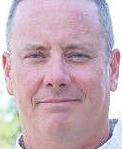
choice,” Scott said.
“My understanding was he was a longterm firefighter, so I’m sure he was qualified for the role, and it’s unfortunate that he has to withdraw. But if that is the case – that he’s moving on to a bigger and better job – I certainly understand his reasons.”
The district covers around 90 square miles, and around 2,000 people live within its boundaries, according to the District 5 website. The force consists of three commissioners, a paid administrator and about 25 volunteer firefighters.
Scott has lived in the area for around 13 years, and his parents have been on the prairie for 50. When visiting from his hometown of Salem, Oregon, as a child, he said that
the region “always felt like home.”
When his uncle, a retired fire chief in the district, told him there was a commissioner position up for grabs, Scott thought he might be able to help out.
“I’m not looking to use it as a stepping stone for anything further,” he said. “I just wanted to see somebody who would be a good steward of the taxpayers’ dollars in that role, and I think I could be a help there.”
While he believes that the fire district does a “very good job with their core functions,” Scott said if elected he would focus on an effective use of tax dollars and preventing fires by clearing brush.
“From what I’ve seen, the fire district does a very good job with their core functions. They respond well to calls, they do what they’re supposed to do,” he said. “I’d like to see a little more emphasis on
By Cannon Barnett THE SPOKESMAN-REVIEW
Two candidates will be listed on ballots for Position 1 in Fire District 10, spanning north from Fairchild Air Force Base to just after Coulee Creek and from North Wood Road to the Spokane River. Only one, however, is really vying for the spot.

Gordon Hester is the incumbent commissioner for the district, running for his first re-election. The president of regional real estate company Kiemle Hagood by trade, Hester volunteered as a firefighter in District 10 from 2010 to 2020 and served as captain of station 10-3 for the latter five of those. During his volunteer time, Hester also served the district as an emergency medical technician.
“I served as a volunteer fireman in the district for 10 years and it really –when you get to go out on the calls, the medical calls and the fire calls, you really get to meet the people in the district. It’s just an incredibly gratifying job,” Hester said. “As I got older, it made it a lot less easy to go out and work as an actual firefighter. So I was able to run for the fire commissioner and still serve the fire department.”
It was a brushfire between Hester’s and his neighbor’s property that piqued his interest in volunteering 15 years ago, as he and his neighbor went out, armed with garden hoses, to help the firefighters stop the spread. The pair didn’t know you could volunteer with the department until a volunteer at the scene tipped them off, and they joined the force the following summer. His neighbor, Rob Sayers, later went full time and now serves as the district’s daytime captain.
Kristi Ross is Hester’s challenger in the Nov. 4 election, and describes herself as a “quiet type of person.” She applied to run for the position after receiving a call from a local Democratic group about an opening in the district.
With no political experience, Ross calls herself a “lady-next-door kind of
Spokane County Fire District 10 Commission Position 1
Gordon Hester
Age: 59
Education: Graduated from Kettle Falls High School.
Earned a bachelor’s degree in finance and business administration from Eastern Washington University.
Work experience: President and CEO of Kiemle Hagood, a commercial real estate company with branches in Spokane, Coeur d’Alene, Kennewick and Missoula.
Employed there for 35 years.
Political experience: Elected as Spokane County Fire District 10 commissioner in 2020.
Family: Married to Brenda Hester. Has two children.
Funding: Reported no contributions as of Oct. 1, according to the Washington Public Disclosure Commission.
Kristi Ross
Age: 62
Education: Graduated from Lewis and Clark High School.
Earned a bachelor’s in business with a human resources focus from Spokane Community College and Eastern Washington University.
Work experience: Served 10 years in the Air Force and 11 years in the National Guard.
Political experience: First run for office.
Family: Married to Rex Ross. Has two adult children.
Campaign fundraising: None. Candidate declined to provide her photo.
passed.
“I shouldn’t say this, but it wouldn’t bother me if he won. I’m almost rootin’ for him,” she said, adding that if she were elected for the position she would “do the best I can.”
Hester said that his experience with the fire district “probably makes me a significantly better candidate” than Ross.
During his last five years as district commissioner, Hester said his two main goals were to increase permanent firefighting staff numbers and stabilize the budget.
candidate.” After 10 years in the Air Force and 11 with the National Guard, she became a stay-at-home mom and hobby gardener.
Ross said that if elected she would be an advocate for firefighters in the community and cleaning up dry brush along the sides of the roads that could be a fire hazard.
No one filed for the office during the candidate filing week in May. Hester and Ross filed to run in August when a second filing period opened for offices that had no candidates. She was unaware an incumbent was in the race and later called to see if she could drop out, though the deadline had already
that I bring to the board.” He also advocated for deeper partnerships with local business and industry to increase worksite learning, something he saw benefited students and businesses while a teacher at Spokane Valley Tech.
Endorsements
Since Hester took office in 2020, the district has hired on 10 new firefighters, three deputy chiefs and a mechanic. In terms of stabilizing the budget, Hester has worked on renewing an emergency medical services levy and implementing a fire levy lid lift, along with contracting with the Kalispell Tribe to provide service to the casino area.
“I think it has been helping our district be more successful and a lot safer for our taxpayers,” he said.
While the district is financially in good shape right now, Hester said that looking into how the department will manage a need for expensive equipment like firetrucks will be important going forward.
Specifying that she was acting in her personal capacity, outgoing board member Tere Landa endorsed Bitz, calling him “Mark the moderate,” who would bring a critical perspective as a retired educator. Reached by email, board President Stephanie Jerdon endorsed Orebaugh as a “conservative Christian” who will uphold the law and is invest-
fire prevention. Getting rid of fuels in, you know, it’s an almost entirely rural district. There’s lots of property that’s either used for farming or it’s not used for anything in particular; it’s semi-forested.”
The election will be on Nov. 4, and despite Williams being listed on the ballot, Scott is the only one
MEET THE CANDIDATES
Spokane County Fire District Commissioner Position 1
Brian Scott
Age: 51
Education: Graduated from North Salem High School in Salem, Oregon. Earned a bachelor’s in mechanical engineering from Oregon State University.
Work experience: Served in the United States Marine Corps as an anti-tank assaultman for six years. Worked a collective 23 years with different industrial facilities, currently owns Landt Project Management.
Political experience: First run for office.
Family: Married to Shawna Scott. Has 3 children. Campaign finance: None.
Tom Williams
Williams, the assistant Spokane fire chief, recently was named the next Spokane fire chief. He said as a result that he would not accept the District 5 commissioner job if elected.
of the two who would accept the position if elected.
“If I’m going to put it very briefly, I’m just going to say I’ll be a good steward of their tax dollars,”
Continued from 16
classrooms.
Both candidates say they believe learning is hard when it’s hot. Ramsden added her biggest focus moving forward is to make the buildings in the district conducive to being a learning environment. Even if the levy doesn’t pass, Ramsden said, she will pour her heart into determining innovative means of ensuring students in the district get to learn in a safe, healthy and comfortable environment. Vanderholm said he’s familiar with the challenge of garnering support for such a levy.
“It’s very hard to get(voters) to approve bonds and levies,” Vanderholm said. “A lot of them say the state funds it all, so why should we have to pay for a levy or a bond? The state claims they pay for all the education for every child. Well, having been on the school board, I found out that’s the biggest crock of baloney that’s ever been said.” Ramsden said she would like to improve communication channels between the district and students’ parents. If community members and stakeholders better understood the state of many of the buildings in the district, she said, people would be more inclined to vote for levies like the one on the ballot in November. Ramsden would like to see the district make more of an effort to disperse information through social media so as to better connect with younger parents in the district. She also would like the district to review its curriculum to make sure the schools are teaching effective, up-to-date material that keeps Riverside competitive.
Vanderholm has eight children, 36 grandchildren and one great grandson. Many of his grandchildren go to school in the Riverside School District. He said part of his motivation to continue serving on the board stems from his desire to ensure his family has a decent environment and the best possible education they can get.
Ramsden’s two oldest children graduated from Riverside High School in 2017 and 2021 respectively. Her third oldest is currently a senior at Riverside, while completing the Running Start program at Spokane Community College. Her youngest child went to Riverside until middle school and then transferred to the Mead School District to be closer to her mother once she got a job as a speech-language pathologist.
Before coming to Mt. Spokane High School, Ramsden was a speech language pathologist in the Riverside School District for about seven years starting in 2013. She taught preschool, elementary and middle school as one of two speech language pathologists in the district.
The Mead School District has 23.
As a speech-language pathologist, much of Ramsden’s day is helping kids with articulation, language, voice and fluency issues. She said her perspective as an educator and a parent puts her in a position to easily communicate with parents in the district and gives her intrinsic motivation to be the best school board member.
“I have to be very willing to put my own agenda aside sometimes, and be flexible and hear everybody out and to hear all sides of whatever situation may be in front of me,” Ramsden said. “Com-
ed as a mom of a student.
Board members Anniece Barker and Cindy McMullen did not respond to requests for comment. Orebaugh’s campaign website lists Barker as an endorser. Bitz has the endorsement of the Republicans of Spokane County, and
Scott said. “I’ll make sure that their money is spent effectively on the best little firefighting – volunteer firefighting service – that we can have on this prairie.”
munication is really front and center of what I do.”
Ramsden describes her three priorities as ensuring a commitment to fiscal responsibility, promoting educational excellence and fostering community pride.
Vanderholm said his priorities include pushing for the expansion of educational classes for blue collar workers, while simultaneously increasing the number of college classes available. He said he would also love to see Riverside become a first choice for neurodivergent children and the special education community by increasing personnel, equipment, tools and educator training within the district.
A 1971 graduate from Riverside, Vanderholm when to Rick’s College in southern Idaho after returning from a mission in northern England. He was only there for a year before he met his wife, Thelma. They married in 1976 and returned to the Chattaroy area to raise their kids.
Vanderholm opened the Deer Park Feed and Seed store where he sold agricultural items to farmers in the area. He opened Newport Feed and Seed not long after and spent time working for other feed stores to tide his family over.
A little over 15 years ago, Vanderholm was forced to retire because of shoulder issues and a back injury that occurred when he fell off a ladder in his barn. Vanderholm said his tenure and experience on the school board, coupled with his rich family history in the area that stretches five generations, lends itself to folks in the community typically listening to what he has to say on district issues.
On many issues, Ramsden and Vanderholm share similar opinions. They both believe that, because there isn’t really a city or town in the Riverside School District, the schools often act as a community base. They both pledge to spend tax money transparently and wisely. Ramsden and Vanderholm said they do not approve of transgender athletes playing in girl’s sports. Ramsden said transgender athletes have a place, but they need their own way of navigating sports. Vanderholm said he would never ridicule or exclude anyone from anything, but he stressed he would go “berserk” if biological boys wanted to use the same locker room as his granddaughters.
Ramsden said if she were to be elected, she would have big shoes to fill. She praised Vanderholm’s commitment and love for the community. Her hope, if she’s elected, is to provide Riverside with the same “help-your-neighbor” mindset that she sees in all of her peers. She pointed to the Oregon Road fire in 2023 as evidence of the community showing up during a time of crisis.
“Riverside’s motto – rise as one – is more than just words,” Ramsden said. “To me, it represents the way our teachers, families and our community members can work together toward a common goal, ensuring that every student has the opportunity to succeed.”
For Vanderholm, if he’s re-elected, he hopes to continue to do what he’s been doing for the last 25 years.
“It’s people that make it great,” Vanderholm said. “We get the right people in place, and things go so smoothly, and even though you have your bumps along the way, they turn out more so to be mole hills rather than mountains.”
Orebaugh has the endorsement of the Spokane County Republican Party. According to her website, Orebaugh also has the endorsements of the state GOP, Moms for Liberty and the Public School Employees Union. According to his website, Bitz has the endorsements of the Central Valley Education Association union, some local trades unions and the state body of the Public School Employees Union. He is also endorsed by former school board members Keith Clark and Debra Long.
By Nick Gibson THE SPOKESMAN-REVIEW
Two Millwood City Council members are hoping to take the next step in their town’s hierarchy this November.
Patent agent Shaun Culler, a member of the council for 17 years, and Washington State University health researcher
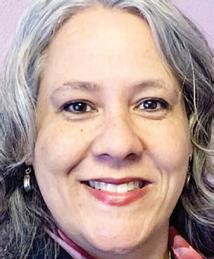
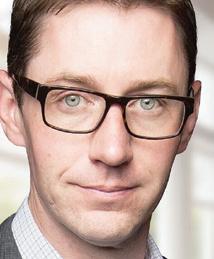
Shawna Beese, a two-term councilwoman, are vying to be the next mayor of Millwood. Incumbent Kevin Freeman has not filed for re-election after 12 years at the helm.
Millwood, which is hemmed in on three sides by the city of Spokane Valley and the Spokane River to the north, is one of the smallest municipalities in the county. The decision between the two candidates, who both have established roots in the small town, is in the hands of just 1,389 registered voters.
Culler, 45, is a third-generation resident of Millwood who joined Colby Nipper, a law firm specializing in patents, in 2009 after spending eight years as an electrical engineer and design lead at General Dynamics, formerly Itronix. He hopes to advance the economic health of the city, local businesses and residents while maintaining Millwood’s character.
There are a few factors that contributed to Culler’s decision to seek the top job, he said.
“Kevin is stepping down, we’re wrapping up the Argonne (road) project,” Culler said. “And I feel like we need to work on the city’s commercial districts, businesses.”
Beese, 51, spent 20 years in private health care before earning her doctorate in nursing from Washington State University in 2023. The lifelong resident of Millwood is now an assistant professor of rural health promotion for her alma mater in the College of Agricultural, Human, and Natural Resource Sciences. She said she was encouraged to run by several community members, mulled it over and decided it was an opportunity she could not pass up.
“These are my neighbors. This is my community,” Beese said. “Whether I was an elected official or not, I’m always going to be supremely interested in the reality of the people who are closest to me.”
Beese’s seat on the council also is up for election this year, and state law prohibits a candidate from appearing twice on the same ballot. That means Beese will not have the same opportunity to return to her council role that Culler does if she is unsuccessful.
The candidates said Millwood’s unique charm and character must be maintained, but they have different visions for the town’s path forward.
Millwood’s role as a water purveyor was addressed at length by both Beese and Culler in recent interviews.
Beese believes one of the more pressing issues on the horizon regionally, and by extension Millwood, is water security. She said local water districts are facing challenges in serving their customers, and she’d like to formulate a plan that ensures Millwood’s users are protected well into the future.
MEET THE CANDIDATES
Millwood mayor
Shawna Beese
Age: 51
Education: Graduated from West Valley High School in 1993. Holds multiple degrees, including an associate degree in nursing from Spokane Community Colleges, bachelor’s degree in nursing from Gonzaga University and Ph.D. in nursing from Washington State University. Work experience: Spent 20 years in private health care. Is now an associate research professor for Washington State University’s College of Agricultural, Human, and Natural Resource Sciences.
Political experience: Appointed to the Millwood City Council in 2017. Elected to the seat in 2017, and reelected in 2021.
Family: Married to Scott Grorud. Has one adult son.
Campaign fundraising: No reported fundraising as of Oct. 1, according to the Washington State Public Disclosure Commission.
Age: 45
By Nick Gibson THE SPOKESMAN-REVIEW
A new face will be joining the Millwood City Council following an incumbent’s decision to seek a higher office.
Age: 50
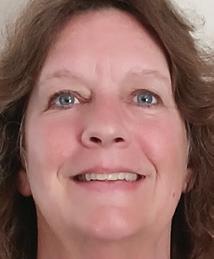
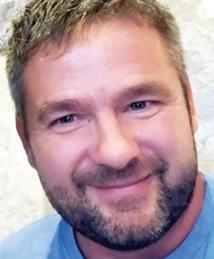
Shaun Culler
Education: Graduated from University High School in 1998. Holds a bachelor’s degree in electrical engineering and a master’s degree in business administration from Gonzaga University.
Work experience: Currently works as a senior patent agent with Colby Nipper PLLC, a firm he joined 16 years ago. Was formerly with General Dynamics/Itronix as an electrical engineer and design lead for eight years.
Political experience: Appointed to the Millwood City Council in 2007. Elected to the council in 2011, 2015, 2019 and 2023.
Family: Single. No children.
Campaign fundraising: No reported fundraising as of Oct. 1, according to the Washington PDC.
be the recent agreement between Airway Heights and Spokane to ensure West Plains residents have access to clean drinking water following the PFAS continuation stemming from Fairchild Air Force Base and Spokane International Airport. Beese expects more jurisdictions to look upstream to secure water from other districts as the region continues to grow.
“I would like us to do more than just the mandated planning and really rise this up as one of our top issues because it’s the one that impacts our citizens the most,” Beese said. “They go to their faucet, we’re the ones that have to provide the water. And they want good and clean and affordable water, and so that is going to require comprehensive strategic planning beyond what we’ve done before.”
Culler agrees that thoughtful planning regarding Millwood as a water purveyor is needed. He does not expect increased demand pressures within city limits because of the lack of available space to develop within its borders, but there are other water districts in need. He would like to develop agreements to wholesale some water while maintaining the rights in order to help keep costs low for customers and defray the costs of upcoming repairs.
Much of Millwood’s system is through cast -iron pipes that are aging out and will need to be replaced, Culler said. Wholesaling water to a neighboring jurisdiction could help fund that infrastructure work, he said.
“If we don’t wholesale water to other districts, it’s going to get more expensive on us,” Culler said. “We’re facing millions of dollars in infrastructure costs.”
Culler said his focus, if elected, would be on addressing inflation, taxes and utility fees for Millwood residents. He’s interested in loosening the town’s requirements for things like parking and interior square footage to encourage more mixeduse development to help keep those costs low by growing the user and tax bases.
wood stay competitive locally, he said.
“The city of Spokane, they don’t have any parking restrictions anymore,” Culler said. “So if you’re a developer looking to fund a development of a building, if you get 20% more leasable space, where are you gonna go?”
Culler said he supports establishing a public development authority for the town’s main commercial stretch, as well as shared parking lots for the businesses there. The leftturn lanes being added to Argonne Road through that stretch should make it easier to access those businesses, he added.
Beese sees a need for stability and transparency within Millwood’s government. She said there has been some staff turnover that she would like to get to the root of, and that town residents feel there is a lack of communication from city leaders. She said the Argonne project is a good example; some Millwood business owners felt the city failed to engage with them as it moved through City Hall.
Increasing public involvement in Millwood’s government is something she’s championed as a councilwoman, she said, pointing to her support of procedural changes for the council that implemented a two-touch rule. Now, when the council is briefed publicly about a matter, they do not vote on it until a later meeting to allow time for more public feedback.
“Sometimes even six sets of eyes, you know, the mayor and the five city council members, is insufficient,” Beese said. “... Citizens have brought forward some very substantive things that we didn’t pick up on.”
Culler agrees that a healthy Millwood City Hall starts with an engaged public. Millwood City Council only meets once a month, and he would like to ensure council meeting agendas are posted with more advance notice, and in more dynamic ways, to encourage as much public involvement as possible.
“If we just started posting stuff throughout the month, maybe more people chime in on it,” Culler said.
Longtime Millwood City Councilwoman Shawna Beese has thrown her hat in the ring to be the next mayor of the small town, rather than seeking another term on the council. State law precludes a candidate from appearing twice on the same ballot.
Stepping up for the opportunity to take over Beese’s role are paralegal Tina Seifert and Gareth Kahl, who co-founded the electrical contracting company Dorsh & Kahl Co. in Spokane Valley.
Kahl did not return multiple requests for comments in the months ahead of this article’s publication.
Millwood is a small municipality, hemmed in on three sides by the city of Spokane Valley and the Spokane River to the north, with only 1,389 voters.
Seifert, 57, said her interest in serving in public office was spurred by a 20-unit manufactured home development in Millwood proposed last year that faced notable opposition from a group of Millwood residents.
While the development never came to be, Seifert said the proposal, approval and appeal process illustrated a lack of transparency into the decisions at City Hall. Many of her neighbors she organized with to advocate against the development encouraged her to run, she said.
“I care about the city of Millwood, and I want to make sure that this city stays much as it is now, for forever, even with the big growth around us,” Seifert said.
Seifert is a lifelong resident of the region, graduating from Central Valley High School in 1986 before going on to attend Spokane Community College and a certificate program through Eastern Washington University to become a paralegal. She’s worked in the legal field for more than two decades, predominantly with Maxey Law Office in Spokane.
Seifert believes her legal experience will be an asset to the council when reviewing contracts, agreements with other municipalities and operations within City Hall.
“I love to research,” Seifert said. “And just helping the community.”
In his statement provided to the Spokane County Elec-
Continued from 5
ate a judgment and sentence form, which led to a warrant being issued on a closed case, he said.
But broadly, Ochoa-Bruck noted the public defender’s office had begun to remove her from all cases before ever meeting with her to discuss concerns. She also later argued their concerns seemed to shift and were otherwise overblown.
There were other specific concerns raised at the time, including how she handled no-contact orders, such as those involving domestic violence.
This has become one of Freedman’s campaign pillars.
Millwood City Council Position 1
Gareth Kahl
Education: Raised in Kalispell, Montana, holds an associate degree from LTT Tech, according to county voter guide. Licensed journeyman.
Work experience: Tradesman, co-founder of Dorsch & Kahl, an electrical contracting business.
Political experience: Not provided, appears to be first bid for public office.
Family: Marital status not provided. Father of three, according to county voters guide.
Campaign finance: Reported no campaign contributions as of Oct. 1, according to the Washington Public Disclosure Commission.
Tina Seifert
Age: 57
Education: Graduated from Central Valley High School in 1986. Holds an associate degree from Spokane Community College and a paralegal certificate from Eastern Washington University.
Work experience: Paralegal, mostly retired. Career has been largely with Maxey Law Office. Executive Director of the National Motorcycle Riders Memorial Association, which was co-founded by her husband.
Political experience: First run for office.
Family: Married to Steve Seifert and has one adult daughter and one adult stepson.
Campaign finance: Reported no campaign contributions as of Oct. 1, according to the PDC.
tions Office for the official voter’s guide, Kahl said he’s proud to call the small town home.
“Millwood has given so much to my family, and now it’s my turn to give back,” Kahl wrote.
Kahl goes on to identify himself as “a father of three, outdoors enthusiast, and someone who values community, opportunity, and safety.”
“As a tradesman and small business owner, I know the importance of hard work and practical solutions,” Kahl said. “I’m running for office to bring those values to local government, supporting working families, strengthening small businesses, and keeping Millwood a place we’re all proud to call home.”
The manufactured home development’s approval, although it was later appealed, is not the only council decision deserving scrutiny, Seifert said. She does not support the ongoing reconstruction of Argonne Road to the tune of $4.2 million.
The road project is one of the largest in the town’s recent history and has the stated goals of improving safety, traffic flow and multimodal use through the nearly 100-year-old town. The work includes the addition of left turn lanes onto Dalton, Frederick and Liberty avenues; installation of upgraded railroad crossing equipment just before the intersection with Euclid Avenue; and the creation of a bicycle and pedestrian pathway from the Spokane River Bridge to the Millwood Interurban Trail.
Seifert does not see a need for additional turn lanes in the town’s core. She said traffic will always populate
website. “By not respecting the wishes of the victims in criminal cases, we are decreasing their safety and not allowing them a voice in the process. We are not making them safer; we are simply clogging the system unnecessarily.”
the street because of the train tracks that cross Argonne – part of a busy line for Union Pacific engines, and the construction has had too great of an impact on nearby businesses.
“Instead of putting millions of dollars into digging up, widening, repaving, why don’t you just purchase a new signal with a turn light?” Seifert said.
Seifert added that the city could have done more to get information on the upcoming project to the public and to solicit feedback. It is another example where she believes transparency and communication could be improved to encourage more civic engagement among Millwood residents.
“Even if it’s a flyer or a mailer, posters going up,” Seifert said. “Just something. There are options out there.”
As the region continues to grow and grapple with challenges like the opioid epidemic, housing and public safety, Seifert said Millwood needs to have a seat at the table to advocate for its interests regionally, statewide and at the federal level.
“To make sure Millwood is taken care of everywhere,” Seifert said. “Our priority is our small town, our citizens, our community, our businesses.”
Millwood is a unique town. Its history and character need to be preserved even as more changes come to the region it’s existed in for more than 100 years, she said. Seifert said she would look forward to the opportunity to give back to the place she’s called home for years.
“I’m a caring person,” Seifert said. “Love thy neighbor, right?”
she has served the people who have passed through her courtroom well, and discounts Freedman’s campaign as personally motivated and lacking much of a platform.
One example would
With its borders less than a mile from each other, Culler said Millwood needs to be efficient with development. The changes would also help Mill-
Nick Gibson can be reached at (509) 459-5039 or by email at nickg@ spokesman.com.
“We plan on respecting the self-advocacy of domestic violence victims who ask the court for criminal protection orders to be modified or terminated,” Freedman states on her
Ochoa-Bruck argues domestic violence cases can be incredibly tricky to navigate and that the consequences for a misstep can be fatal. She pointed to the case of Fatimah Alghazwi, who had asked Ochoa-Bruck to terminate a no-contact order against her ex, Jean P. Kirkpatrick, which Ochoa-Bruck declined. That no-contact order was later lifted by another judge, and within weeks, Alghazwi was killed. “And these are not isolated incidences, unfortunately, with domestic violence,” Ochoa-Bruck said. “These cases can be a tinderbox, and I am very, very thoughtful to only recall no-contact orders when it is appropriate.”
Ochoa-Bruck believes
Ochoa-Bruck has a wall of endorsements from judges at nearly every level of the legal system in Washington state, including seven Spokane County Superior Court judges, five Spokane District Court judges, a state Supreme Court justice. She is also endorsed by the Spokane Regional Labor Council and the Northeast Washington – North Idaho Building and Construction Trades union.
Freedman is endorsed by dozens of local attorneys, the local branch of the International Association of Machinists and Aerospace Workers, and both the Spokane County Democrats and the 6th Legislative District Democrats. Judicial positions are elected, but nonpartisan.